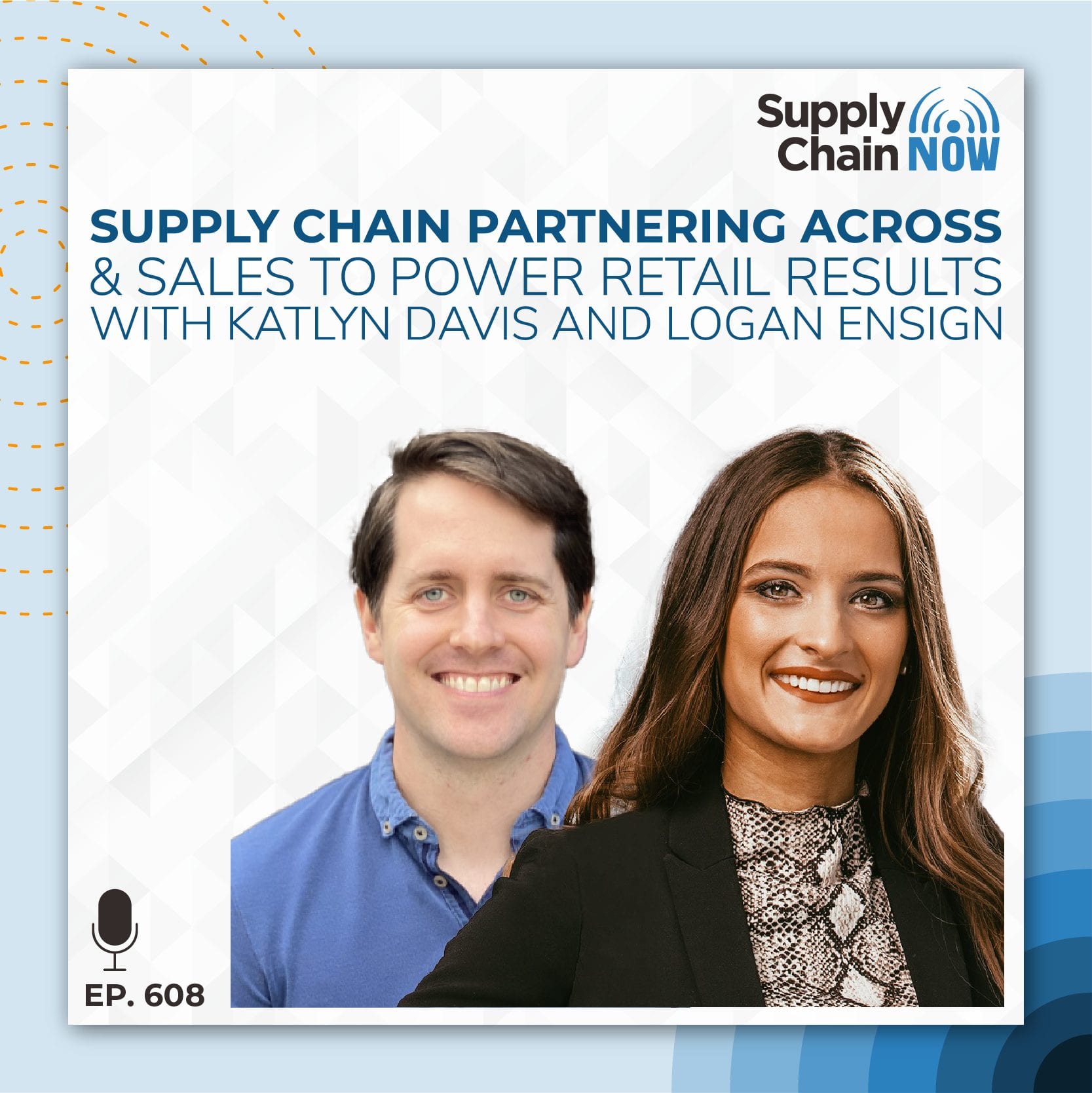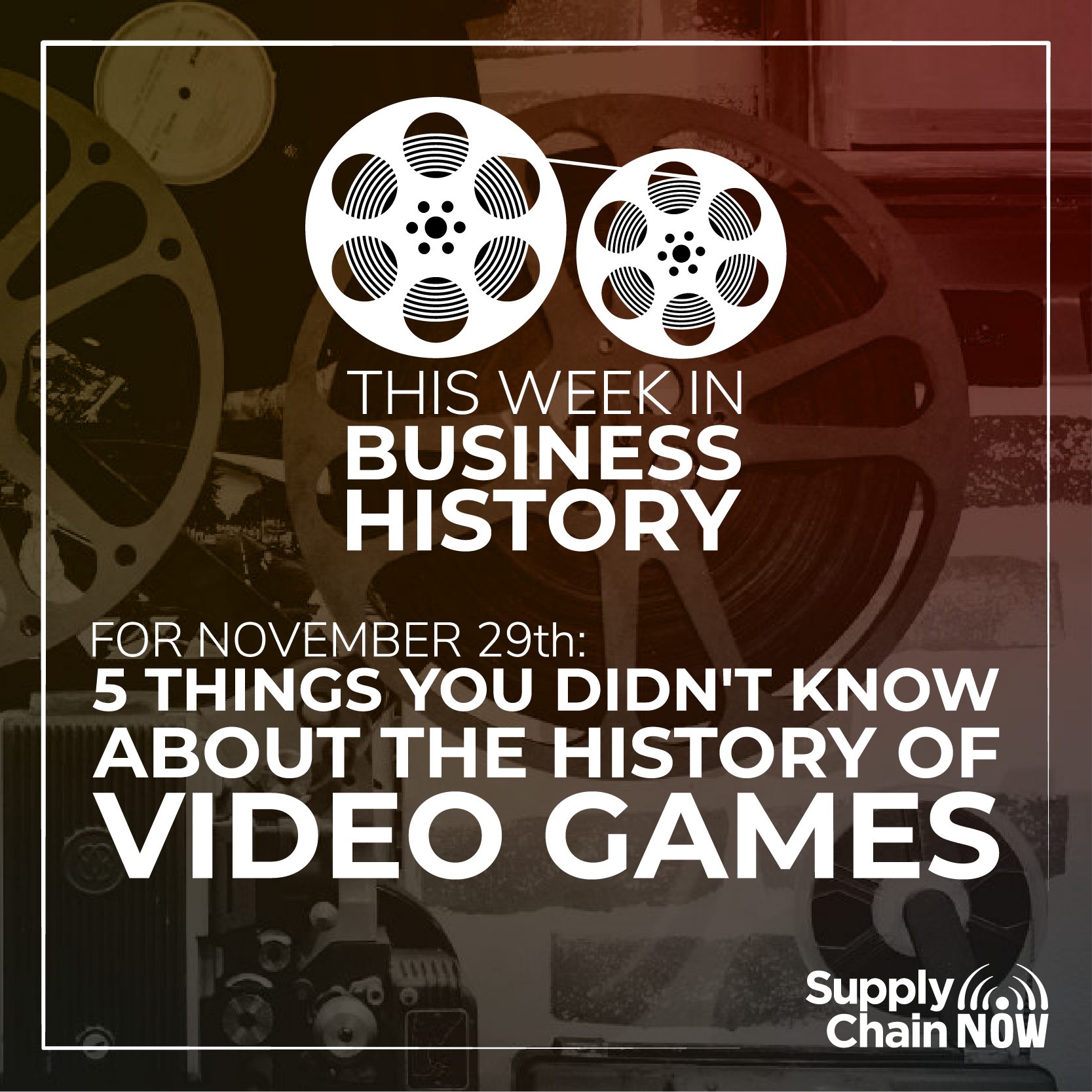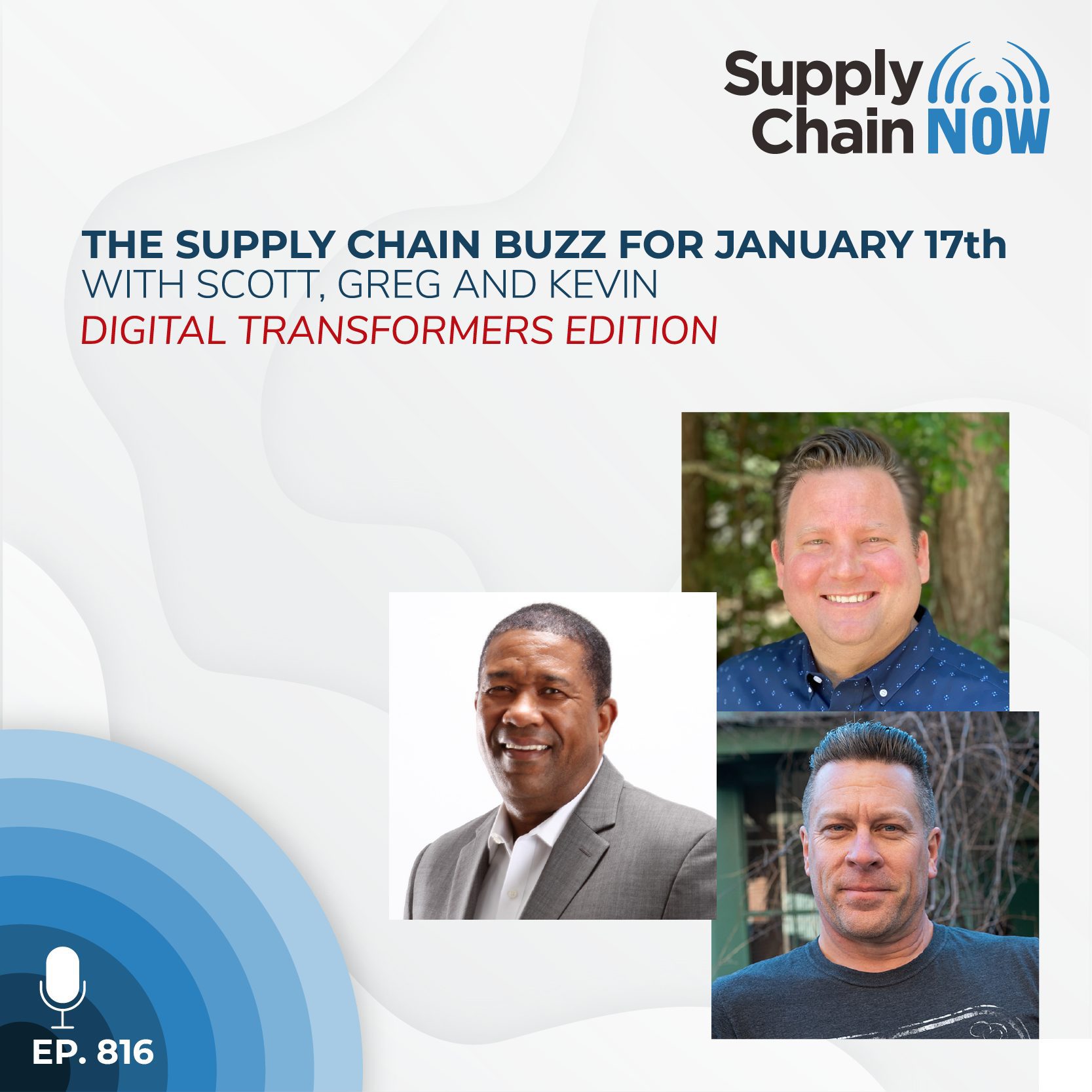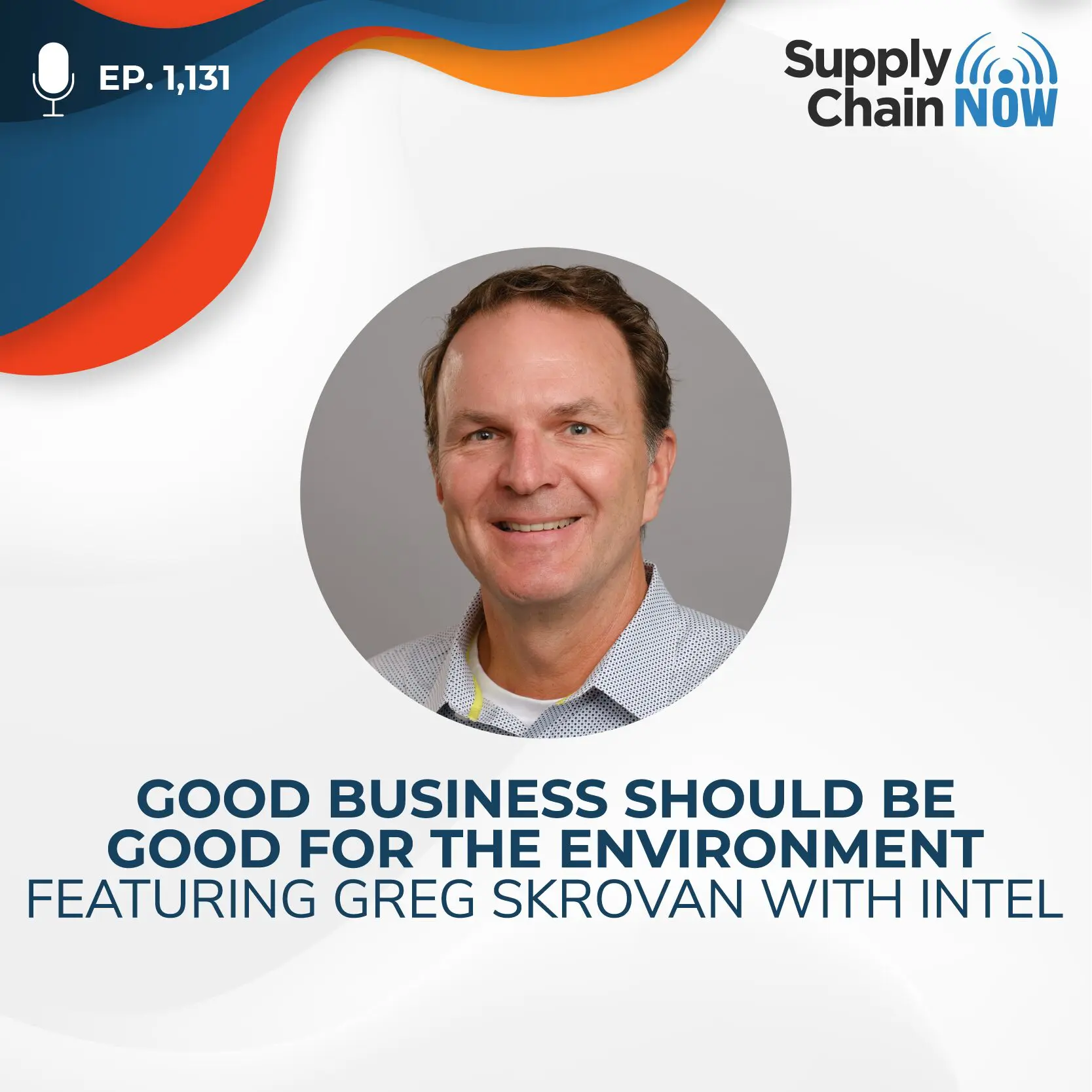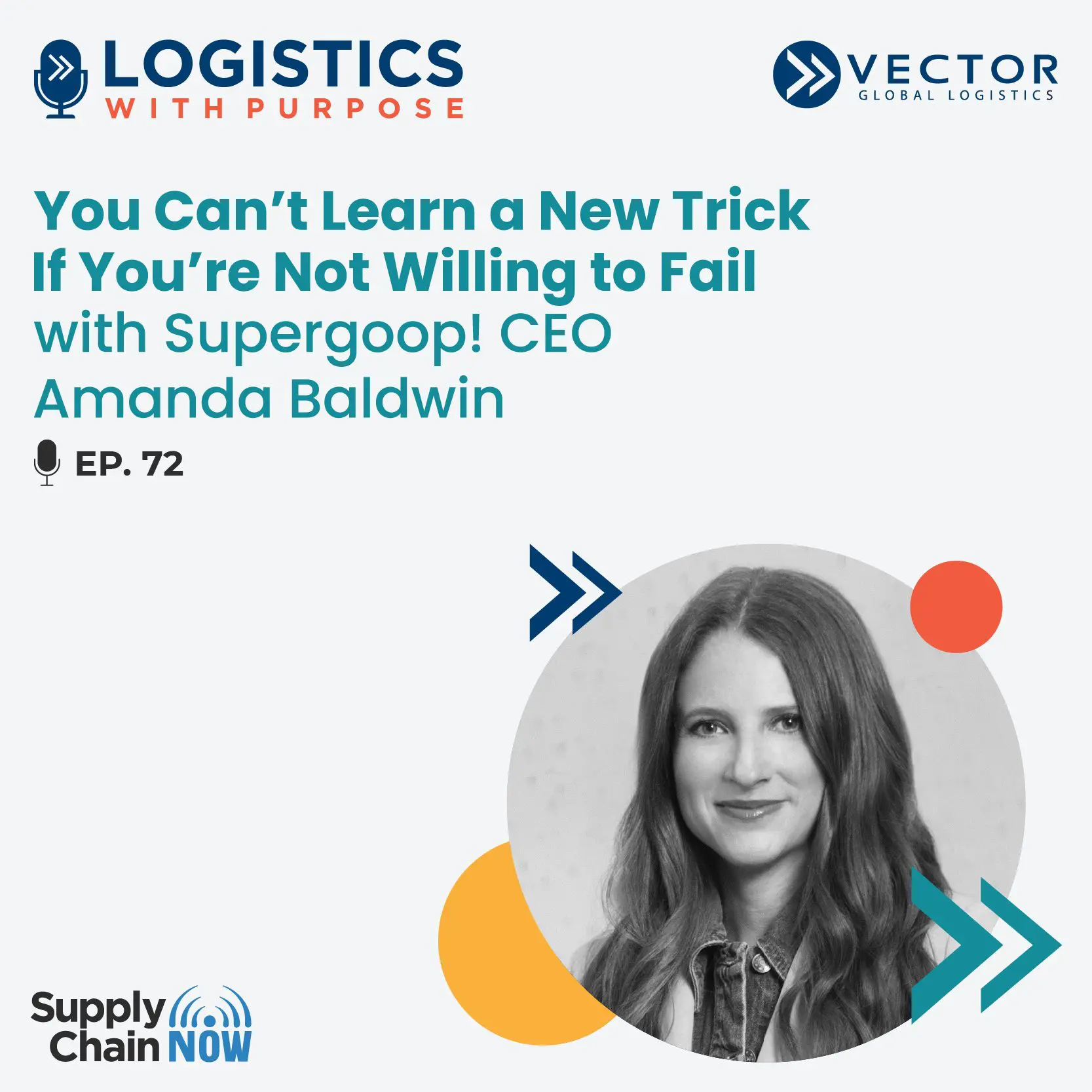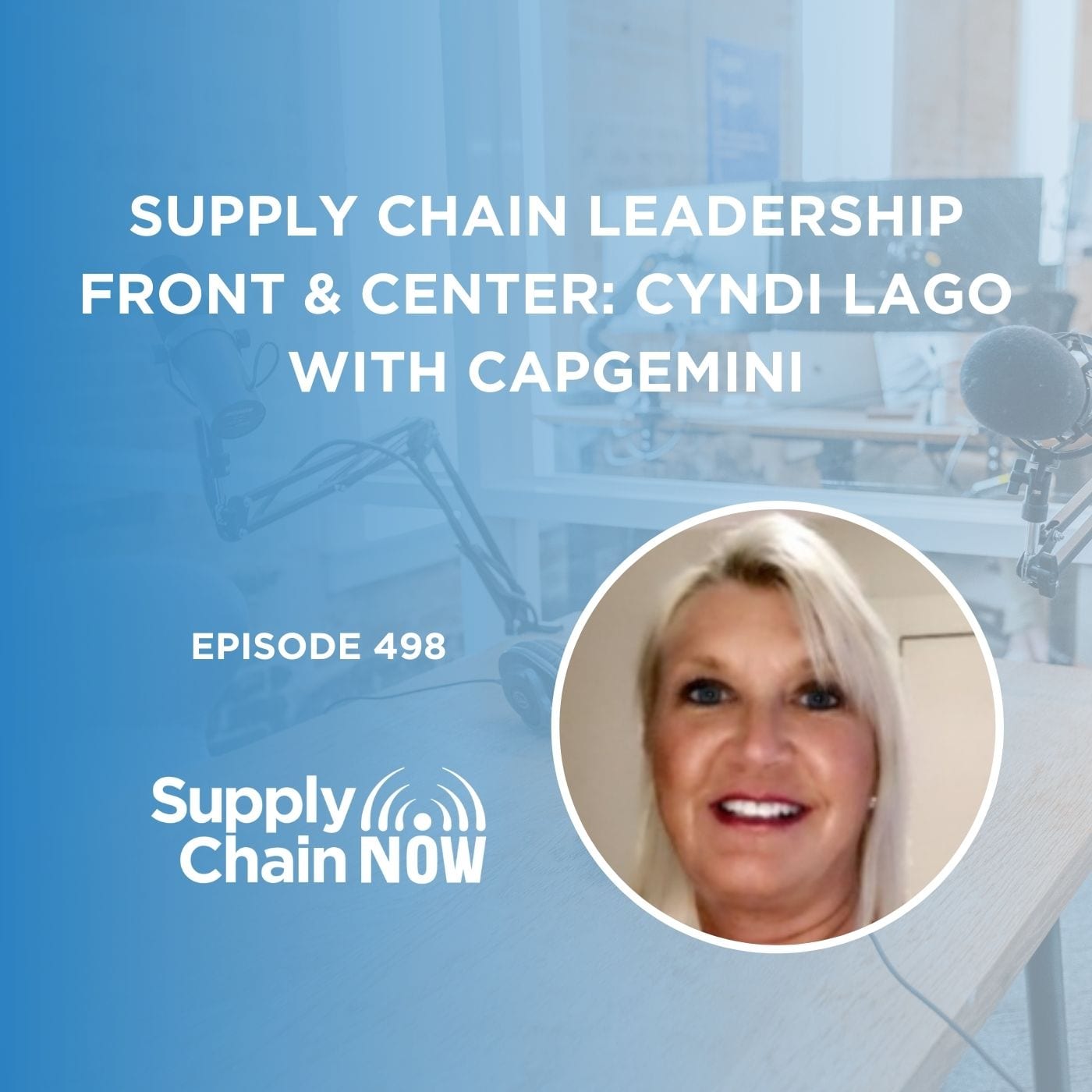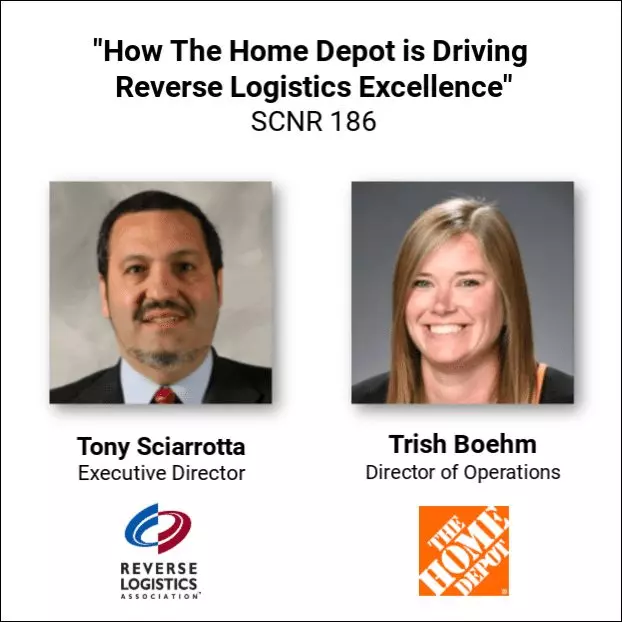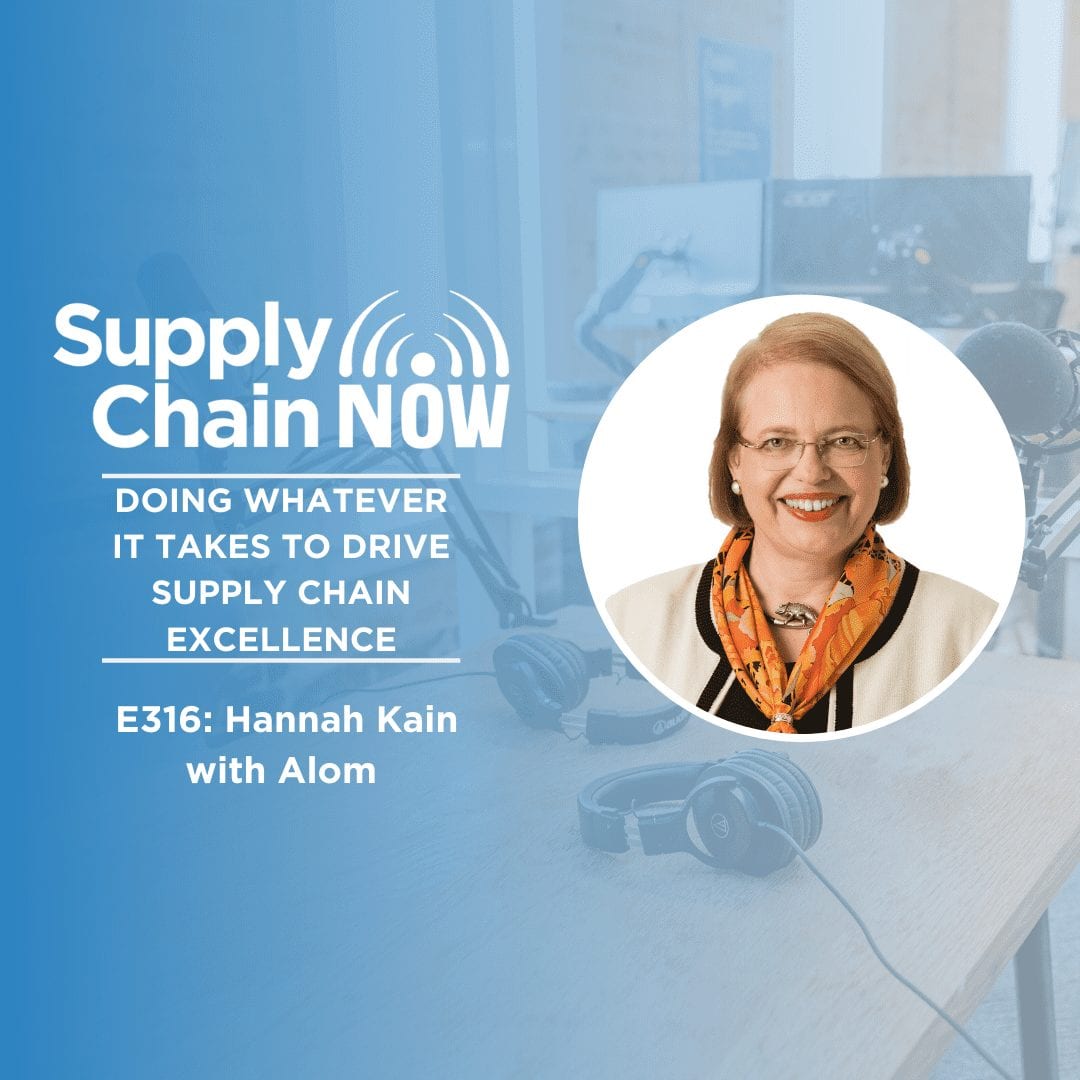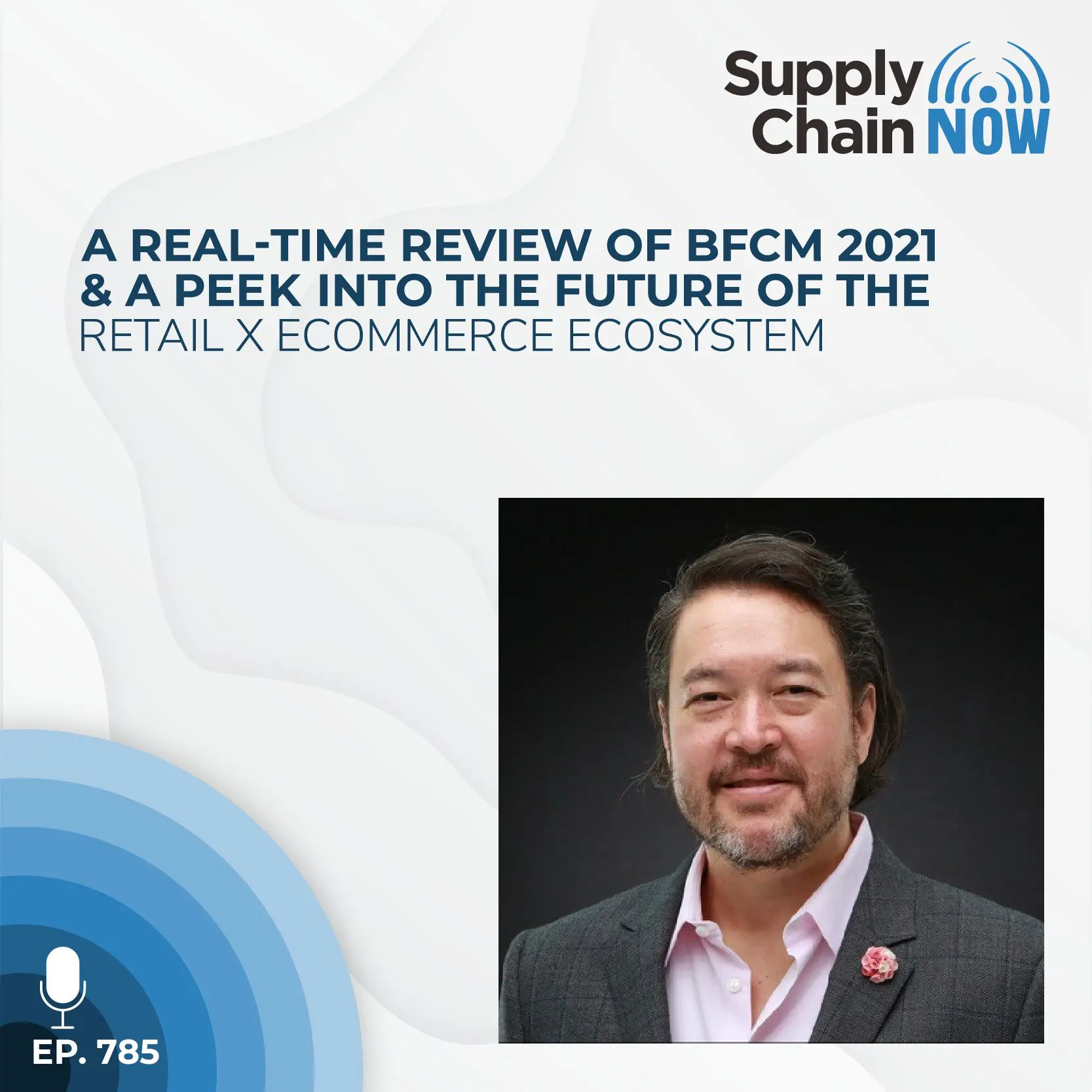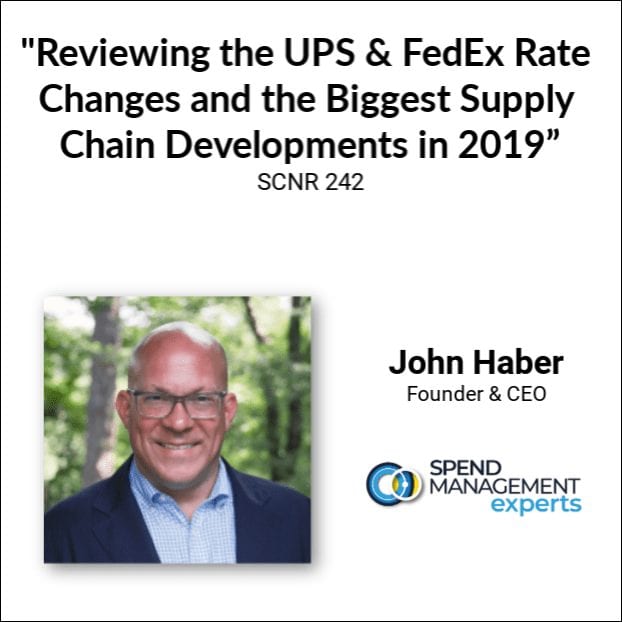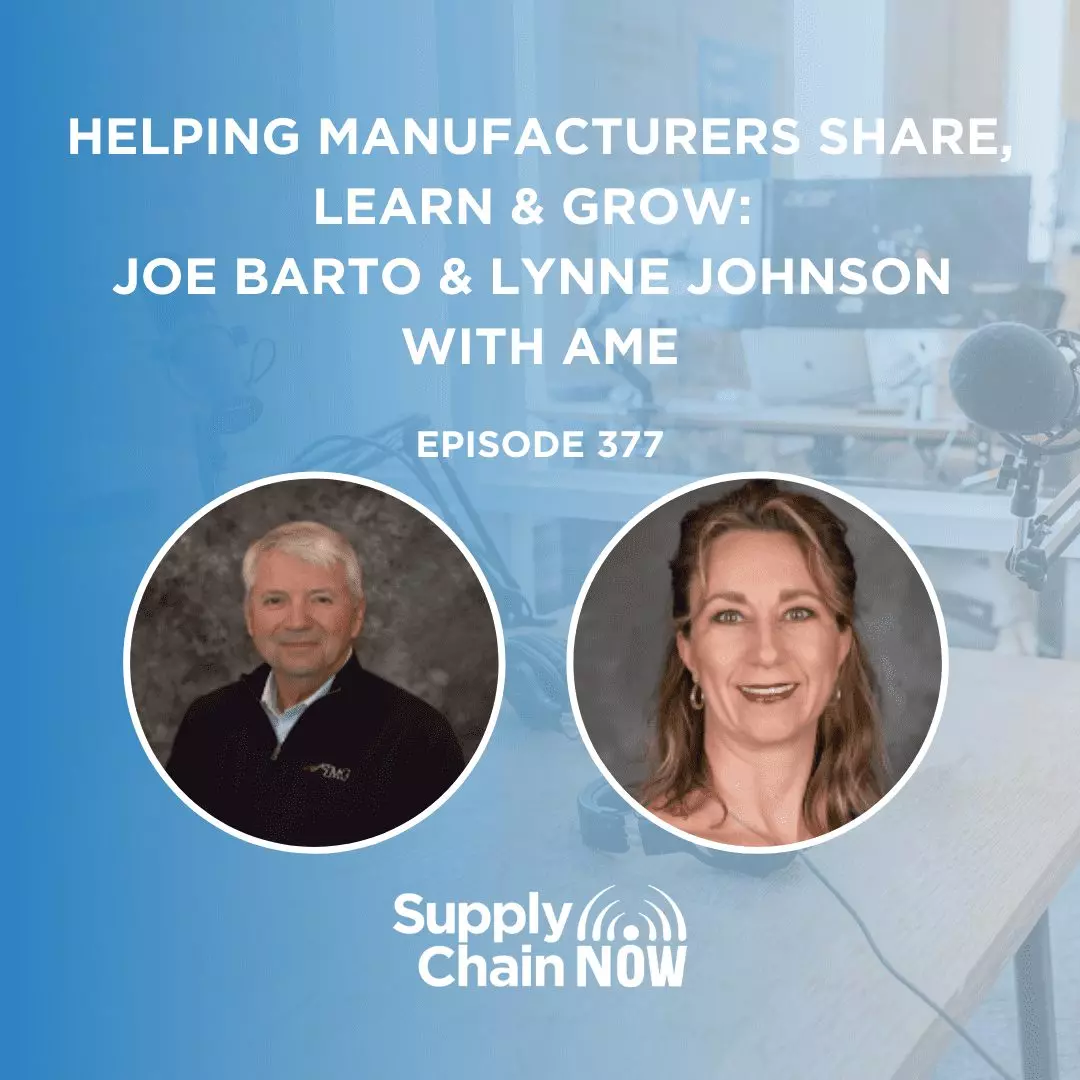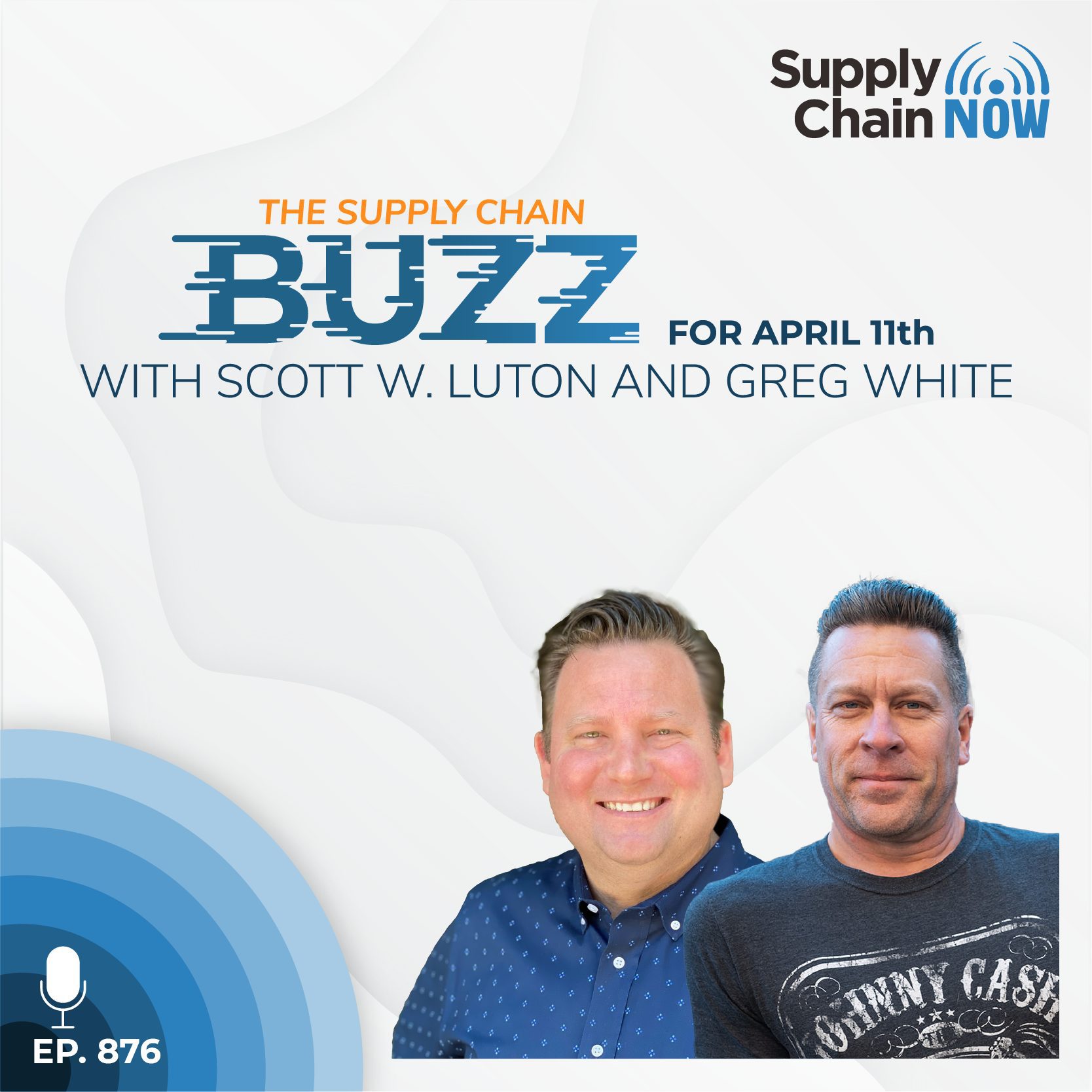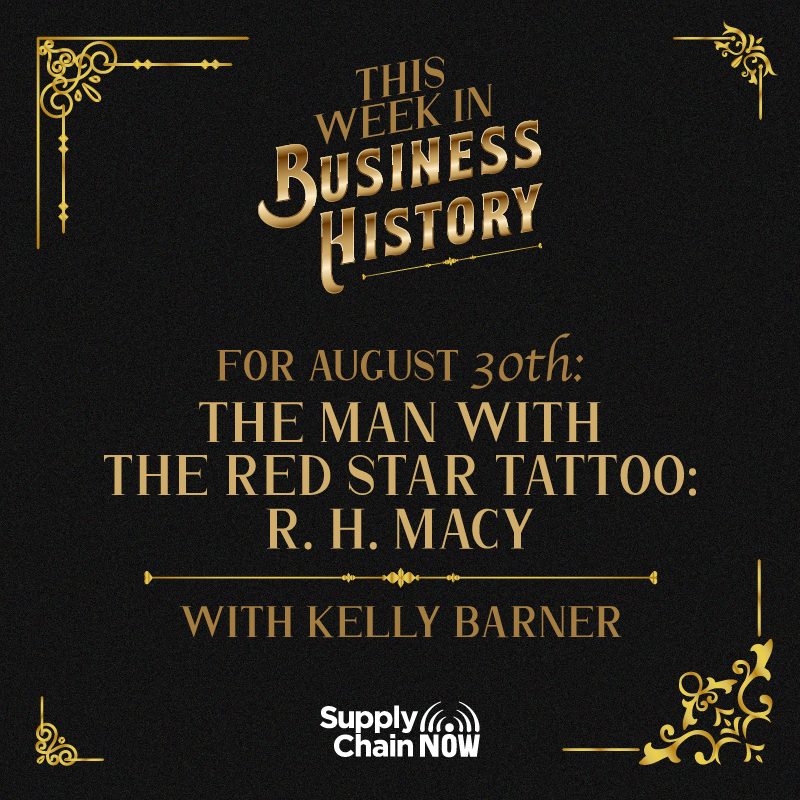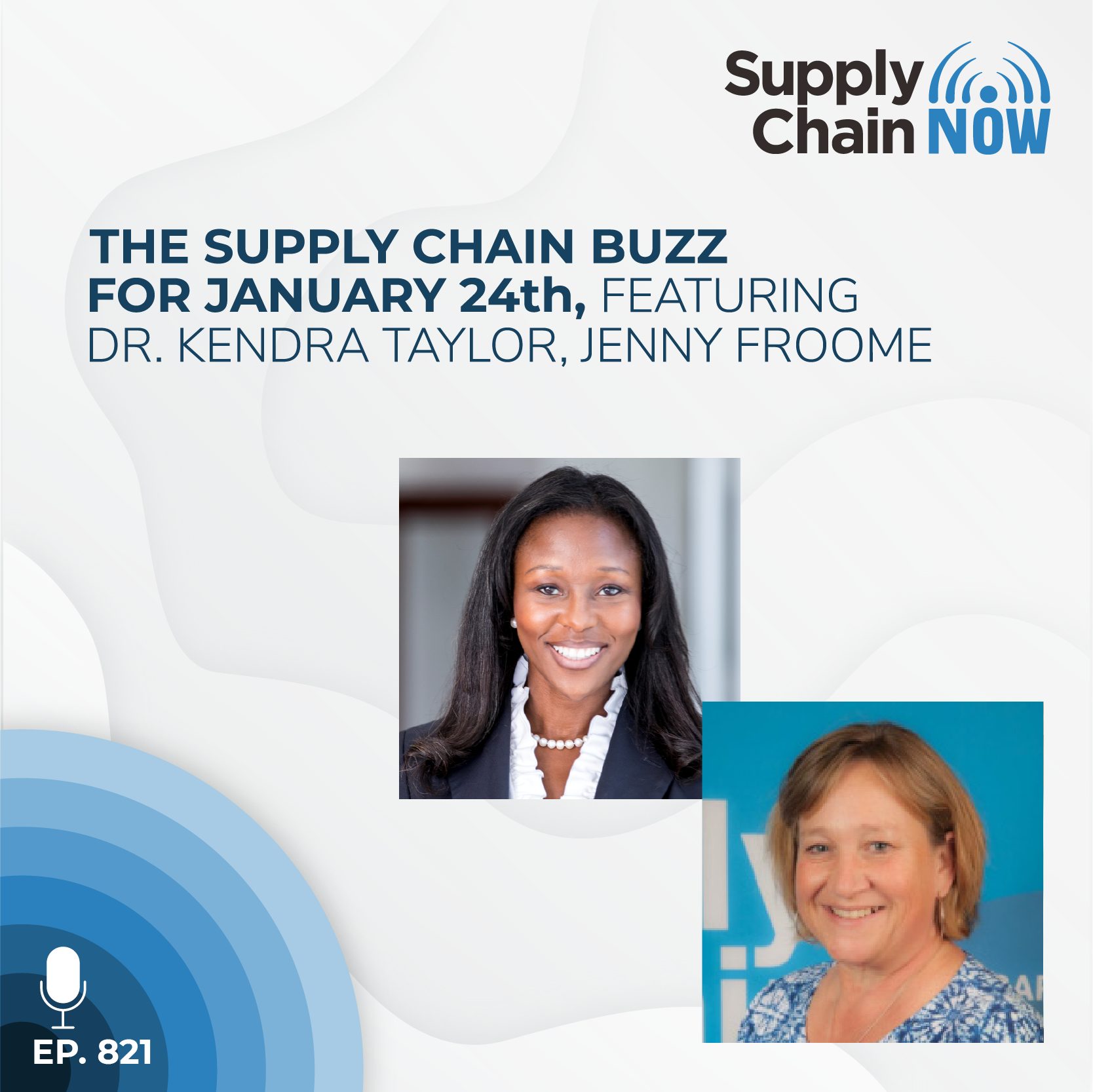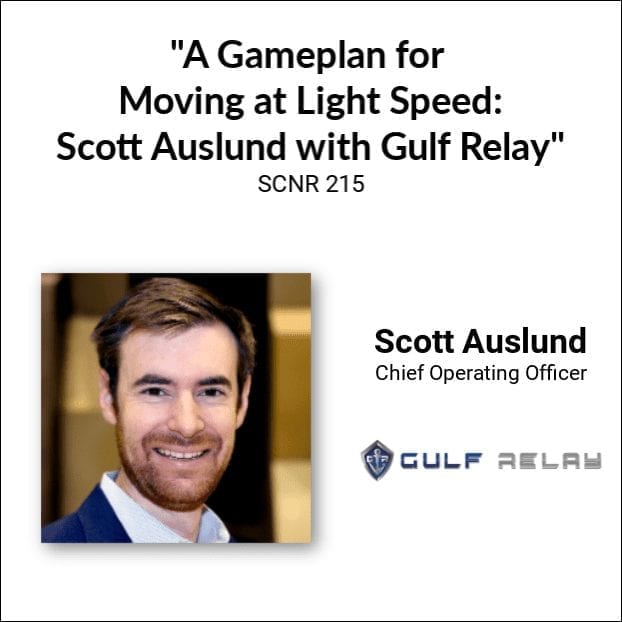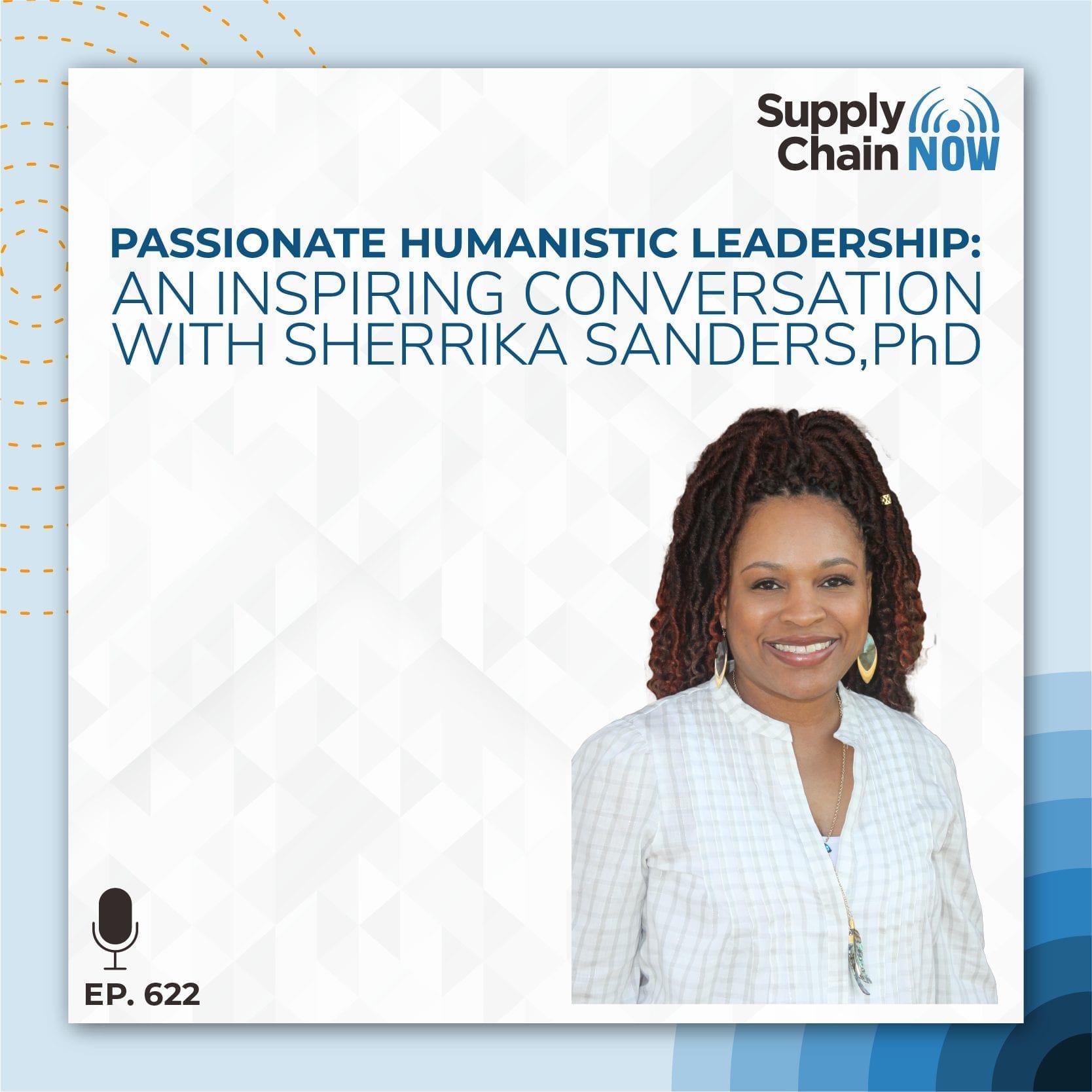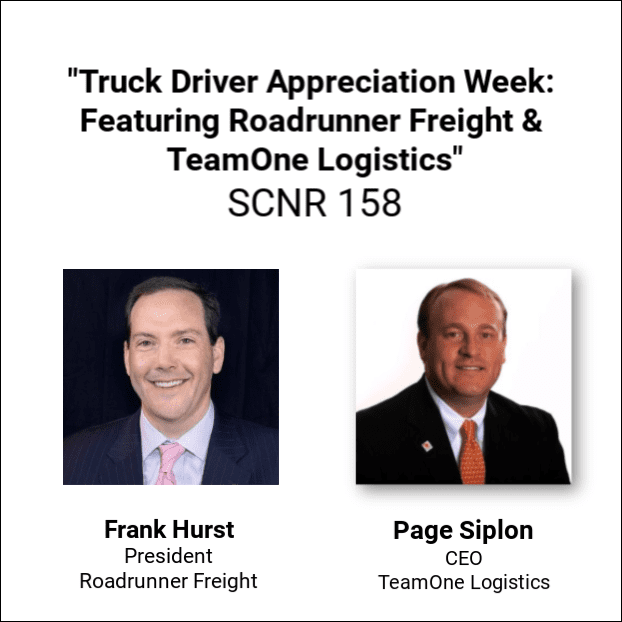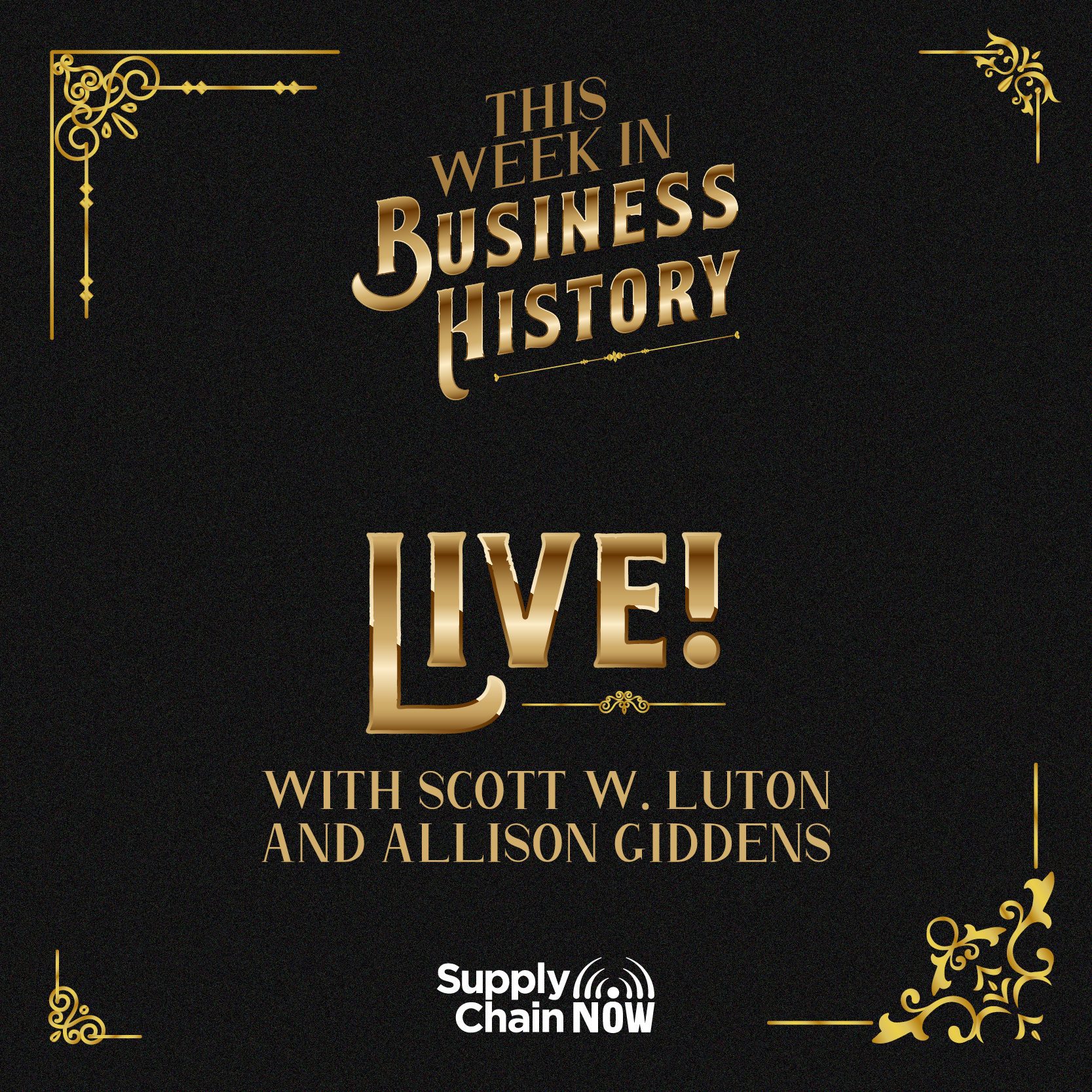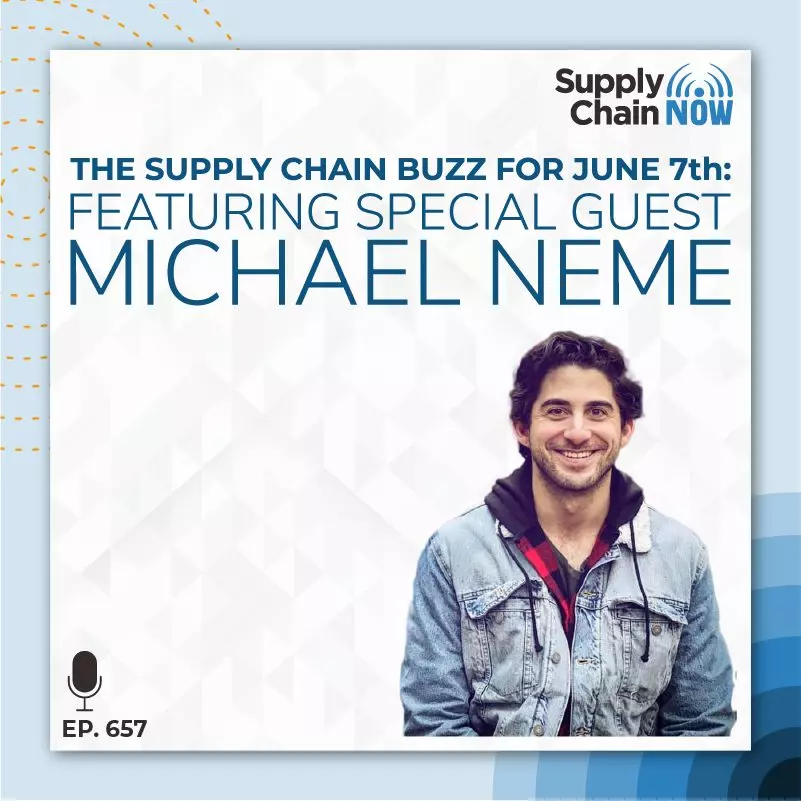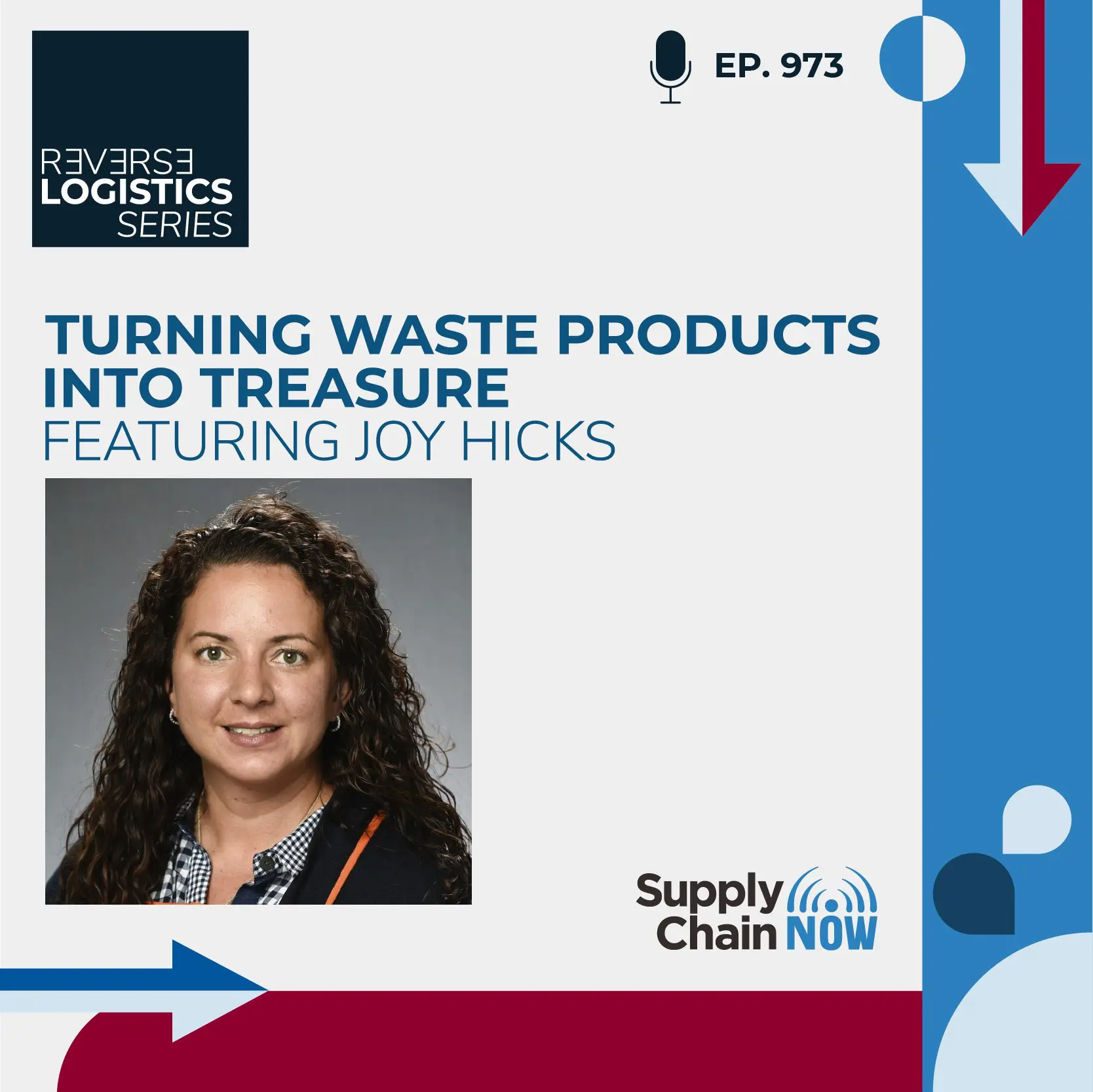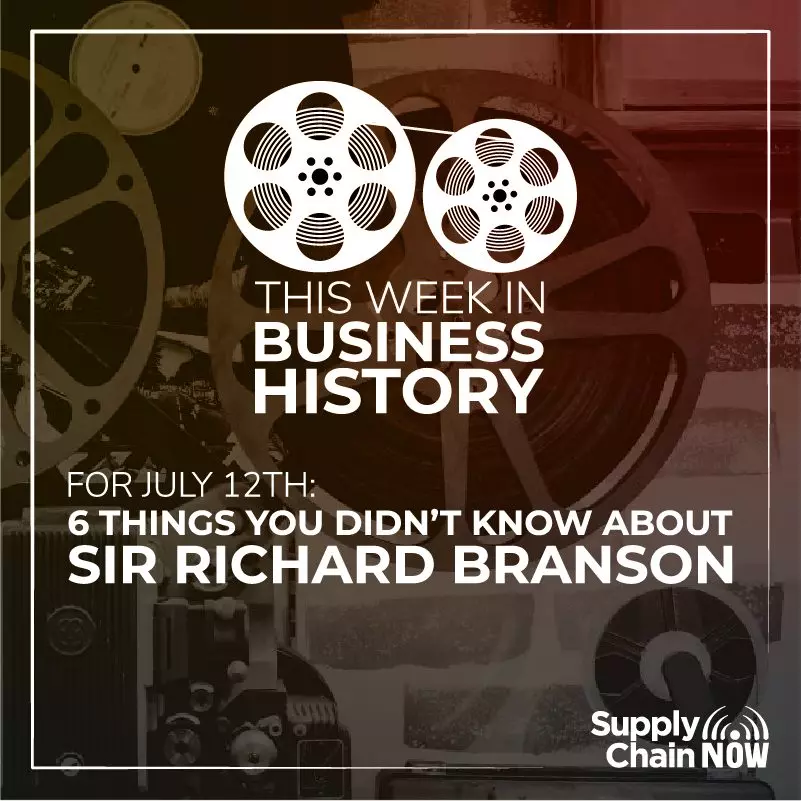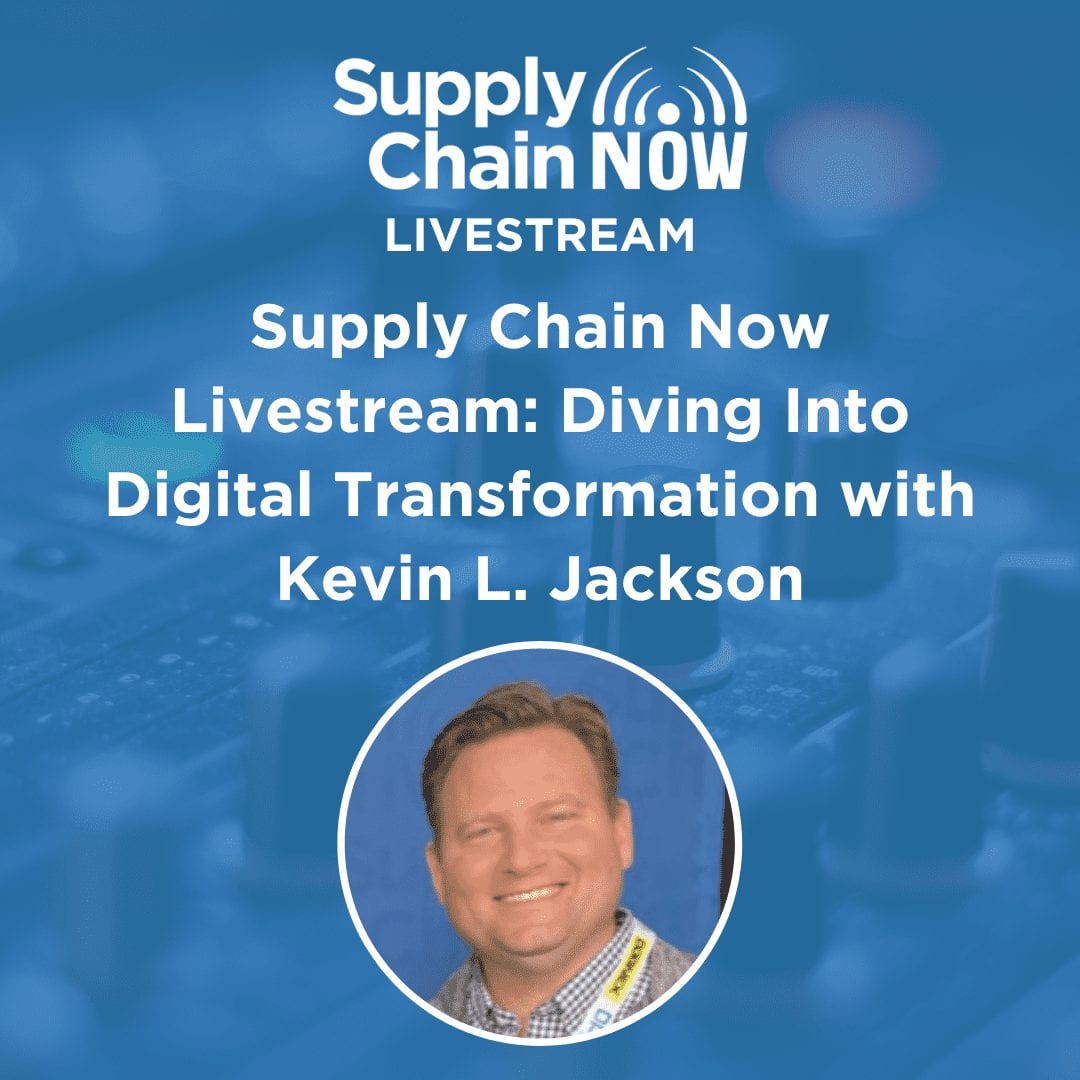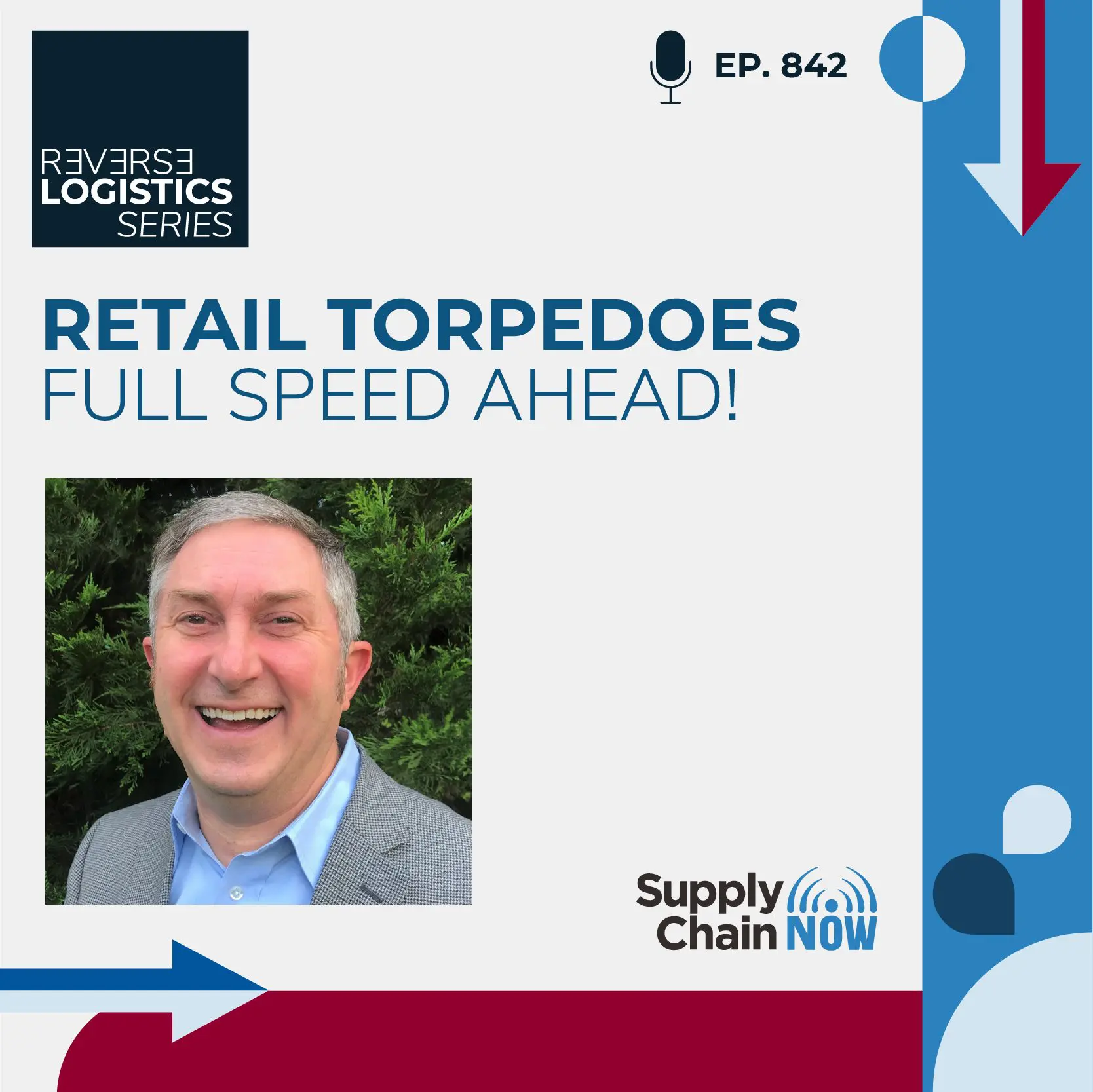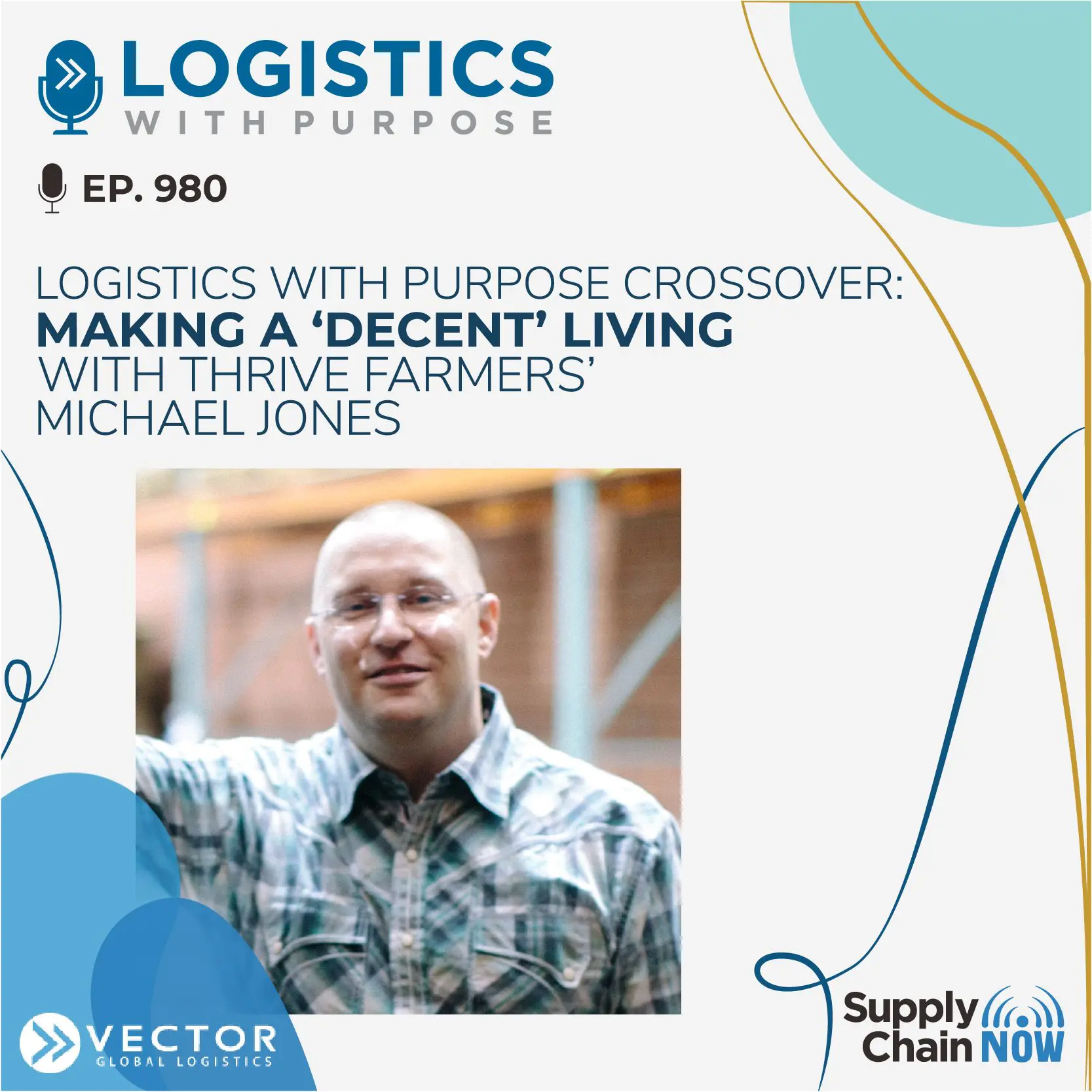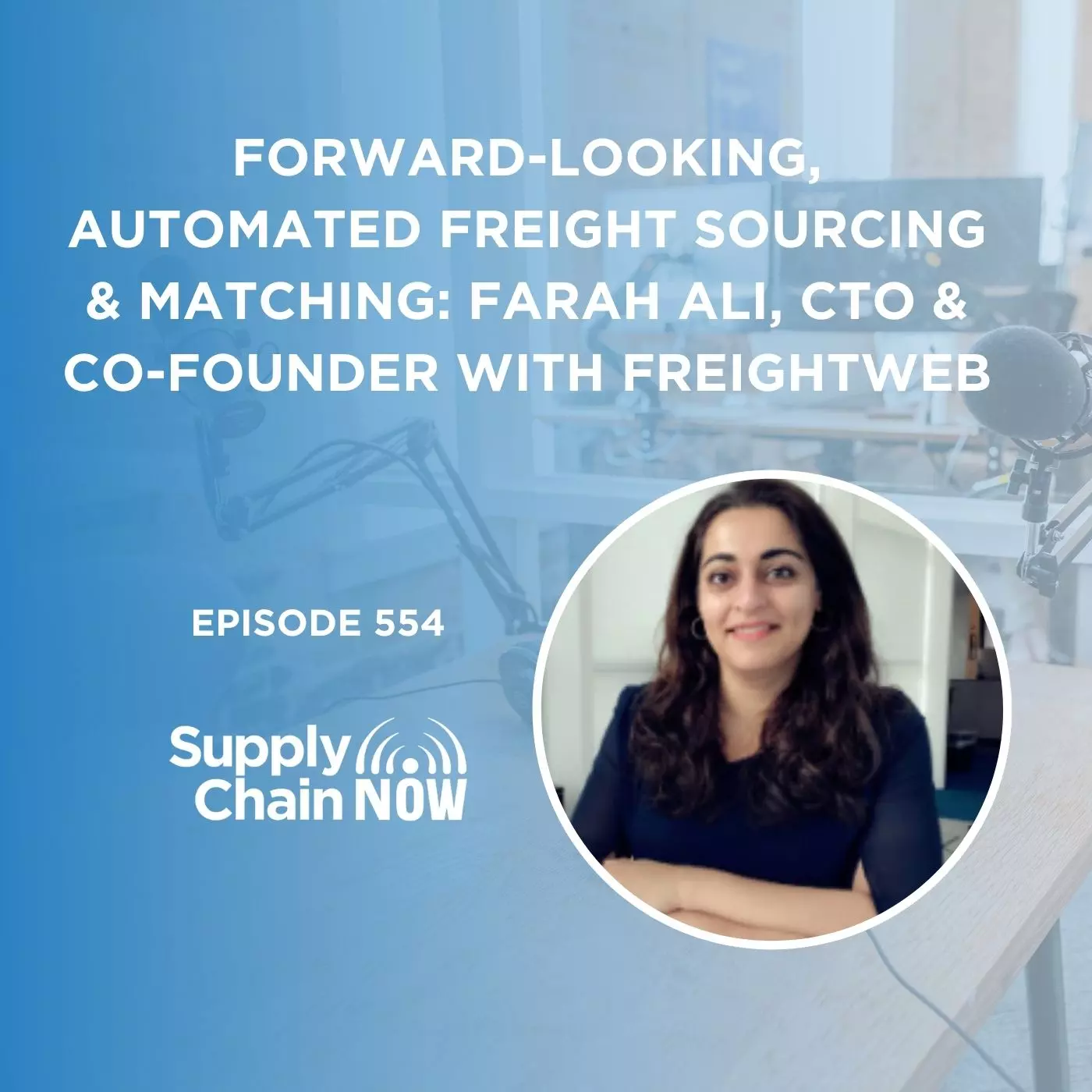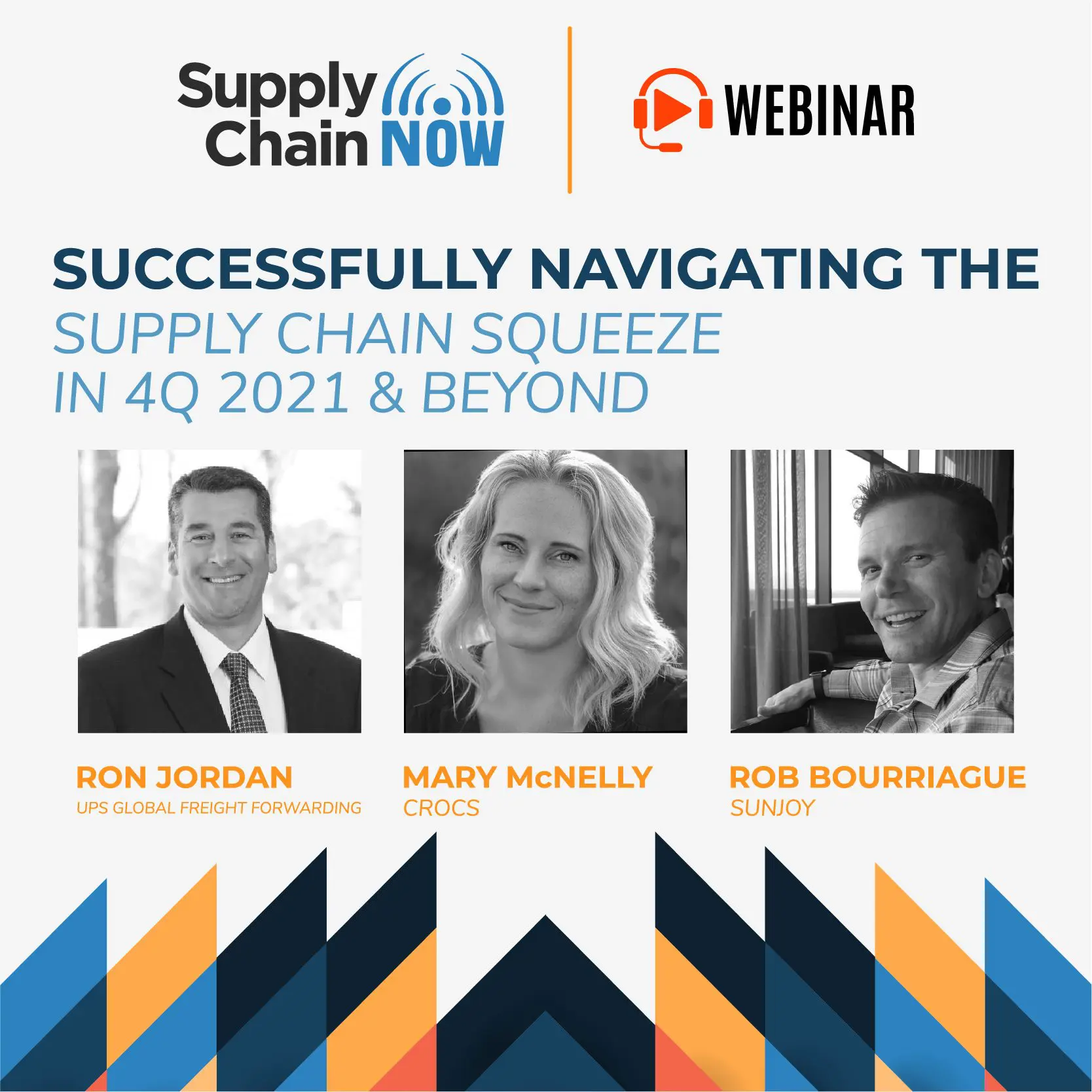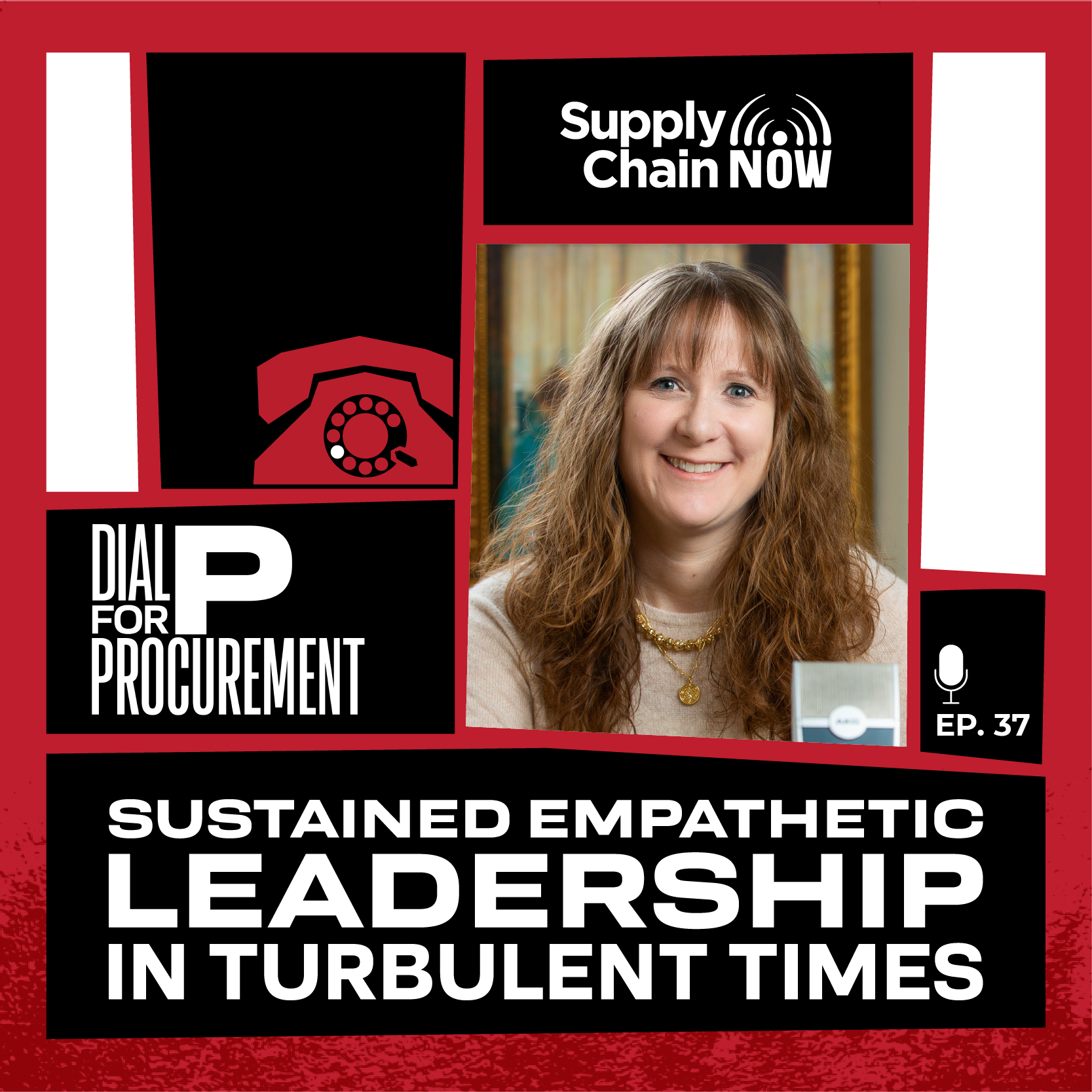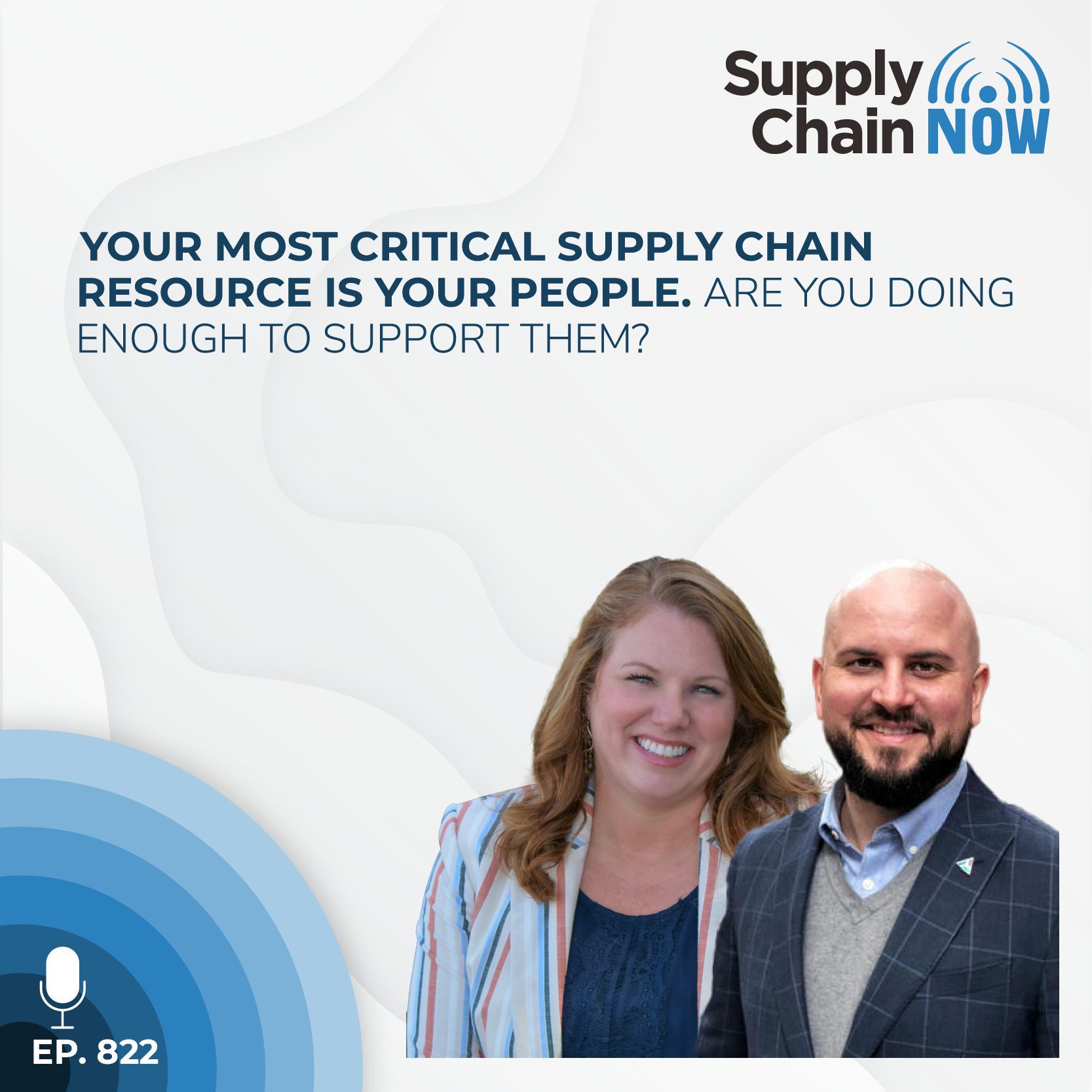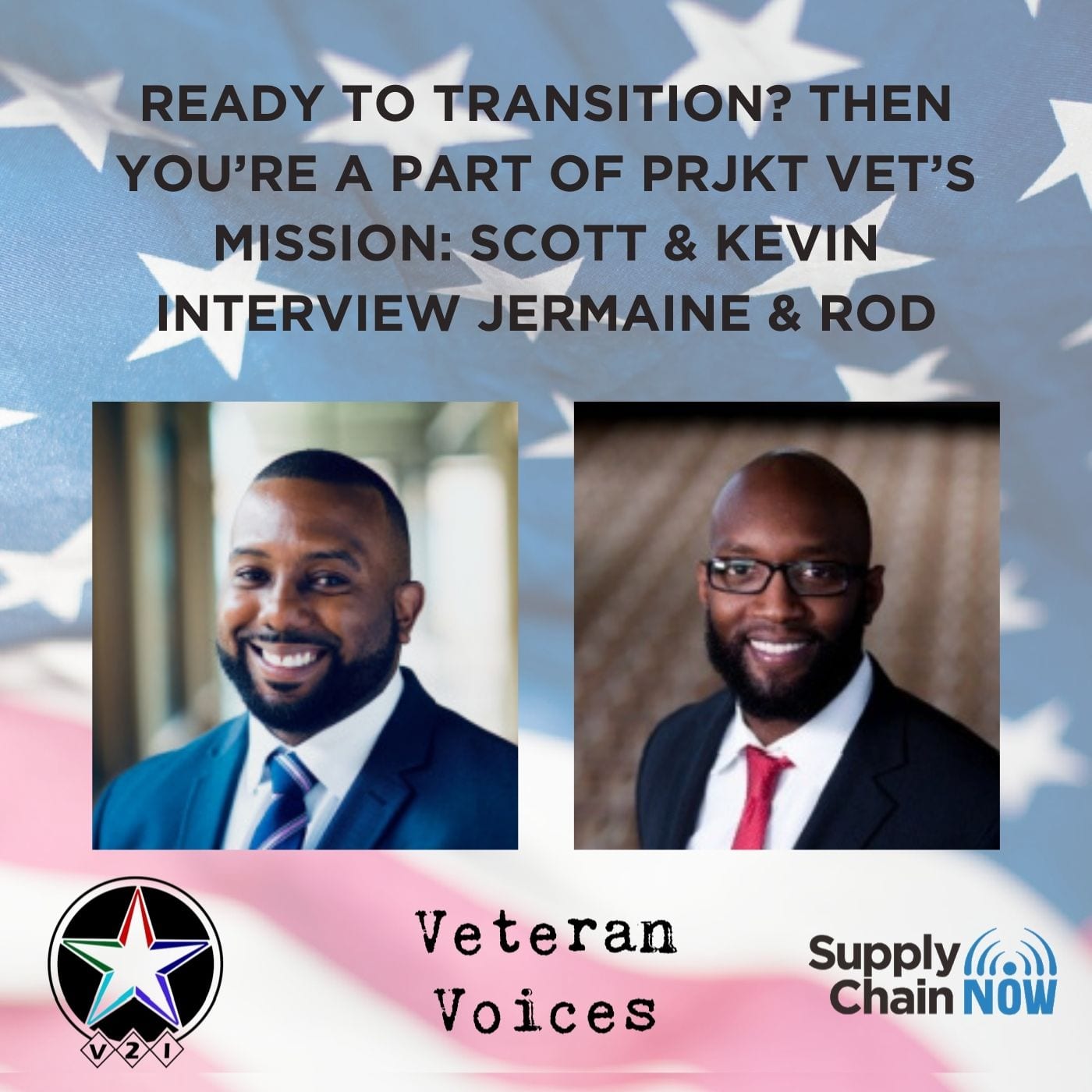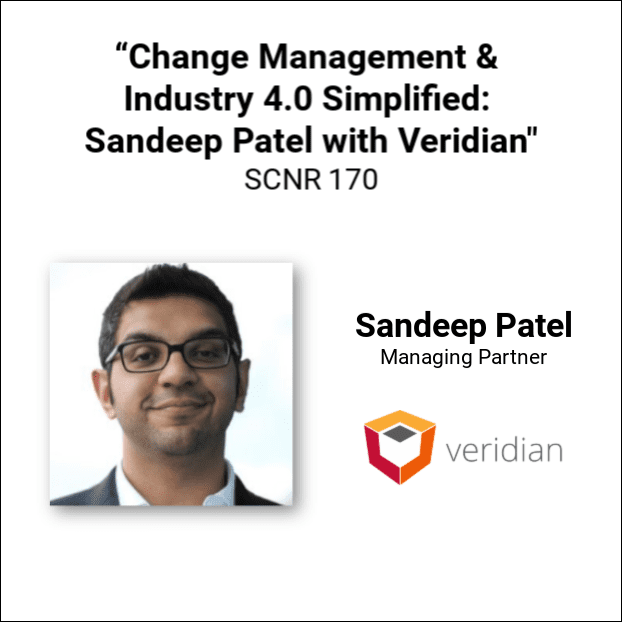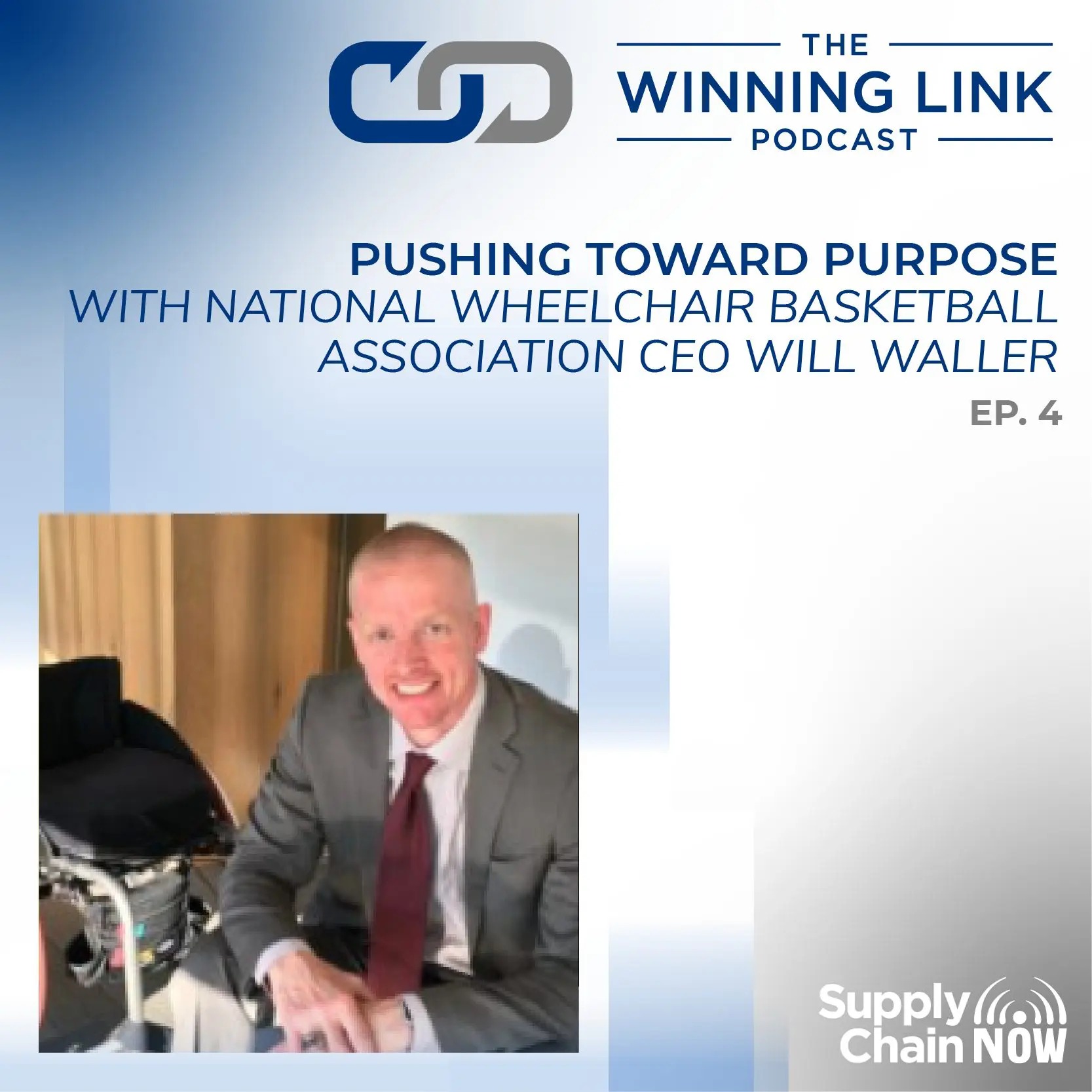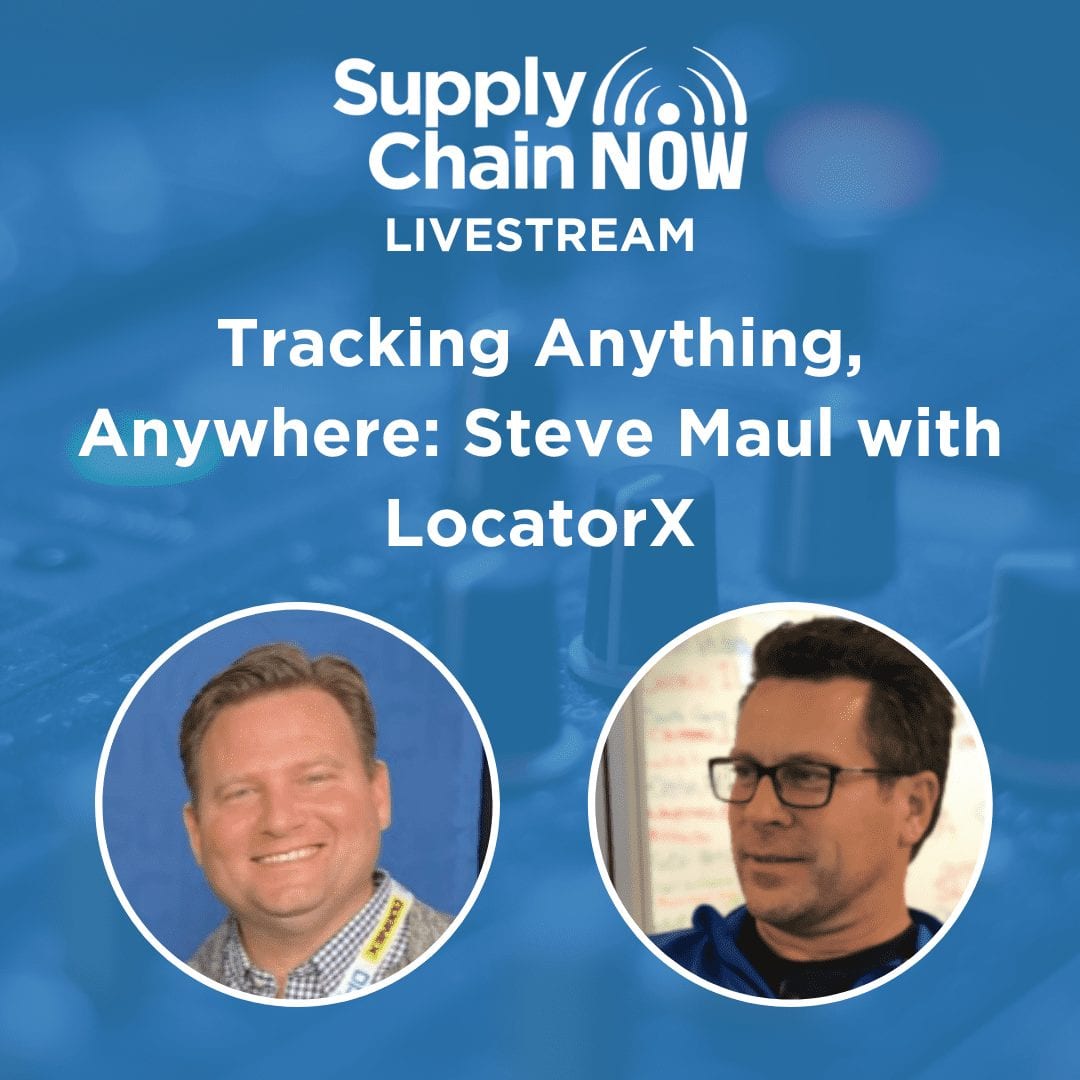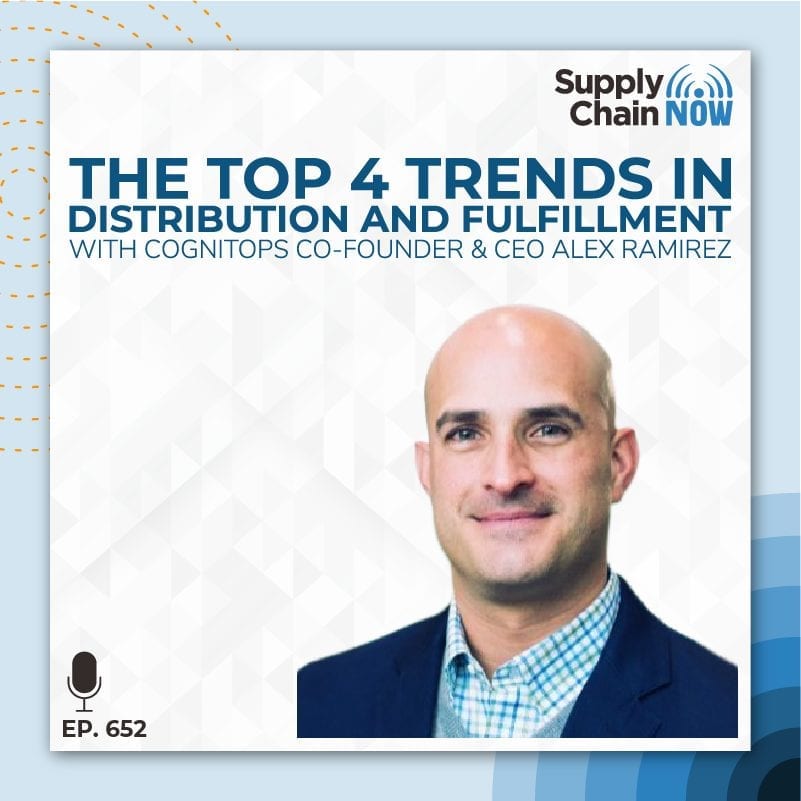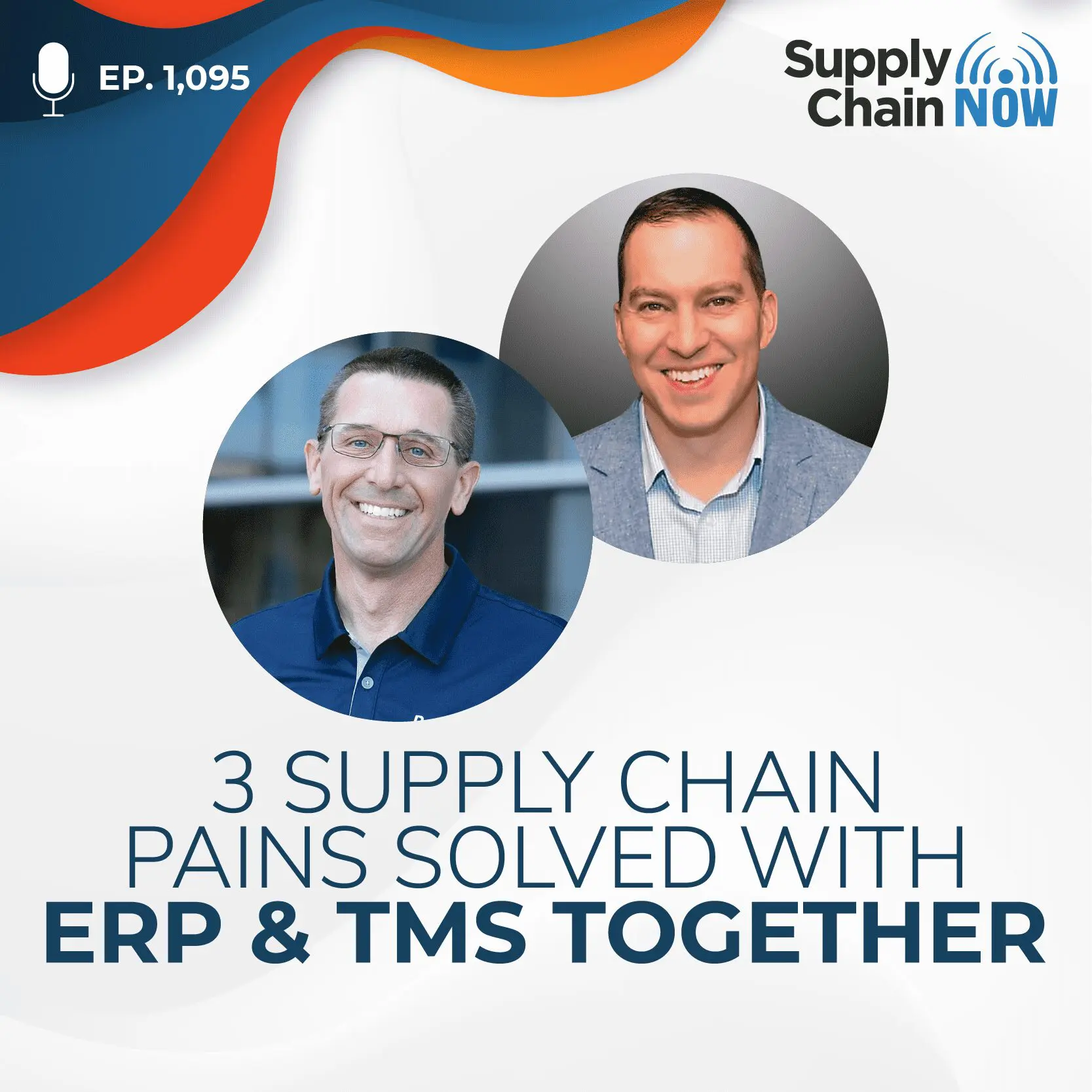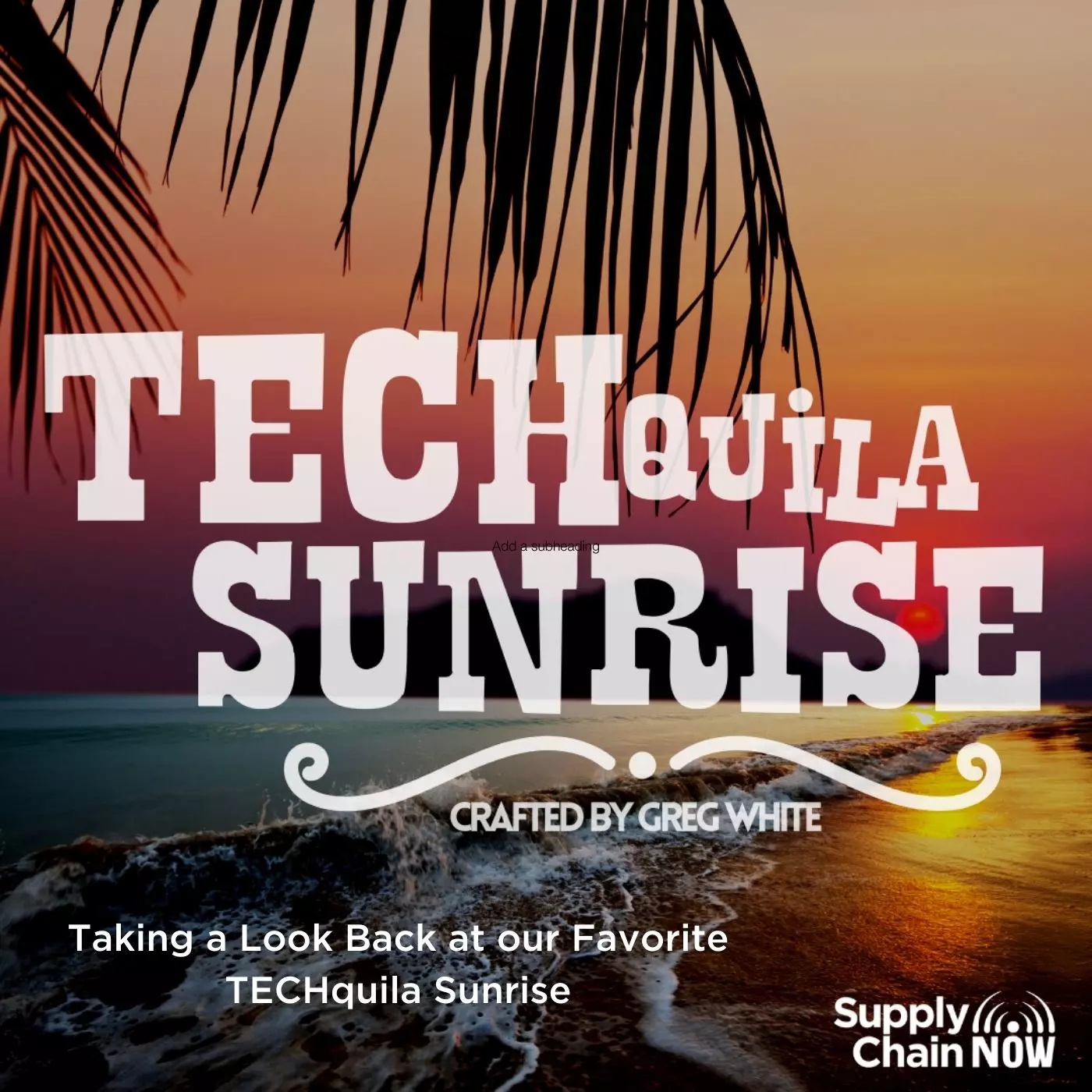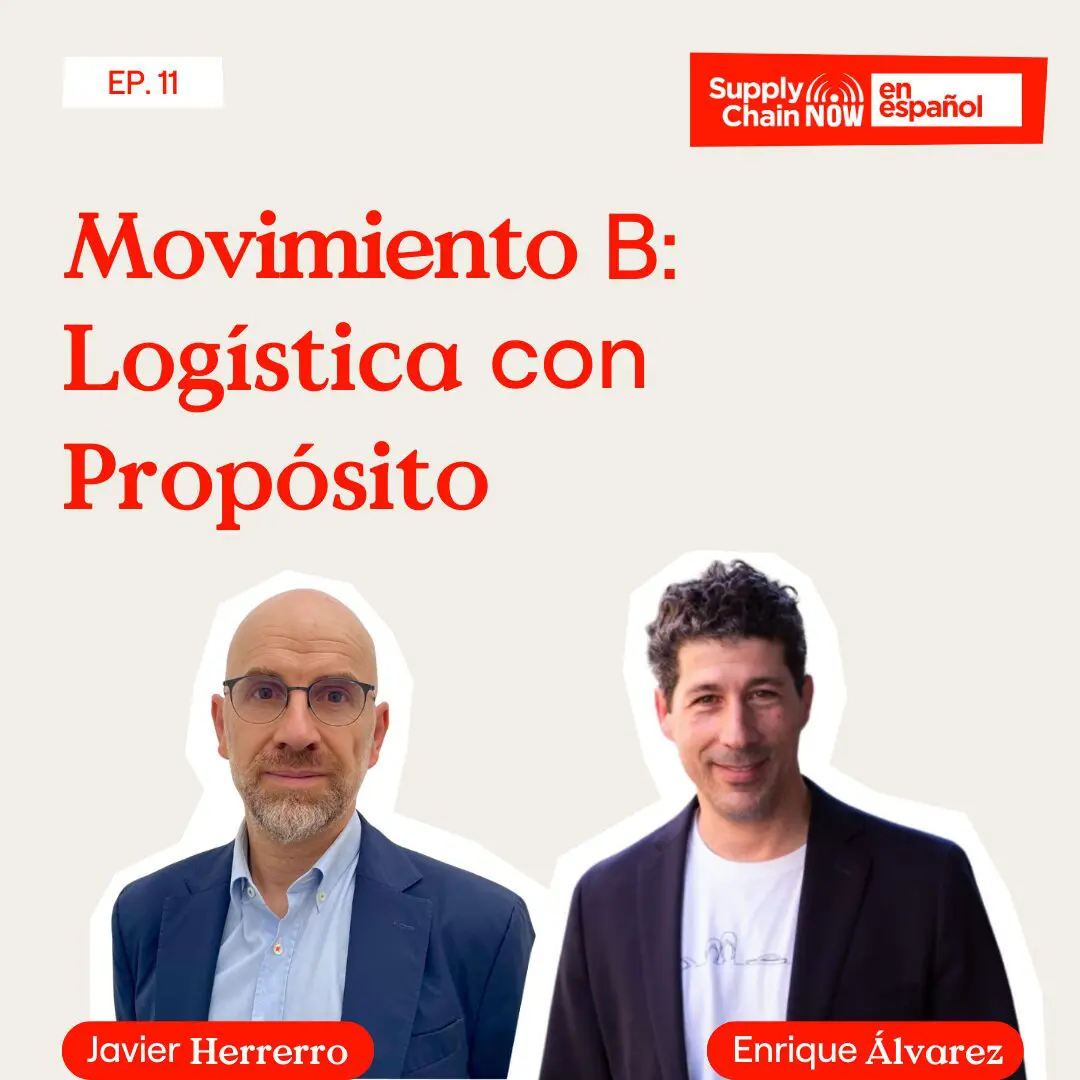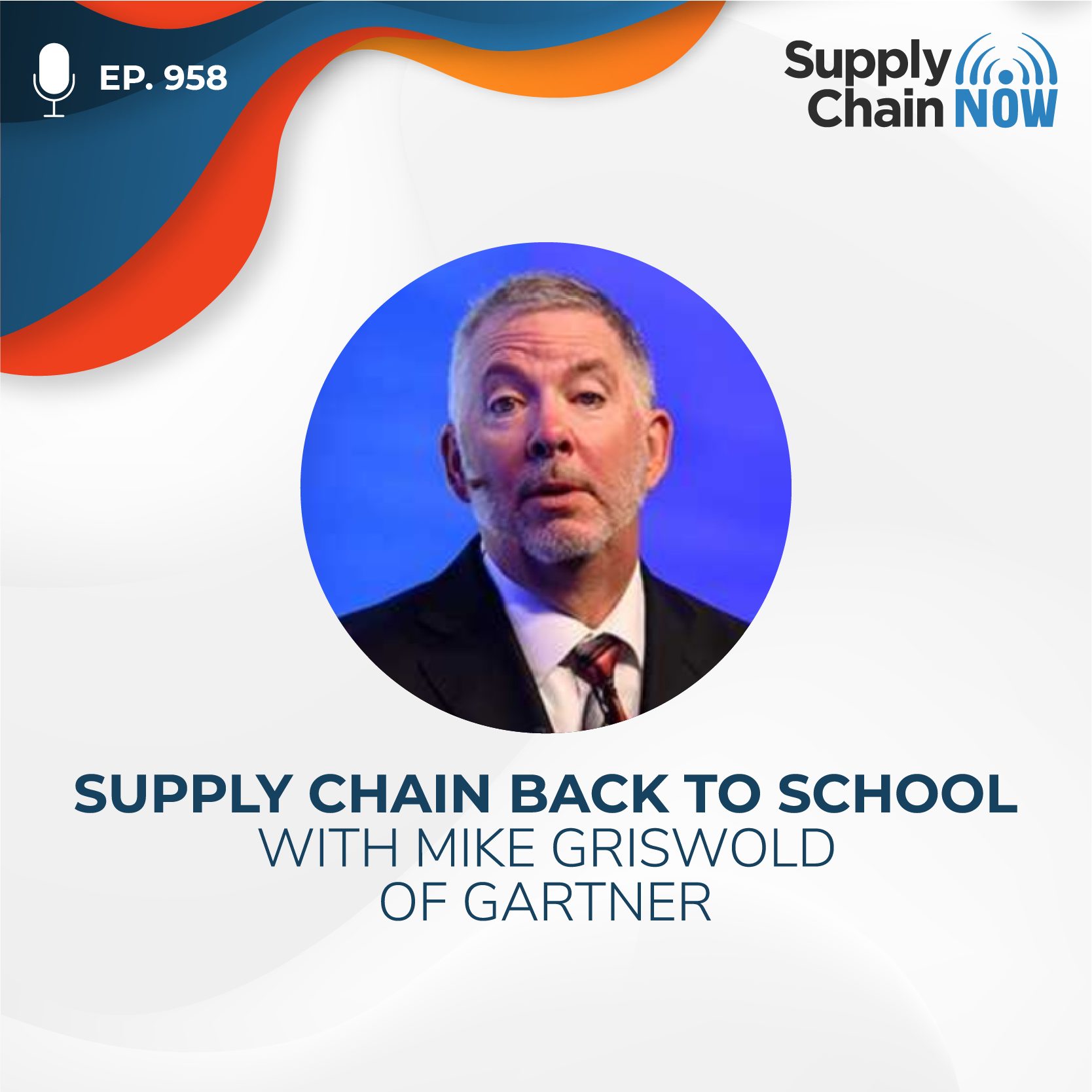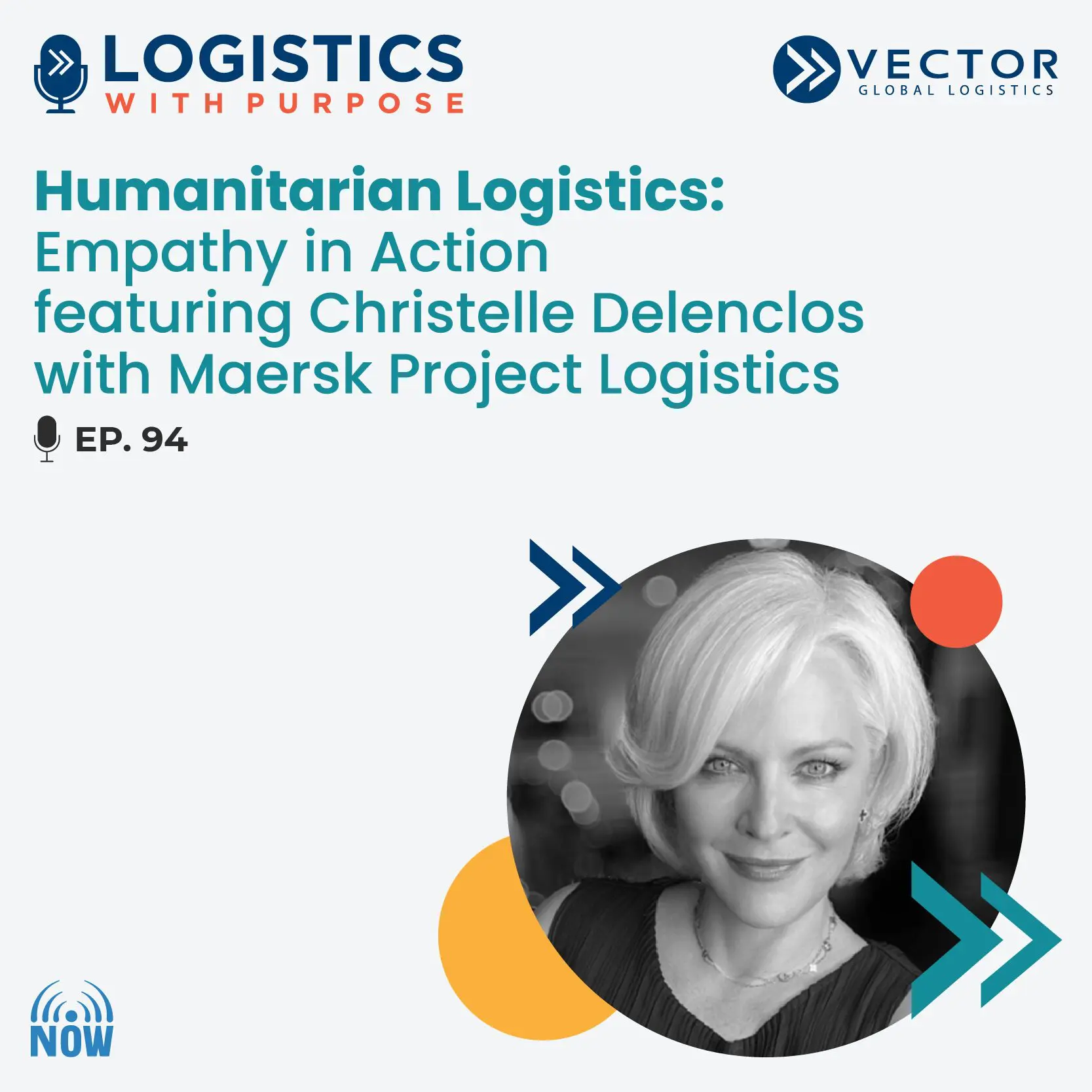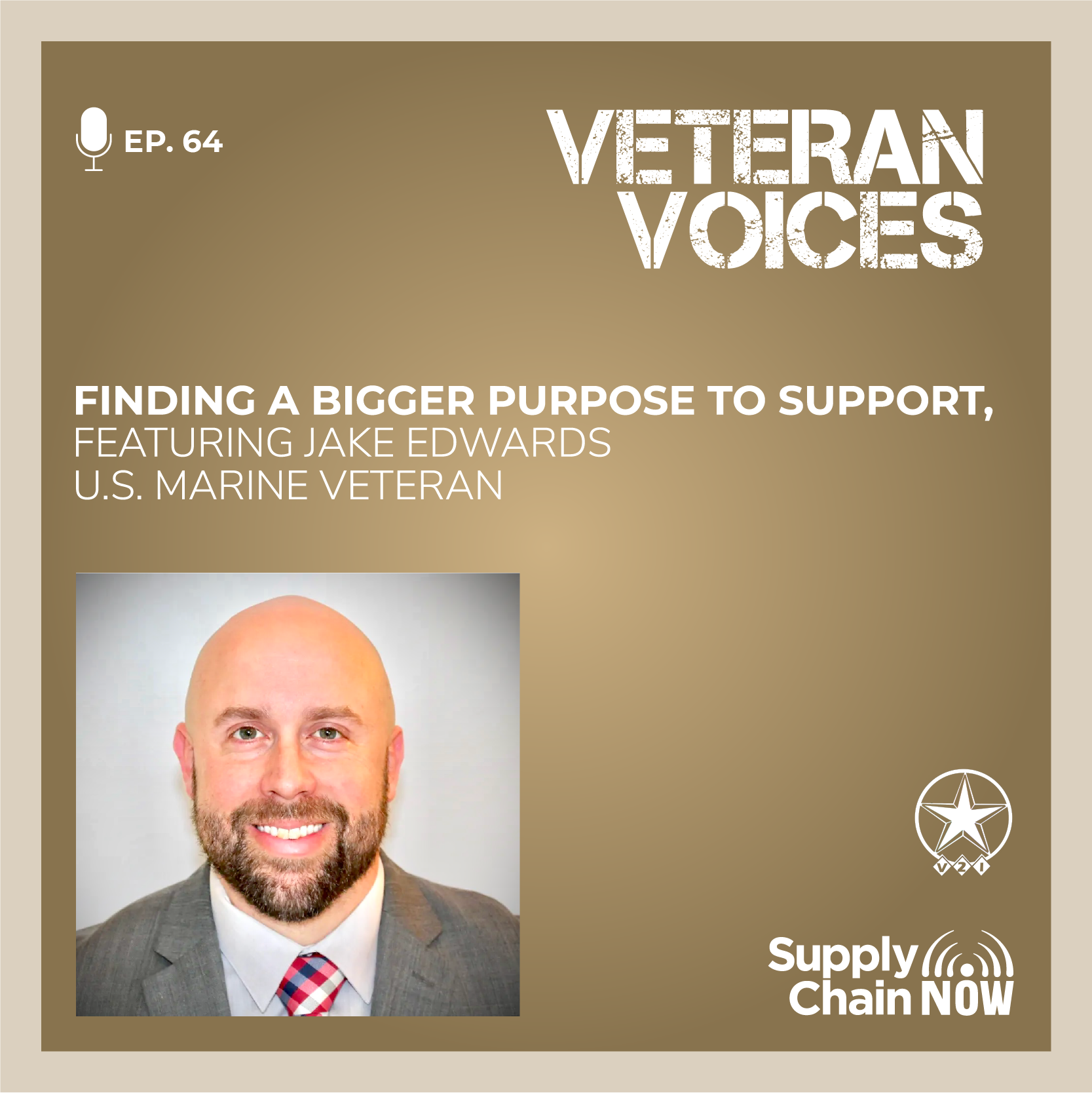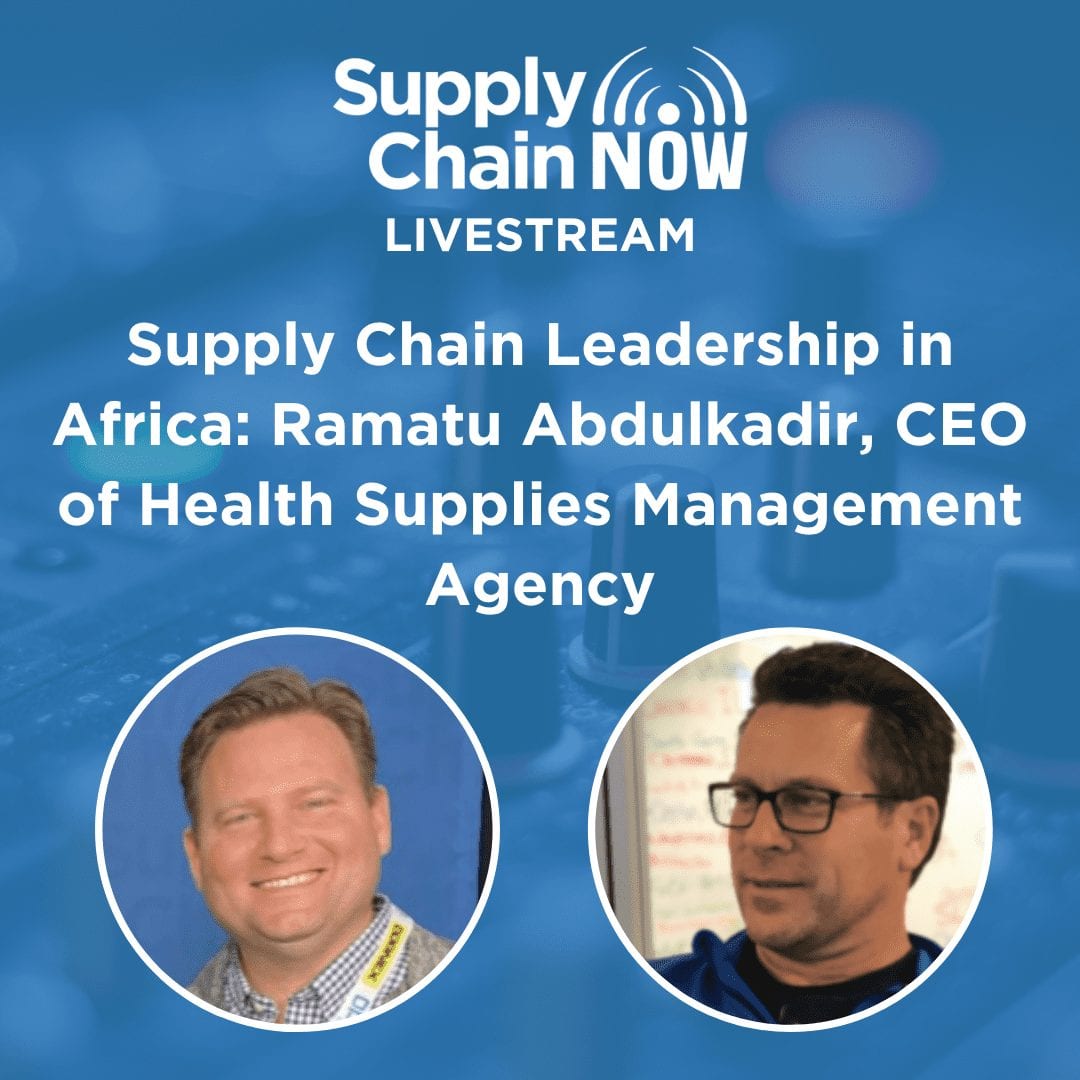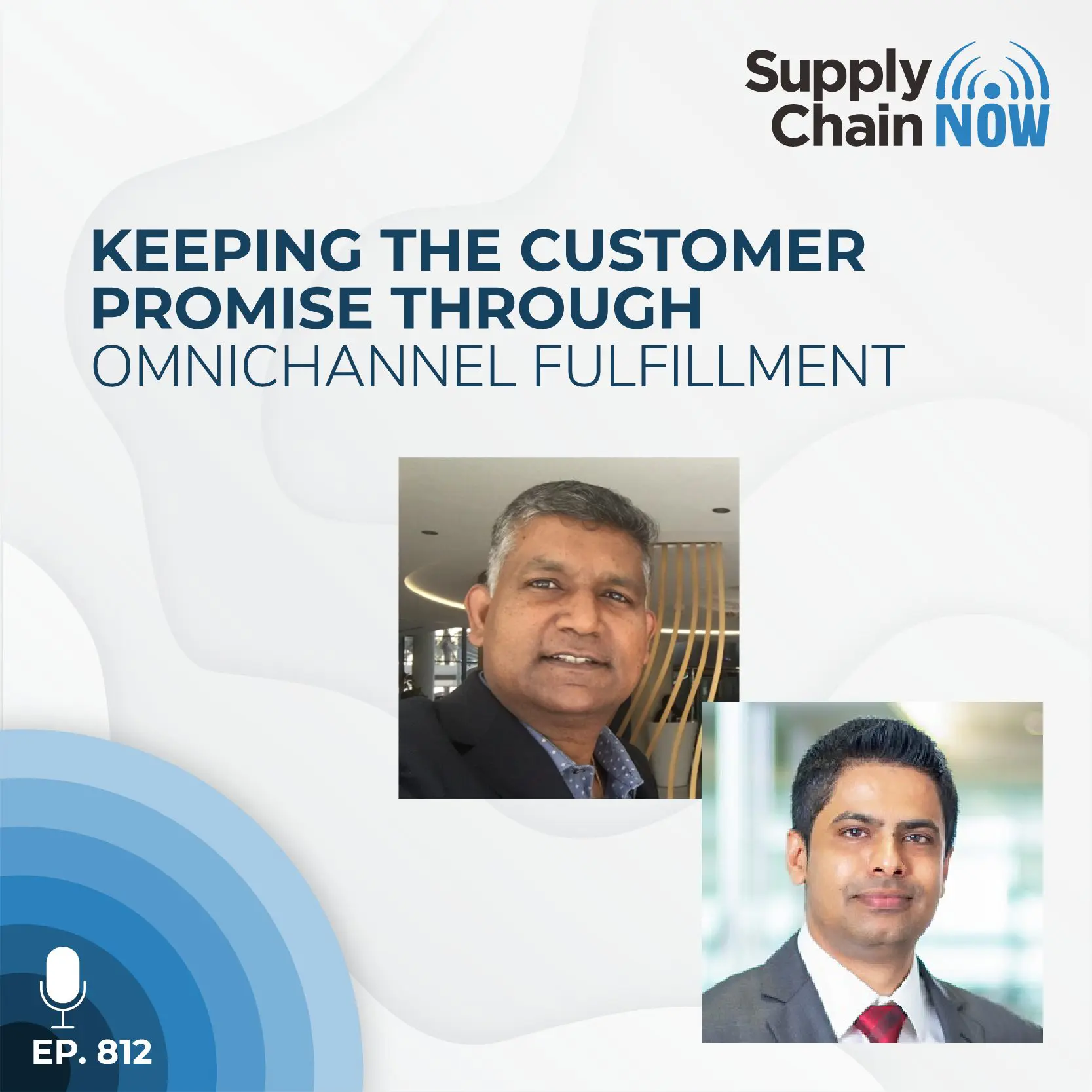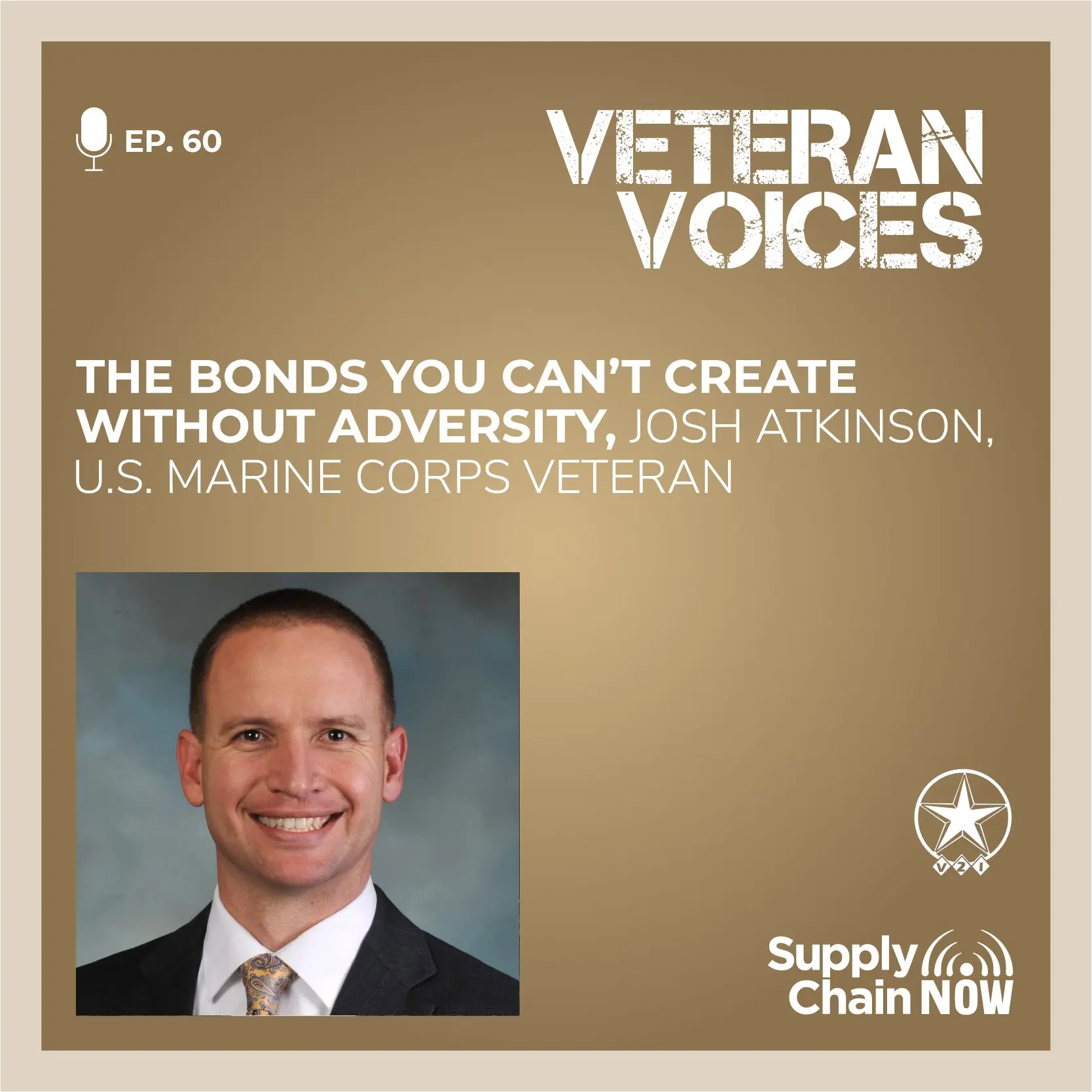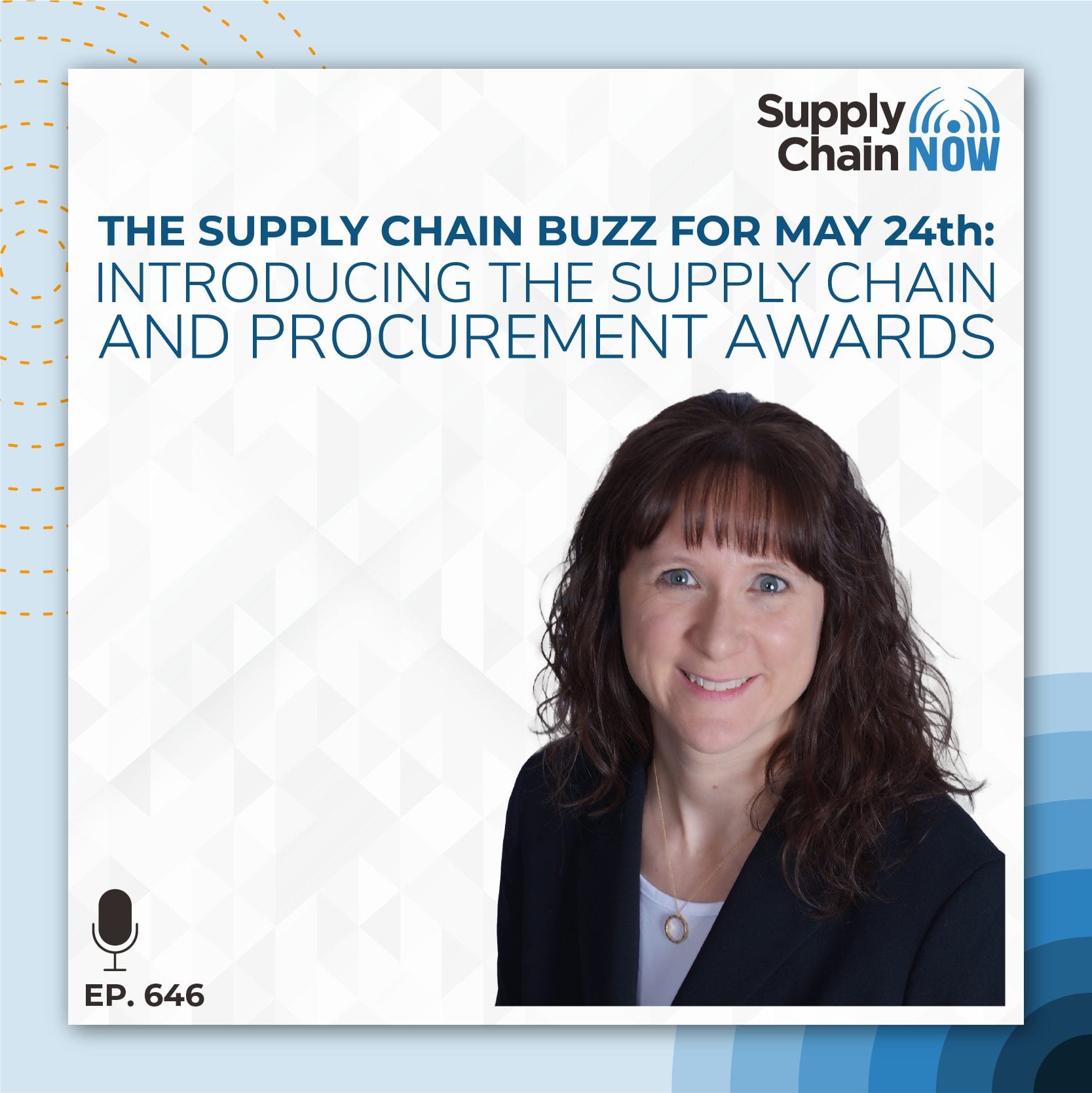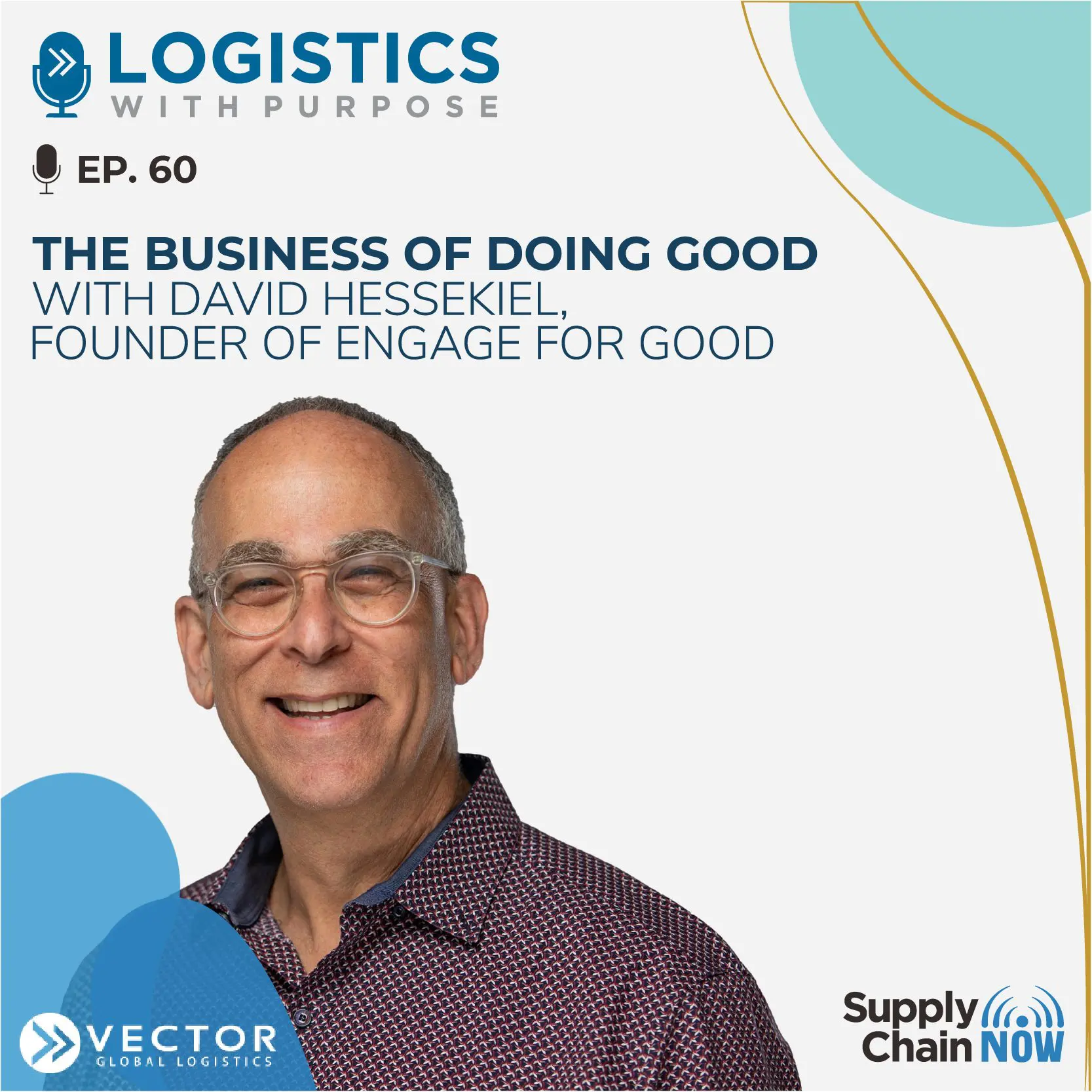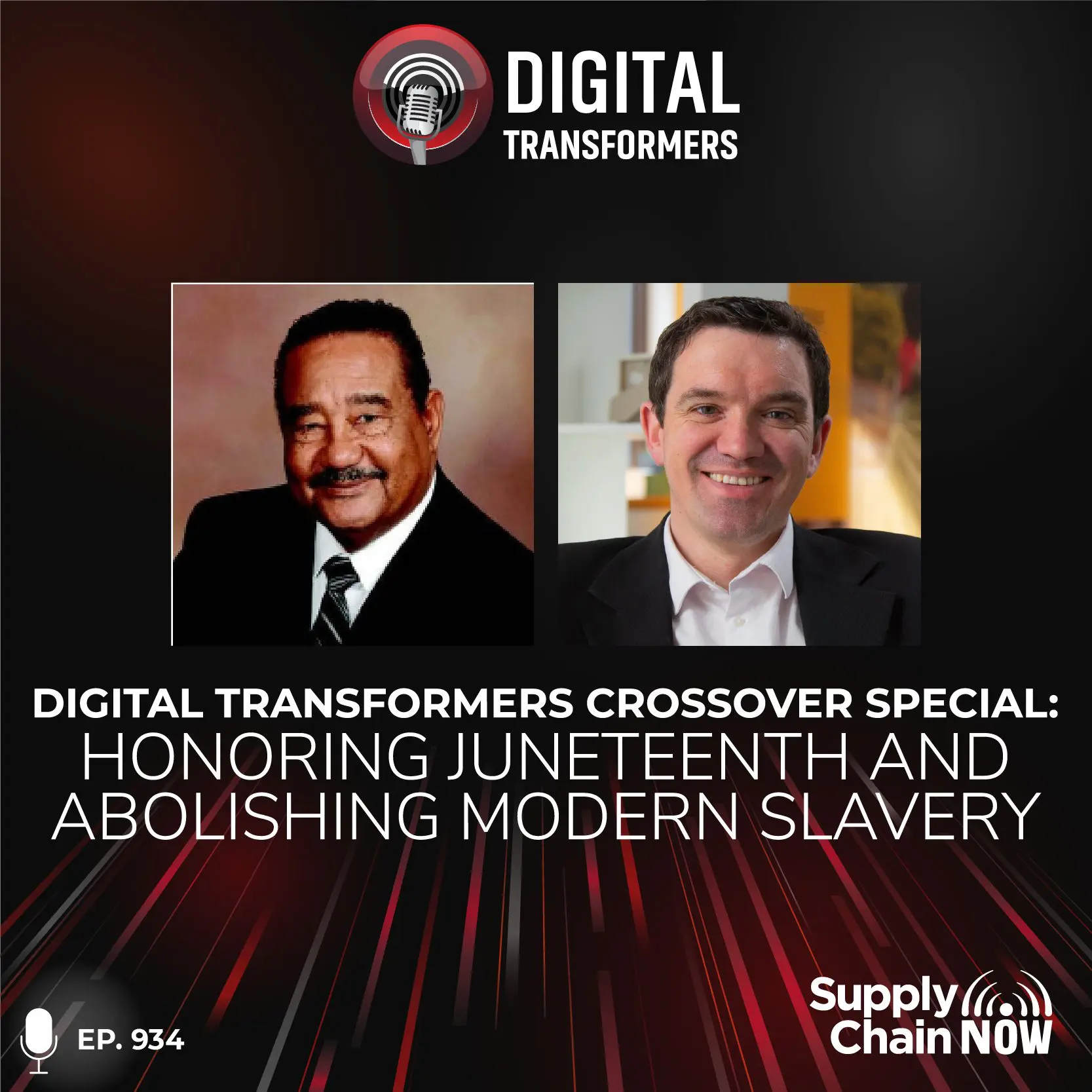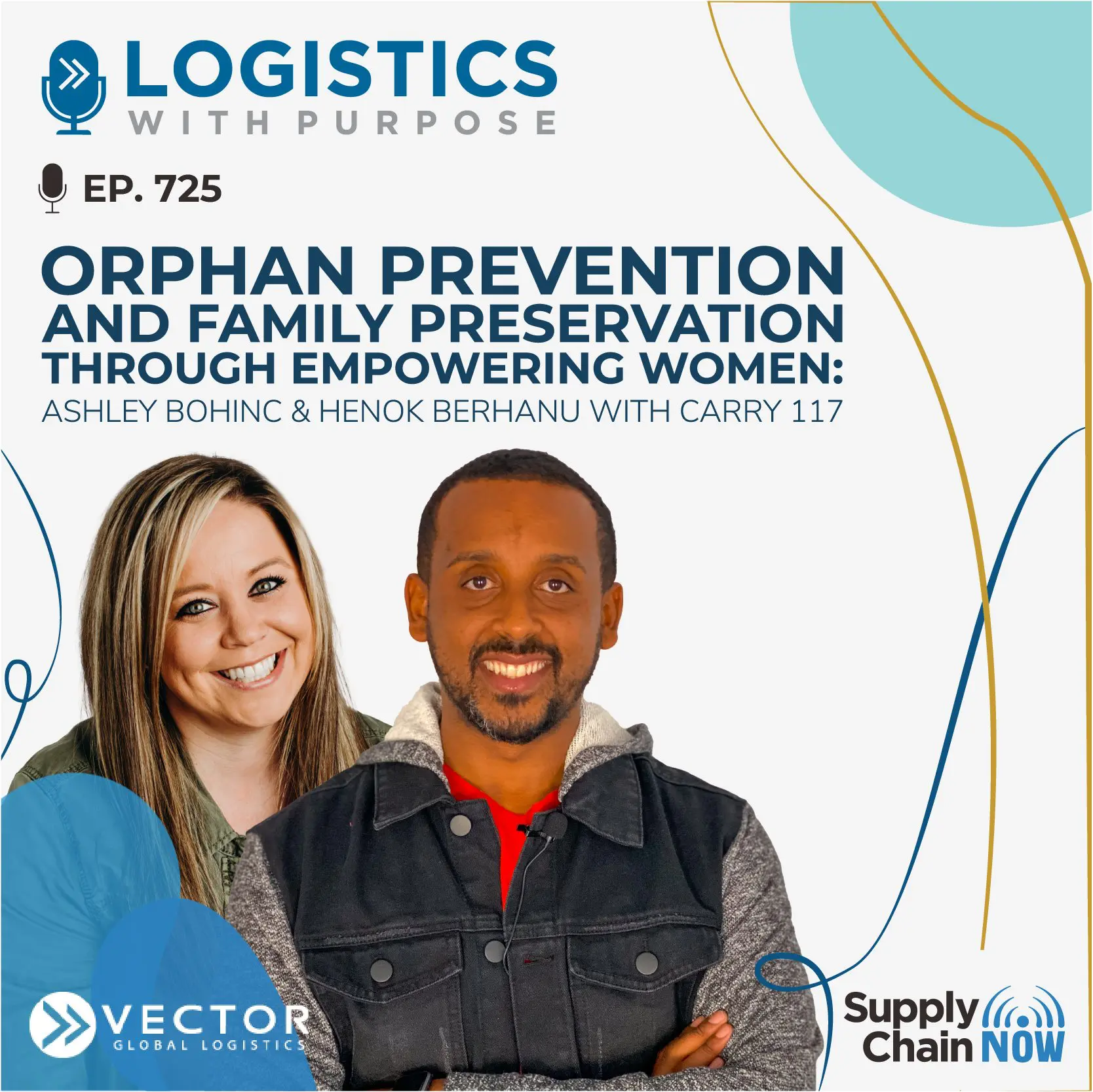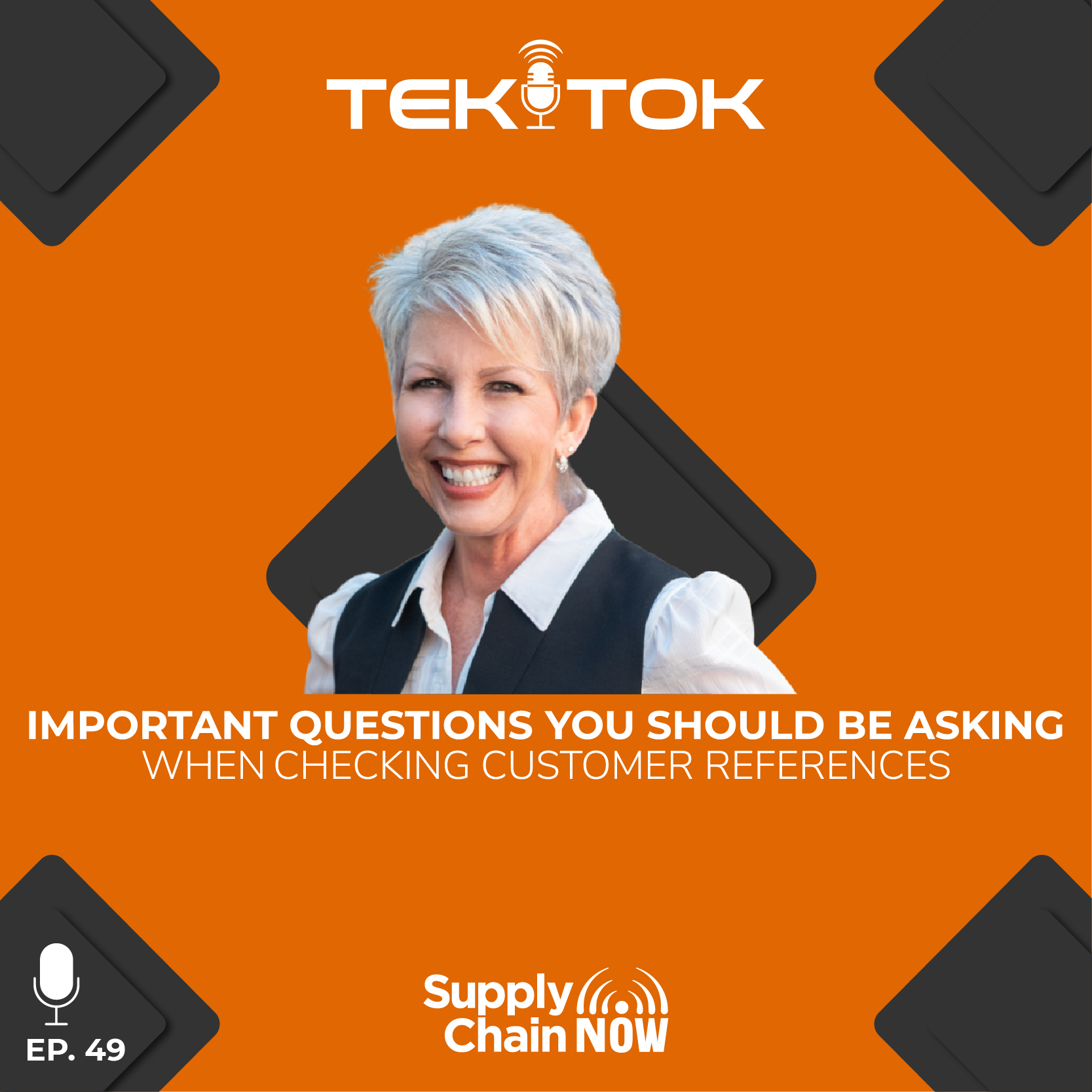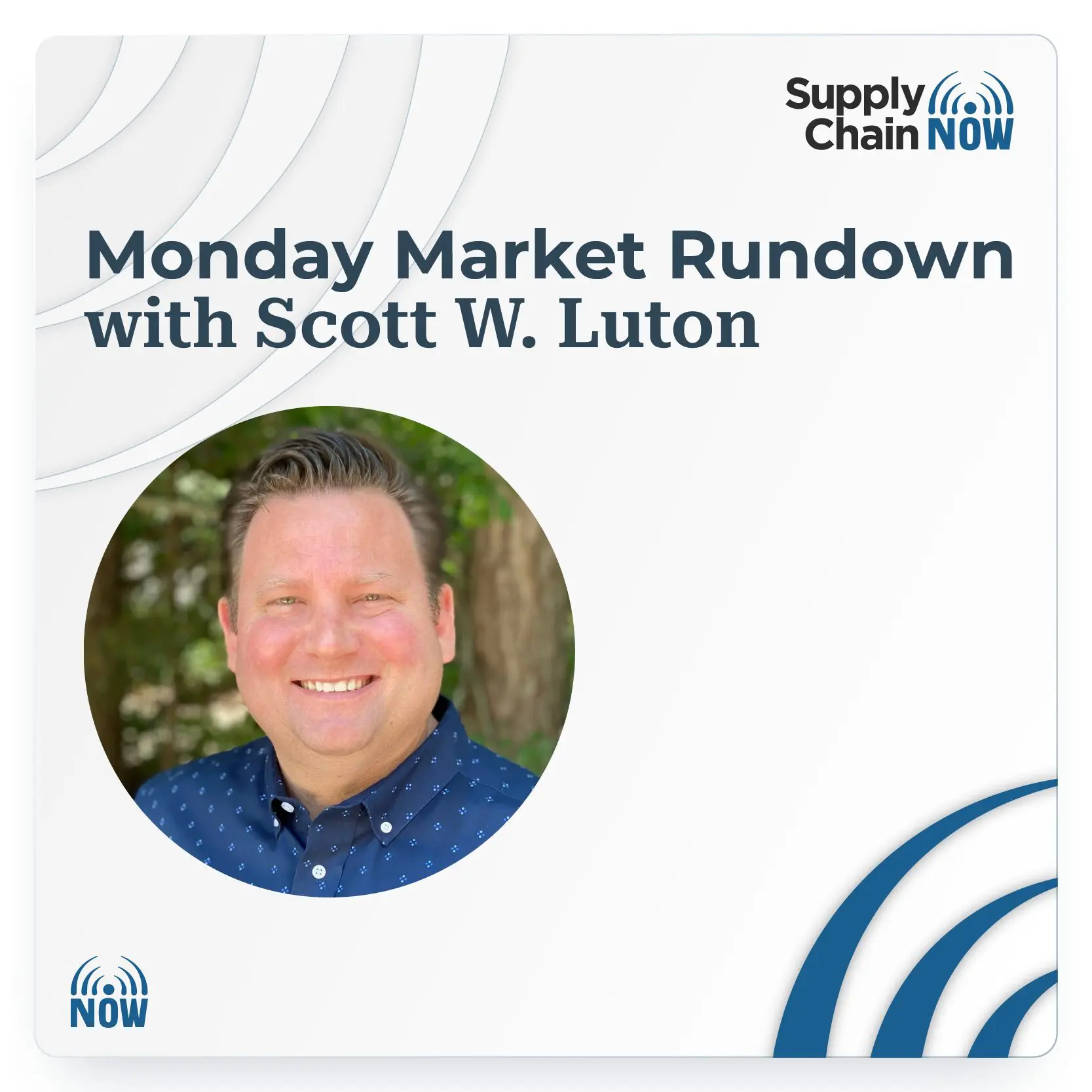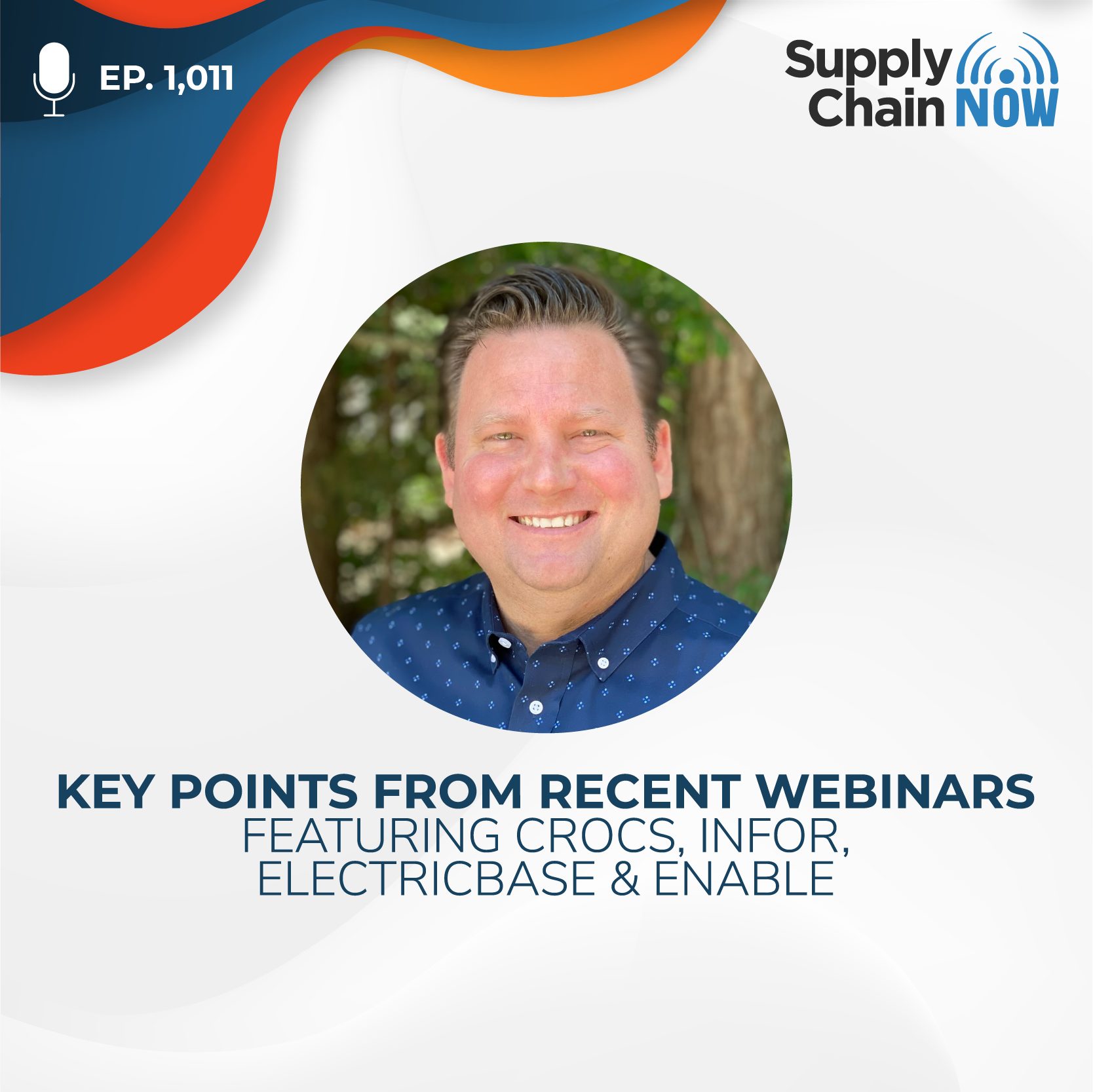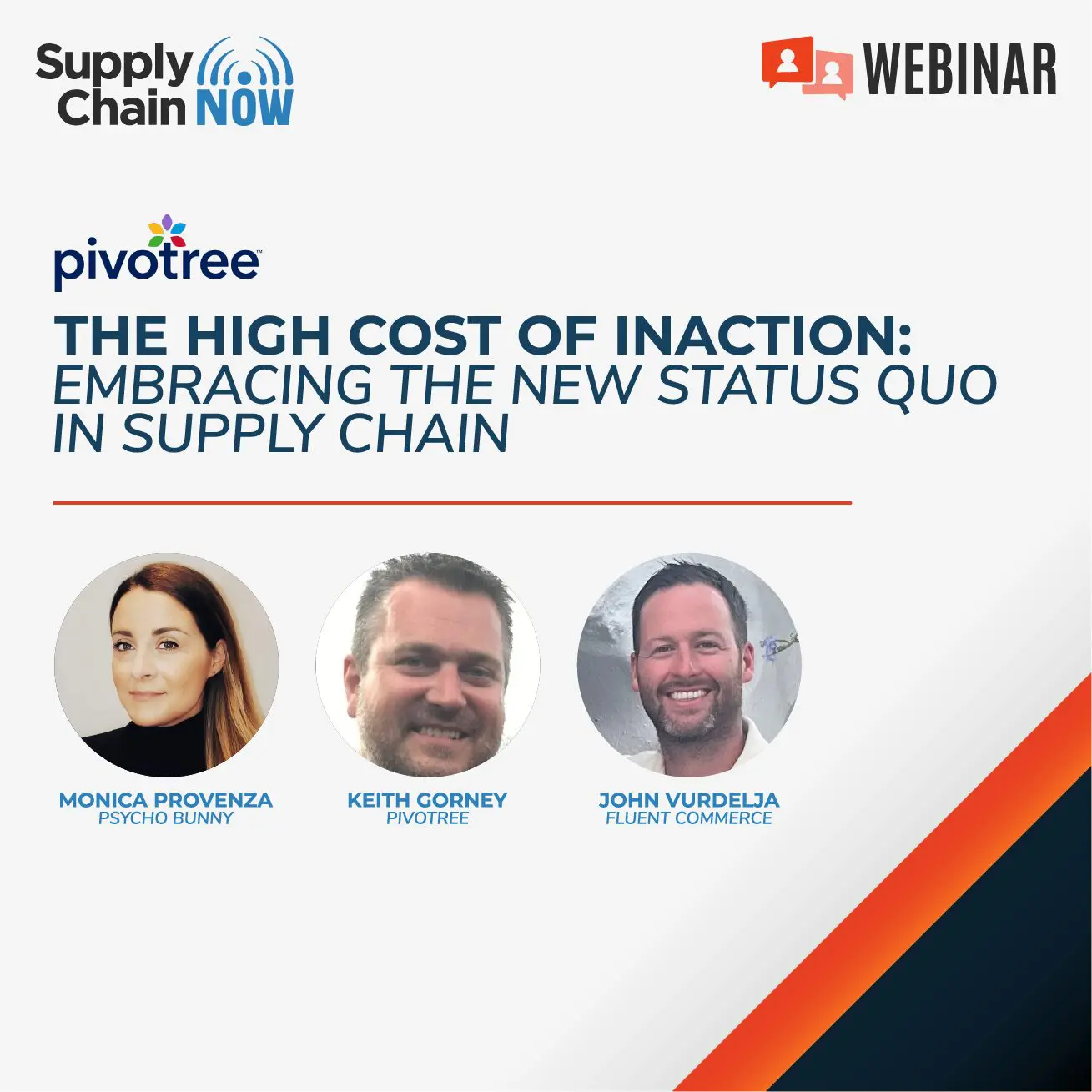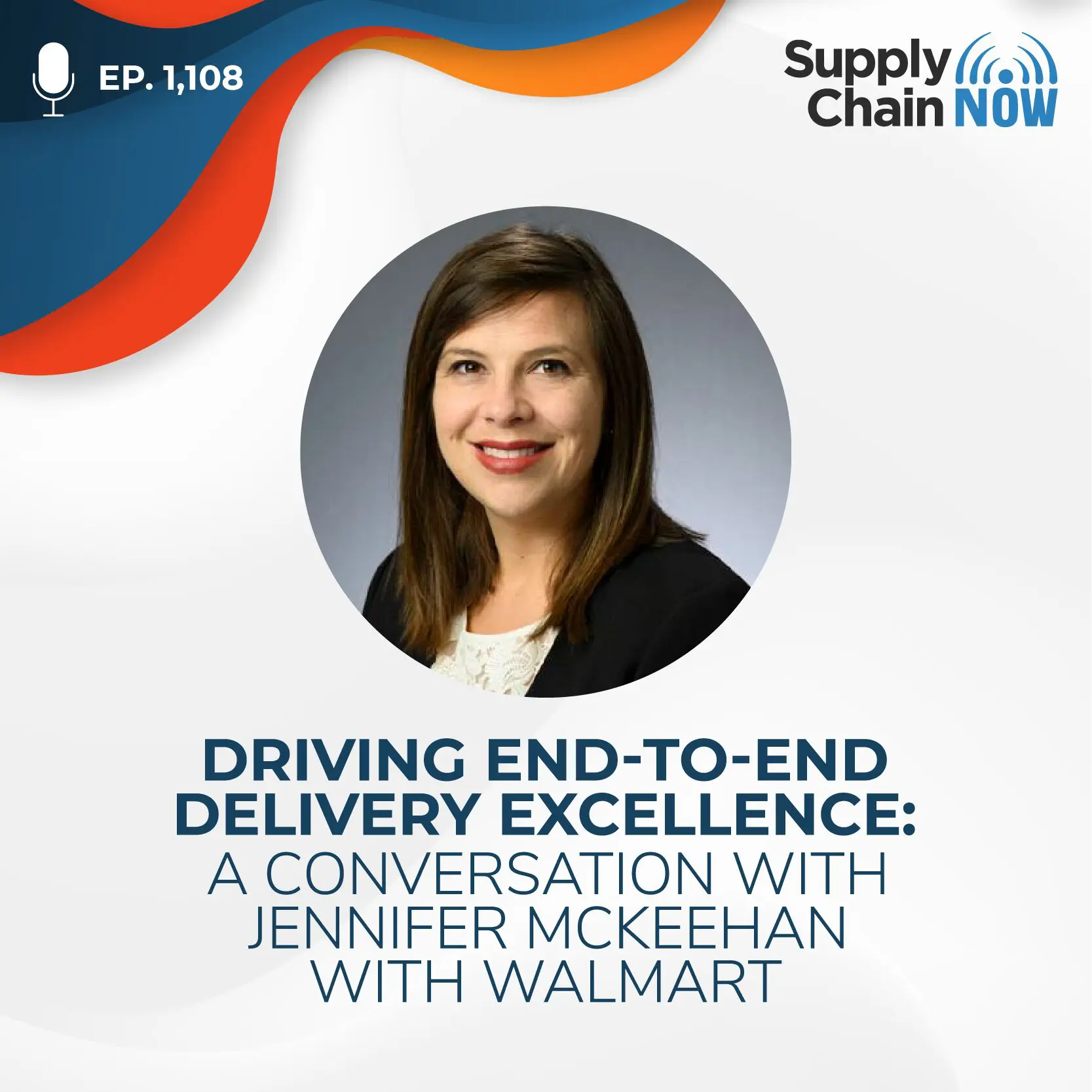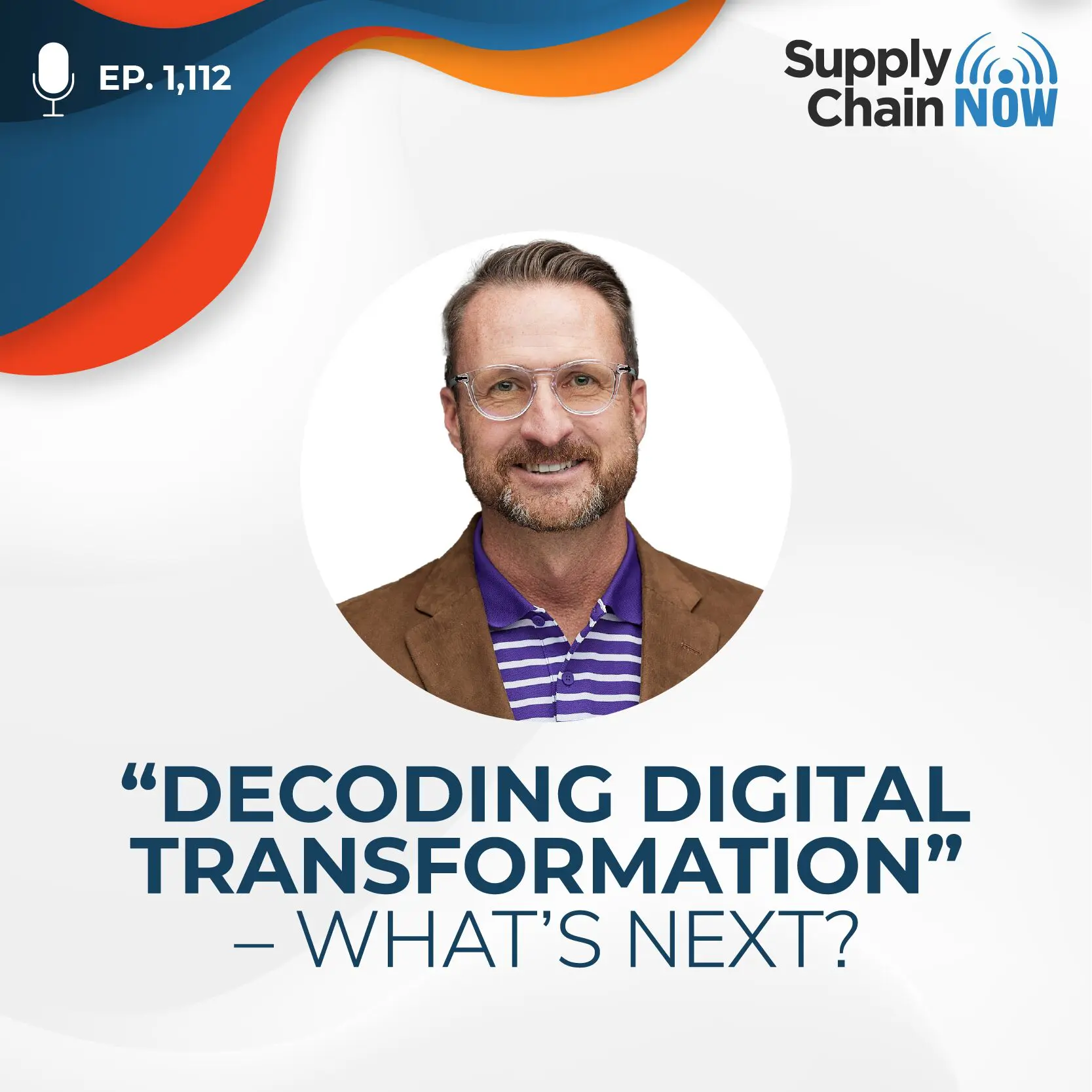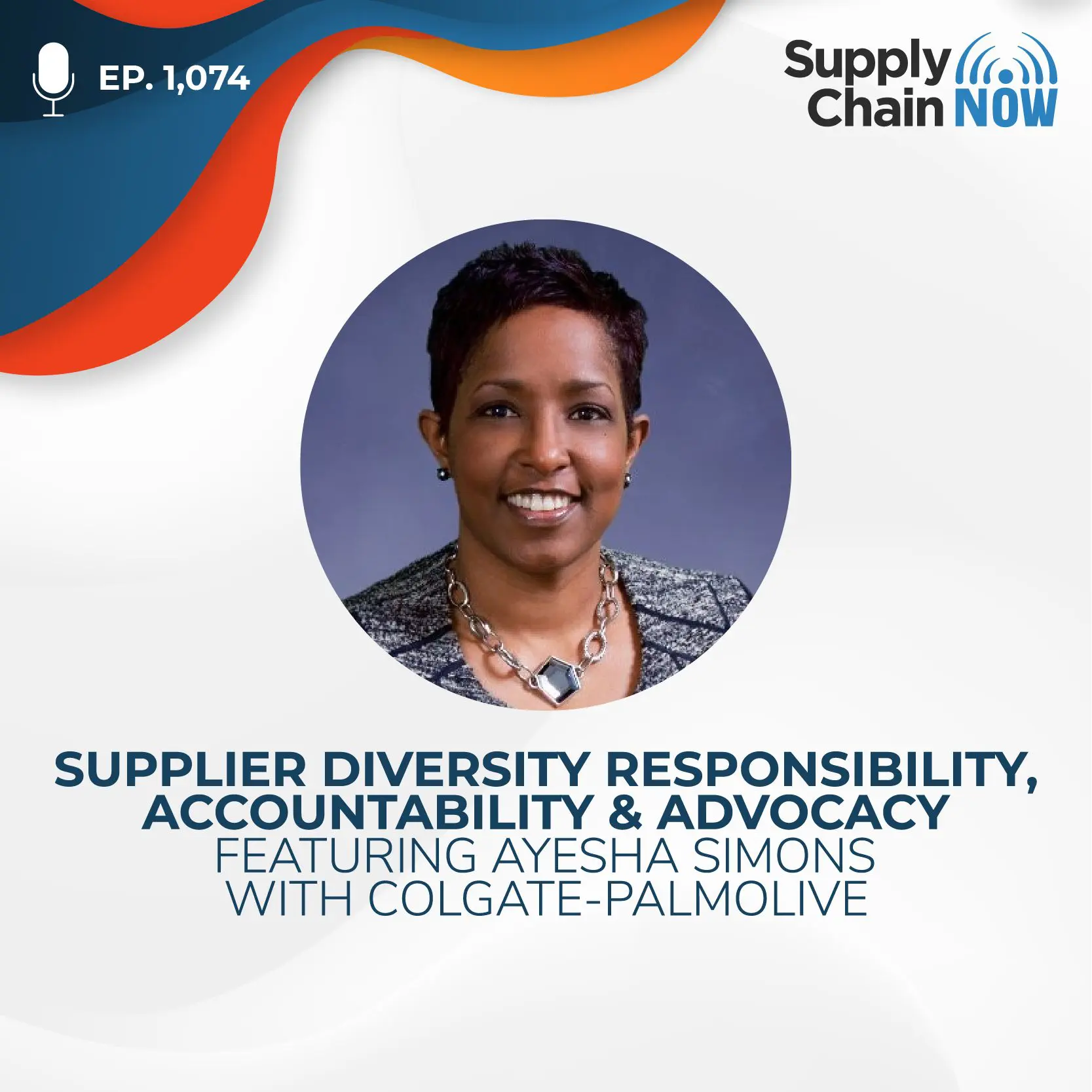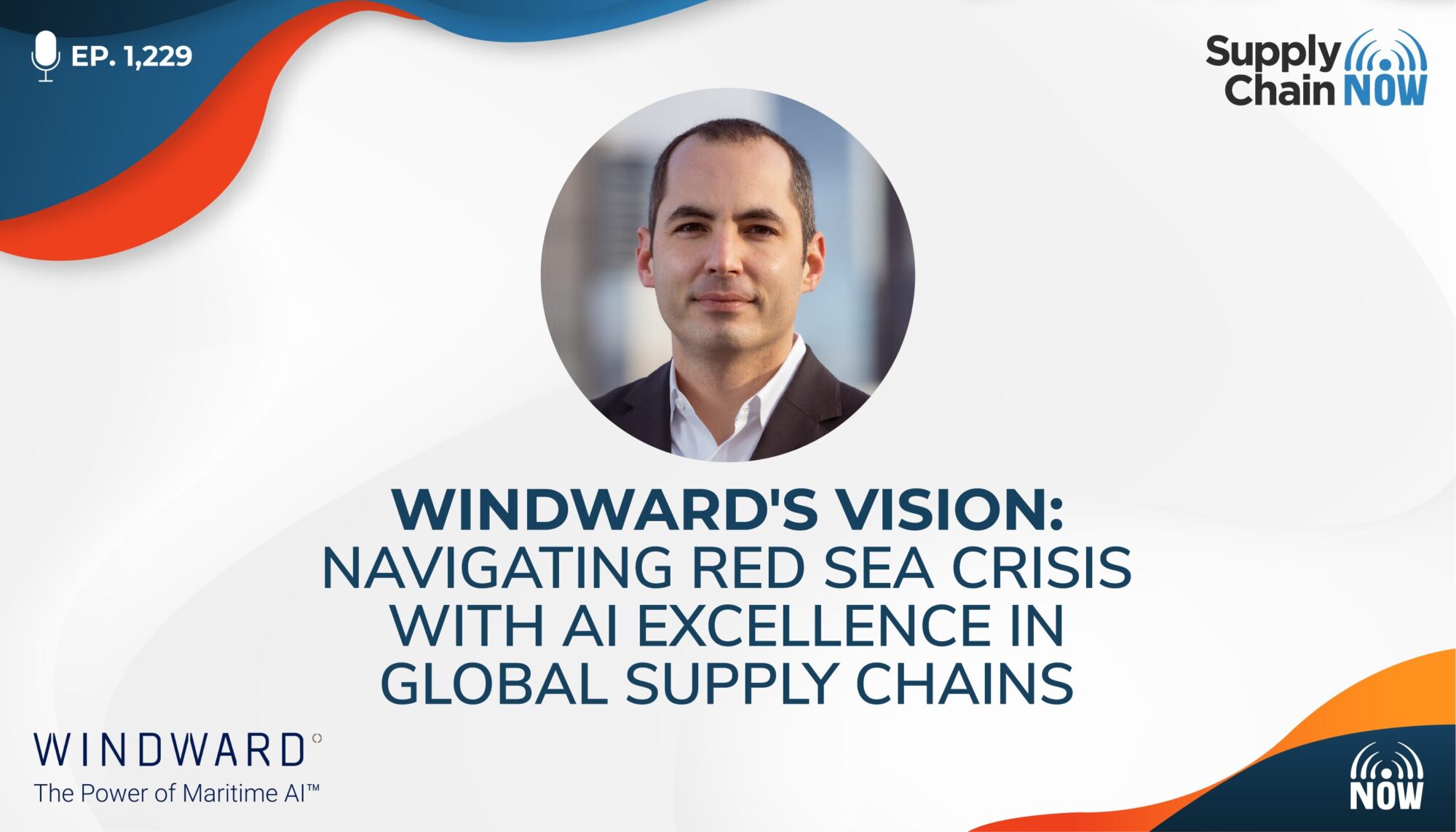
I am not pure AI believer. I don't think Ai is the holy grail that's going to solve all your problems. I think a hybrid approach is probably the best one. Humans and AI compliment themselves together.
-Ami Daniel
Episode Summary
2024 has begun with tremendous challenges for the global supply chain, as the ongoing Red Sea crisis and the Panama Canal drought continue to escalate, impacting multiple key stakeholders. In this episode of Supply Chain Now, join hosts Scott Luton and Kevin L. Jackson as they welcome Windward’s Co-Founder and CEO, Ami Daniel to the show, for an in-depth exploration of the current technology-driven supply chain landscape.
Tune in and discover:
- How the transformative roles of AI and digitalization, including the use of Gen AI, can effectively manage ocean supply chains, even during these uncertain times
- Why Windward’s platform goes beyond standard visibility solutions, enabling its customers to manage by exception for efficient disruption management in the ocean logistics space
- Practical applications of AI for streamlined logistics management for navigating unpredictable hurdles
Episode Transcript
Scott Luton (00:17):
Hey, good morning, good afternoon, good evening, wherever you are, Scott Luton and Kevin L. Jackson with you here on Supply Chain. Now, welcome to today’s live stream, Kevin. How you doing? My friend?
Kevin L. Jackson (00:28):
Then you say, wherever you are,
Scott Luton (00:30):
Wherever you may
Kevin L. Jackson (00:31):
Be, I’m in rainy San Antonio, Texas. Can you believe that it’s raining down here?
Scott Luton (00:40):
That never happens. But what always happens is Kevin’s on the move, he’s across the globe. He’s a rock and roll star, and you’re time traveling today. I bet you’re at least an hour behind us and you’re using in front of us, Kevin.
Kevin L. Jackson (00:53):
Yep. Hour behind you. But I had TexMex last night, so,
Scott Luton (01:00):
So you’re a little bit sluggish today, perhaps.
Kevin L. Jackson (01:02):
No, but if I didn’t in the right position, I’ll get some jet power and maybe I can catch up to you.
Scott Luton (01:09):
Hey, it all takes global supply chain moving forward, and that’s kind of what we’re talking about today. The segue to a lighter topic. Hey, we’re talking about tracking the ongoing Red Seas crisis, how it’s impacting global supply chains. A lot of things are unsure, but one thing is for sure, ongoing disruption is the name of the game. Now, Kevin, in order to better deal with that guaranteed disruption, we’re going to be talking today about the power of real digital transformation, including innovative use of artificial intelligence to especially optimize ocean supply chain management. And Kevin, much like you, we’ve got a great mover and shaker joining us today. Should be a great show, right?
Kevin L. Jackson (01:51):
Yeah, that’s sort of brings some memories back to me because you’re going to talk about me now, remember the tanker war when I was in the Navy going to tanker war and I was on USS America and we were in the Gulf and we were actually monitoring the oceans. We’re taking pictures of the tankers that got extra sets into the side of them, looking at the mavericks, blowing up the tankers, and it is sort of like the same thing that’s going on today, right? I mean years later. So it’s sort of nostalgic, but it’s criticals even more critical today that freedom of the seas is important to us. All
Scott Luton (02:36):
Well said, and disruption continues. There’s another story that it illustrates there. Alright, so we’re about to bring on our outstanding guests here. Before we do, I want to say hello to Andre and Giorgios and a, Amanda and Catherine, all the other folks that have joined us around the world. Also, if y’all enjoy today’s show, be sure to share it with a friend or your network. They’ll be glad that you did. Alright, Kevin, we buckled up, ready to go. We got to get to work. Want to welcome in? Yes sir. Our featured guest, AMI Daniel, co-founder and CEO of Winward. Hey. Hey Ami, how you doing?
Ami Daniel (03:15):
I’m doing well. I’m here with a digital transformer and a fellow Navy guy, so couldn’t be better. I feel like a fish in the water, if you will.
Scott Luton (03:24):
Well,
Kevin L. Jackson (03:25):
Digital transformers connect
Ami Daniel (03:27):
Both bump
Scott Luton (03:30):
Bump. I’ll tell you what, we need to wire both of y’all to the electrical power grid. The whole globe will have plenty of energy for days on end. Hey, alright, we got a lot to get into, but if y’all can’t tell all of our audience out there across the globe, we might just have a little bit of personality on today’s panel. So let’s illustrate some of that. Ami, is that you?
Ami Daniel (03:52):
Is that you
Scott Luton (03:52):
That’s going to be,
Ami Daniel (03:53):
Are you talking about yourself? It’s very asce. I can’t, anyway, please
Scott Luton (03:57):
Go on. So I want to start with a fun little warmup question. So today is officially recognized as beer can appreciation day. Now, as the myth goes, it might be a myth, it might be a fact. Who know? It’s reportedly meant to celebrate January 24th, 1935 when beer was first sold in a can at a brewery in New Jersey of all places. So I want to use that to ask you both. There’ll be parades everywhere. Folks will be celebrating a happy hour today. What is one of your favorite beers or adult beverages? And Ami, I want to start with you.
Ami Daniel (04:30):
I like beer. I’m sorry, I only drinks if they have an umbrella in them and the pinker they are the better. So I know it doesn’t make me very formidable, especially not with a digital transformer here next to me, but I’m happy to celebrate the appreciation there while drinking a pink cocktail on the beach with the umbrella dipping it.
Scott Luton (04:54):
I love it. I love the image you’re painting there. All right, so Kevin, that’s going to be tough to top your favorite beer or adult beverage.
Kevin L. Jackson (05:02):
You know what? I used to like him, right? Okay. You know why I like him? Because he was in the Navy, he was in those lady. I got a story about that, by the way. And when I was in Haifa, coming in Dead Sea. But anyway,
Ami Daniel (05:13):
I was born in Haifa by the way I was born. Of course, I was trained to the Navy while riding on the beach in Haifa and all the American ships came into Haifa was great. I love it.
Kevin L. Jackson (05:23):
But if you’re in the Navy, then when it comes to beer, I’m not a big beer drinker either, but the one beer I do drink is San Miguel or San Mago from the Philippines.
Scott Luton (05:34):
Okay, man,
Ami Daniel (05:35):
Actually, I actually know the family. That’s number one. Number two, I have a good story for you. Two good stories, one, and one of them is segue to first supply chains, and Scott’s going to love that. So number one, here’s a challenge for you, Kevin. Corona beer. Okay?
Kevin L. Jackson (05:50):
Yeah.
Ami Daniel (05:52):
Where do they drink them? With a lemon and where? Without lemon.
Scott Luton (05:55):
Interesting.
Kevin L. Jackson (05:57):
That’s interesting.
Scott Luton (05:58):
All right, you got to give us the answer Ami. Okay,
Ami Daniel (06:01):
Outside of Mexico, they drink it with a lemon because that’s their marketing in Mexico, they don’t actually put the lemon in. They don’t
Kevin L. Jackson (06:06):
Drink it with lemon. Yeah,
Ami Daniel (06:07):
Well, hey, no, they just drink Corona beer.
Kevin L. Jackson (06:10):
Well, I don’t remember St. Snoop dog having a lemon in his Corona.
Ami Daniel (06:14):
But the perfect segue is that if you think about how Corona is being made, and it’s a perfect segue for supply chain is a BI and Bev make them, and they’re the biggest beer manufacturer in the world. So if you think of the beer operation globally, it’s cross continents, raw materials, it’s finished products, it’s distribution, it’s supply chain. Now my friends
Scott Luton (06:33):
Agreed, agreed. And so Ami, before we make that segue though, we’ve got some folks in the audience that you know want to weigh in. Andre’s back with us, Stella, our toy, and he says perhaps he’s being a bit puby with that selection we have See Ham, great to see you see him. Heineken, she’s a big fan of that. Dr. Carsten Molts. Canned beer is awful. They say Greetings from the center of beer brewers in Bavaria, Germany. How about that?
Ami Daniel (06:59):
Okay, that’s good.
Scott Luton (07:00):
And Sarah says, in Canada, we add Grenadine to the Corona and Lemon. How about that? Wait, great. Have,
Kevin L. Jackson (07:06):
Well, they know that I need to add something though. It’s a very close second to San Miguel. It’s the cherry beer in Belgium Creek Beer. It doesn’t
Ami Daniel (07:16):
Come. I have it. Okay. I had it. My mother-in-Law loves them. Do you love them as well?
Kevin L. Jackson (07:21):
Yes, I love them. Yeah,
Scott Luton (07:23):
I’ll roll with with, and by the way, I got to add little, little mention of New Castle, new Newcastle is delicious and that is a great beer. Alright, so Amee, we’re going to go with that segue. It is a perfect segue, right? I think for a couple reasons because of the massive global supply chain behind our favorite beverages, but also it brings people together and goodness knows we need a lot of that here today. And really this conversation I think is going to be a very positive, informative, and innovative based on what you are doing as well as ways we can do business differently. But before we get there, right, before we get there, context is important. So Ami, you and the Winward team have been on the move in recent years. For the three people out there that may not be familiar with you, briefly tell us what Windward does. Okay,
Ami Daniel (08:13):
Sure. Hi, I’m Iani, co-founder Windward. We’re shipping AI company, so we observe all the ships, all the cargoes, all the companies and all the vessels in the world, the 24 7. And we help you take better decisions which make you reduce your risk or make your money. We work with about 200 customers globally, blue chip ones. The US government is actually our biggest customer. We’re very proud to make an impact on the world. So we touch everything that floats basically, not just containers. So when somebody says supply chain now they usually think containers, but actually supply chain now is even more than containers. Some of them are raw materials, something goes containers. So to get ahold of that with 90% of the world’s transport, cargo, transport through the sea, you probably need to look at everything. So who we are.
Scott Luton (08:56):
Love that. My follow up question before I get Kevin to weigh in on what y’all do and your background, because your background is fascinating. Kevin gave you up a little bit on the front end of our conversation, but Ami seven years in the Israeli navy and tell us a little more about your background. Yeah,
Ami Daniel (09:13):
Actually I’m a social entrepreneur originally. So when I was 16 I built a community center. I raised about a million bucks for that and it’s still working and still happening. A lot of people, like 800 people in my hometown in Haifa, by the way, Kevin. So just across the sea, it’s called the aisle of the sea, that’s the neighborhood in Shona, if you remember that place. Very nice place. And then I joined the Navy. My ship got hit from a missile 2006 July 14th, 8:42 PM So just off Lebanon, so I know it’s exactly the same missiles by the way, they’re shooting in the Red Sea right now. So I know that missile from the wrong end, if you will. And that same day, actually that same minute actually general cargo vessel got hit and drowned just I think three clicks north of us. So I think it’s interesting to be here now because from many, many perspectives from a supply chain perspective, tanker perspective, compliance perspective, trading perspective, security perspective, it all converged in the last month to a single topic that probably influences everybody listening to this conversation.
Scott Luton (10:16):
Agreed, agreed. So Kevin, I’ll get you to weigh in, but before you do what I love AMI and the little bit you shared, and there’s so much more, a lot of ventures you’ve been a part of and initiatives, but from what I can tell from doing my homework, the common thread there is you’ve been, it’s like you were born to make the world a better place. And I really, really appreciate that genuine component of who you are. Kevin, weigh in on just the experiences he shared there.
Kevin L. Jackson (10:42):
Well first of all, Hyer is a beautiful city. I love Hyer. I’ll spend some time there in Israel. I did a half century bike, I went to Boada. I went to go float in the Dead Sea. That was great. I loved it. Spent some time with the Israeli Navy and it gave me a good time. I enjoyed that. That was fun. Wow, great time.
Ami Daniel (11:03):
I just got an image of Kevin floating in the Dead Sea right now. I think I’m not going to sleep for three days now.
Kevin L. Jackson (11:13):
Get a big belly. You can float anywhere.
Scott Luton (11:16):
Alright, we got a lot to get it. Y’all are quite the one who punch today. As I shared in the pre-show. I should have brought a lasso today. You got to keep your
Kevin L. Jackson (11:24):
Conversation.
Ami Daniel (11:25):
I’m sorry. I’m
Kevin L. Jackson (11:25):
Sorry. You just can’t control us.
Scott Luton (11:27):
That’s tough. Some days are tough than others. But Ami, I want to get into more and more of what you see, what you are doing, the opportunities that are out there again to do global supply chain and really global business better. I want to start by a little bit more context. You and the team work with business leaders around the globe that many of ’em are navigate in today’s complex uncertain environment in supply chain or otherwise, but especially in ocean freight. So if you could start with a few observations in terms of what’s going on in the current business landscape in ocean shipping, please Ami.
Ami Daniel (12:00):
Yeah, I think first of all, I think it’s a bit of aha moment, what happened last month and a half. Obviously I’m meeting a lot of business leaders around the world, c-level execs, VPs and so forth. CEOs of big forwarders, heads of logistics are big BCOs tanker operators. We work with three oil majors. I basically spend more than half my time with them and post covid, a lot of people thought I would say even they discounted covid because they said, oh, the supply chain mes, that was once in a lifetime. That’s not coming back anymore. Okay, that’s done. Freight race jumped off a cliff, everything was smooth sailing. People were thinking, whoa, there’s the quick demand. Maybe the world economy isn’t what it is. And I think that’s where the last few months are a bit of a black swan because it’s an aha moment.
(12:48):
Even an epiphany that says today’s world probably the pace has doubled or tripled. So there’s always going to be something happening. It’s either the Panama Canal, then there’s the Red Sea. Who knows what’s going to happen with China and Taiwan if you listen to President Biden and to candidate Trump and candidate Haley, I guess. And if you listen to what they say for a while for now on China and Taiwan and who knows what’s going to happen with the hormone straits where you mentioned the Iran Iraq war. So I think the world is a very volatile place. So first of all, there’s an aha moment. That’s number one. Number two, I think preparation is super important. What I’ve seen is that our customers who took a long-term view of their business, which means well we need to digitalize, we need to be more efficient, we need to create more revenue brought in technology worked on the digital transformation, if you will, Kevin, of their processes actually excelled when the Red Sea happened.
(13:46):
Whereas the people who were on the sidelines a bit saying, listen, we’re going to think about it. We’re going to maybe going to save a hundred thousand dollars. What are we going to do? We have all these people, they need to do this. Their customers are not happy now and they’re stakeholders not happy now because they get 450 emails a day on what’s happening. So I think that’s that aha moment. That’s number one. I think number two, geopolitical tension has become a real driving force. So if you think of the driving force of the world right now, you think about the climate crisis. Panama Canal, right? Covid by the way is climate, crisis, crisis probably. You think of geopolitical tensions, think Red Sea, think Iran, Iraq, think Jch, China, Taiwan. That’s number two. And number three, I would just say derivatives of these two. And I’ll give you an example.
(14:33):
A couple of days ago a tinker, which was tensioned by the us, blocked the bus for straits for a day. So the reason they did it is probably because of geopolitical tensions and they wanted to punish that. So these are the big drivers and I think business leaders, I think it’s in the name leaders, and I’d like to Andy Grove’s famous book, only the Paranoid Survive. If you believe that only the paranoid survives in a world that moves so fast, you probably need to lean in and be also a deep thinker and partner with deep thinkers, which is hopefully why I’m speaking to you guys.
Kevin L. Jackson (15:07):
No, that’s amazing,
Scott Luton (15:09):
Kevin. That’s quite a list. We could do probably a series per item that amid dropped there, but respond to those observations, Kevin.
Kevin L. Jackson (15:17):
People don’t realize that we had Iran and Pakistan exchange ICBMs not long ago. And one thing I like to get Amee comments on is that also I guess a few weeks ago, maybe a month, there were shippers that actually suspended their operations in the region because of the attacks by the Houthis there. To me it looked like a failure because for some reason people no longer trusted the world to protect these waterways. The insurance companies apparently refuse to start covering, and I don’t, in my memory, I don’t remember that ever happening before. Am I missing something? What was the failure there?
Ami Daniel (16:15):
I think first of all, I think trust is a strange thing because it’s intangible, right? And the business community and the free market goes after the trust. I’d like to harp on that, I’m sure you’ve heard of it, but Ukraine attacked with drones, Russian export terminal oil export terminal a couple days ago. And my view is that they’ve actually seen how much of a mess and attention the hoodies are doing and they’re getting attention at global scale. So think of it with a hundred thousand bucks of drones, you can get an attention, which with a 10 million bucks of budget, you’re not going to get. And I think that view of getting something on the world agenda is quite interesting. And I agree. I’ve seen, I think by the way, president Biden stepped up as well as Prime Minister Sun from UK and they’re trying to verify and make sure people keep on trading there. However, when trust will go back, it’s a good question. And insurance by the way, just to pass through that area is between one and 3 million bucks a passage. So I’m not sure it is a clear cut anymore to pass through the sweats canal versus go around.
Scott Luton (17:18):
So Ami and Kevin, I want to shift gears a bit. I want to get more into some of the ways that we’re changing the game to respond to all of this stressful, harmful, disruptive landscape that’s out there. Before I do though, Seaham says, time for all supply chain functions to work together. It’s not just about you. I love that. See him and Andre. Okay, the more the world becomes paranoid, the shorter supply chains become not always good. Since cooperation and trust, as AMI said is the way to go. And I love that book by the way. Everybody take that note. AMI mentioned only the paranoid Survive. Y’all check that out. Okay, so I want to shift over to artificial intelligence, Kevin and AMI folks. As we all know, AI has been around for a long, long time, but 2023 seemed to be certainly at least one of the golden years of ai. So Amit, if you would share a few thoughts about how you see AI playing a critical role in the modern like today’s supply chain.
Ami Daniel (18:22):
Sure. First of all, I got to say I try to read a lot and I think it’s important for deep thinking. So there’s a great book about this called The Coming Wave, which talks exactly about this. Who exactly tries to answer this question on supply chain but on the world? And he talks about the convergence of trends. So first of all, I got to say technology hasn’t been, I think we need to appreciate that hasn’t been a rockstar in supply chains. If you read Eric Johnson from Journal of Commerce from JOC, what he says is, listen guys, all this log tech thing, you promised us to change the world. You raised billions. What did we get? More CargoWise. More CargoWise. That’s what we got, right? Everybody’s buying CargoWise. So I think it’s part of the cycle. 2024 is really my view, the tipping point of AI in the enterprise.
(19:10):
And I’ll explain why Gen AI and AI in general does a few big things. Number one, it reduces the bar, it’s much easier to build something. We generated AI theoretically than traditional ai. That’s number one. Number two, it hyper educated the executives. According to McKinsey, 94% of the companies are going to invest more in AI in 24 than in 23. And 50% of the companies will have an AI driven supply chain by 2025, I believe. So the demand, the customer side wants to move from my experience, the problem is, which is what we’re going to talk about today. You don’t know where to move or how to move. They feel there’s a fomo. If I’m not going to do something with ai, my comparison is going to be better. This guy’s going to make more money. I’m reading a chat GPT in the news, I need to do something. But then when you get drilled down to what exactly do you want to do, which is that’s why Kevin’s very successful. They need people like Kevin, people like you guys. They need hopefully thoughtful partners like us to help them translate that FOMO and budget to an outcome. And I think that’s what we need to talk about today. How do you bridge FOMO to outcome? Because otherwise you just end up with another innovation project nobody likes
Scott Luton (20:25):
And waste and waste and waste. We got to get to outcomes and what you were alluding to, and we talked a lot earlier this week about, and Kevin, I know you subscribed to this too, making it easier on our team to achieve more and to be more confident in their decisions and be able to make better decisions faster, right? Kevin? Respond though to how AMI is painting picture of how AI’s already playing a role. Your thoughts Kevin?
Kevin L. Jackson (20:52):
So another flashback, cloud computing. All of these executives got on the plane, looked in the magazine and saw a cloud computing and they said, I don’t know what it is, but I want that. And they didn’t know how. Get me two. Yeah, me too. Get two
Ami Daniel (21:09):
Of these two clouds, give me two clouds.
Kevin L. Jackson (21:13):
One
Ami Daniel (21:13):
For the lady on there please.
Kevin L. Jackson (21:15):
They had no idea how to link it to a business model. They didn’t. No idea if it applied to their business model. The same thing is happening to ai. I just need to have ai. How does that affect, how does it support your process? How does it support your business model? What are you going to do with ai? They don’t care, they don’t know. But the worst part of it, same thing in cloud is they refuse to get the education they need to leverage it properly. There’s not enough education on how to apply AI to your business model and the intersections and in cloud what that led to was a big increase in investment and then huge amount of losses because they just bought cloud. The wrong
Scott Luton (22:08):
Outcomes. The wrong outcomes, Kevin and ami. Yeah, no outcomes. Alright, so we got a lot to get into and we’re only, we’re almost halfway there, AMI and Kevin and I want to take us into a very practical component of global supply chain management. That’s timeless, right? But before I do, I want to share just a couple of quick comment. Bill is still talking about some adult beverages. He says that, and Bill, great to see you in Savannah coffee moonshine here in sweet whiskey in South Carolina at a burnt church distillery. Okay, bill, love that. Hope to keep you in the okay, he’s
Ami Daniel (22:43):
A shareholder. He’s a shareholder. He’s
Scott Luton (22:44):
A shareholder. That’s right. Hey Neil, thanks for being here. Wherever you are and let know where you’re tuned in from. Dr. Alt says, AI has been one of the four top topics of this year’s world economic forum that recently was held in Davos that affects all areas of business, society and education. What a great point Janice loves. I think what AMI said earlier, you said translate fomo, fear of missing out to an outcome, a positive outcome. I’m with you there, Janice. Thanks for being here. Let us know where you’re tuned in from.
Kevin L. Jackson (23:13):
Before you go, you go Kevin, you’re talking about Bill, but Bill had mentioned Karen. Angelas right? I don’t want you to forget her. You didn’t talk about her. She’s in the Philippines. She yelled out about San Miguel. I used to live in Alanga PO and Manila and she knew she talk about San Miguel had Jerry beer or fruit flavored beer, whatever. That’s my girl right there.
Scott Luton (23:39):
Karen, great to have you here from the Philippines and thanks so much. Let us know. And folks all there are tuned in, let us know what you think about these really big topics that we’re talking about with Ami and Kevin here today. Okay, I want to talk about exception management, AMI and Kevin and managing exceptions is no doubt an inseparable aspect to the role of supply chain management practitioners everywhere since the dawn of time, as I was saying a minute ago. But that critical responsibility is truly evolving and in many ways, while the challenges and the scenarios and all the different factors are going up, our ability to better lead manage exceptions and everything else is right at our fingertips in many ways. So I want to do this though amid to make sure our whole audience is with us right from around the world. Let’s define exception management first as it applies to shipping.
Ami Daniel (24:36):
Sure. Exception management is how do I find things that are not on the happy path very simply, some people, BCOs by the way tend to call it critical events management. And if you think about the last couple of years, visibility emerges with something. Visibility is the very basic thing, right? I know where stuff is, but that in some way, shape or form kind of overloads more the operators because now they have more data, they need to figure things out in a different way. Exception management is making the product work for the operator and tells ’em, listen, great, you know where stuff is. That’s great, that’s amazing, but how about we float the top five things for you? You’re handing these top 10 shipments coming into these ports. Look at these top 10, don’t focus on these 1000. So it’s focus, focus, focus. It needs to be actionable, it needs to be interpretable. So you don’t want to just say there’s an exception. You want to say what is the exception? Why is the exception and why am I supposed to do about it? Timely example, red Sea,
(25:40):
Some of the CMA CGM vessels still through the Red Sea, some of them don’t. The Maersk US flagged vessels still through the Red Sea because the US Navy provides escorts, but some of them don’t. So you can’t go around looking at the websites all day on the schedules and stuff like that. You kind of need exception. We rolled out an exception called root deviation that says this specific container is being deviated around the Cape of Good Hope and it’s affected. Well this one isn’t. So that’s a very tangible example of an exception. Does that make sense, Scott?
Scott Luton (26:11):
Yeah, it sure does. Kevin, your quick thoughts before I move to my next question for ami?
Kevin L. Jackson (26:16):
Well, when I think about exceptions, one of the things, I mean you mentioned you have to be smart about it, specific, measurable and so forth. What about leveraging exceptions with your partners? As things change, I mean no one operates as an island, especially in the supply web because it’s not a chain. How do you leverage this exception manage exception view with your extended ecosystem? Yeah,
Ami Daniel (26:52):
I think it’s a great question. I think first of all, you need to communicate in a different way. I’m not sure if people want 10,000 more emails working,
Scott Luton (27:01):
Don’t sign me up. Please.
Ami Daniel (27:03):
Do you want Scott 10,000 more emails I can get you. Anyway, I think what’s been working for our customers, I do
Kevin L. Jackson (27:07):
The same thing. I don’t read that first 2000 thousand or whatever.
Ami Daniel (27:13):
I’ve been emailing Scott all week, he hasn’t been responding. But I think what’s been working well to our customers is visual communication. So it’s a shareable link which they can share on any shipment, on any vessel, any port, any cargo, just between them. So you can operate on your mobile, you walk in the street and therefore I think it reduces the amount of tension, it increases communication. They say pictures worth a thousand words. I say dynamic link is probably worth a million.
Scott Luton (27:40):
Yes, I’m with you. And you know what, that’s a great foreshadowing question because that’s where we’re headed Similarly, where we’re headed next with ami,
Ami Daniel (27:47):
It’s a great word foreshadowing by the way. It’s a great word. You’re up there. The queen of England is right now waving at to say foreshadowing question,
Scott Luton (27:58):
We’re expanding our
Ami Daniel (27:59):
Vocabulary. This bring to me the king bring to me
Scott Luton (28:03):
Before though Tim Ingram is with us. Tim, great to see you. Exception management is critical. The focus Tim says should be to prevent exceptions versus reactions to them. Great comment there Tim. Great to see you. It’s been too long. And then Sarah’s reading our mind. Sarah says, Hey, can we get some specific examples of how AI is being used by customers for supply chain? Sarah, you’re here in the right place because our next question for AMI is kind of a great follow up to what Kevin was just asking and what AMI was just answering. How is when the rubber meets the road, how is innovative modern technology truly shaping and empowering ami, our ability to manage exceptions a whole lot better? Or as Tim put it, even prevent ’em, your thoughts ami?
Ami Daniel (28:45):
Sure. I think there’s a few levels to it. First of all, I think AI is getting to supply chain planning and companies like O nine are doing it quite well. So it’s basically taking all your demand information, your supply information, trying to match them and go do that better. So that’s one example. We’re doing downstream supply chain. So it’s taking all of your shipments globally, whether it’s in containers or not in containers, a predicting when they’re going to arrive, which is quite hard, especially nowadays. And when I say predicting, it’s not really the ships, it’s also the containers because container might have 1, 2, 3 trans shipments, about half of the containers in the world get through trans shipments. You need to predict that. That’s one layer of ai. The second one is exceptions are also level of ai. So predicting you’re going to miss a transshipment predicting late allocation of a vessel, predicting a root deviation, predicting a skipped port, predicting the fact that the schedule doesn’t make sense.
(29:37):
So these are all examples of AI that I think can work for you. The next level, which we’ll talk about in a bit, I guess is also putting your data to work because many people want to source data and get more data, but I think they’re leaving on the floor or on the table their own data. So in our view, the last level of really AI is to take public and commercial data. The atoms, if you bid the movements and the atoms in the bit if you will, and connect it with the bits, the documents and files and information you have and marry them. I think that’s probably the holy grail. If you asked me 2024, that’s the tipping point again to getting there.
Scott Luton (30:16):
Well that’s where we’re going next 20, 24 and beyond really. But Kevin, I want to get your comments on what AMI said there and I want to do so, but with this preface way back in the day when big data became a term I don’t know that we were using regularly is like cliche, I’ll call it 15 years ago, maybe 20 years ago. The common refrain from a lot of folks was, okay, great, we spent all this money to gather all this data, but what are we going to do with it? Well now to Ames point, third point there, man, putting that wealth of data to work is a big advantage for practical effective users of artificial intelligence. Kevin, your thoughts on the little three point checklist that AMI just gave us?
Kevin L. Jackson (30:59):
I feel like I want to be a contrarian, right? Okay, so AMI was talking about the pandemic. I mean we’ve forgotten that that was so follow also last year.
Ami Daniel (31:14):
Remind me which pandemic, the Spanish,
Kevin L. Jackson (31:18):
Everything broke because we were using data from before to try to manage in a unique environment and you could no longer really predict because your environment wasn’t the past anymore. Correct. Now sounds like I’m afraid now we’re going to use AI to try to look at data, still try to look at data in the past to try to predict the future and AI may make mistakes also. Do we need to also look at the AI mistakes so that we can maybe predict better in the future? Or is the data in the past no longer valid because of all the change in every day? We actually have a new set of initial conditions. Yesterday they weren’t shooting rockets in the Red Sea. Today they are the next day you’re going to have ICBMs flying all over the place. So how do you balance all of this?
Ami Daniel (32:32):
So I think it’s a great point. By the way, I am actually not pure AI believer. I don’t think ai, that’s the holy grail that’s going to solve all your problems. Just sign up, you’ll be profitable. Profitable. Not at all. Actually I think a hybrid approach is probably the best one. Humans and AI compliment themselves together. I think you need to as a tech company, you need to deploy all the ways to solve problems. By the way, rule engines is one of them. Oh my god, I’m sorry to say that. ML is one of them. Unsupervised learning, supervised deep learning, LLMs, it’s all tools in your toolbox to solve the relevant problem. Actually, I think also if you listen well to the CTO of OpenAI Ilia, he says that you can’t actually trust LLMs completely. And I spoke to one of our customers today who’s trying to use co-pilot in their data and they asked the co-pilot something and the co-pilot on their business, on their business, and the co-pilot literally invented something completely wrong.
(33:37):
Okay, completely wrong on their business. So I don’t think it’s there yet. Maybe GPT five will be there, maybe GPT six will be there. I think you should think about a hybrid approach where you have a back office to validate it, but you still leverage ai. No binary outcome I think is a good one. Trust the computer, do what it says, not there yet. Ignore the computer, keep on with Scott’s handwritten notes to manage supply chains. That’s also not good because I think when you are not moving, all the rest of the world is moving and it’s moving quite fast. Always remember the CEO of Nokia, they were at the top, Kodak, they were at the top. Blockbuster, blockbuster, blockbuster, Kevin, blockbuster. I was working exactly Blockbuster. I was working, walking with my kids in Germany and they saw this strange thing, these Kodak round things and they’re saying black things would look like how is camera, maybe camera? And they’re like, dad, what is that? And I had to tell them all the story. It used to be cameras and Kodak films and all that story. So never forget that only the paranoid survive. I see Scott there has built to last. So if you want to be built to last, you probably need to move. Am I the first guest to paraphrase that, by the way,
Scott Luton (34:56):
You know what? You’re the first guest to notice that I swapped out that book just a couple days ago. So Ami, you don’t miss anything. Hey really quick, Kevin,
Kevin L. Jackson (35:03):
You one thing. So what I hear, let me say this is what he said. You can look at the weatherman or the weather woman and they’ll tell you what the American model says or what the European model says. And you can believe it, but you still need to look out the window.
Scott Luton (35:21):
That’s right.
Kevin L. Jackson (35:21):
That’s right. To know what the weather is. So correct.
Scott Luton (35:25):
I want to pull a broader point out of this and then we’re going to get back to talking tech and am I really appreciate what you said a minute ago that you’re not a hundred percent AI fixes everything and just rely on ai. That’s a great point and I want to bring in a couple of comments here. I think this is Thomas Dent, I believe Catherine and Amanda, help me out if you would, who says if you don’t have discipline, if the people don’t have discipline with the fundamentals, AI just exasperates the exceptions at scale and with more velocity. That’s such a great point. And Tim says AI doesn’t make mistakes people do regarding clean data versus dirty data and so on and so forth. So I want to ask you this, ami, when we come to a lot of folks will blame technology for various ills of the day, but perhaps an equal opportunity, if not a bigger opportunity we have is to focus on the people in our teams and make sure they understand the why, understand what we’re trying to do, what’s in it for them, make sure they have the training they need and know how to use this wealth of technology to do their job better.
(36:31):
Talk to that point if you would on me.
Ami Daniel (36:33):
Yeah, sure. I attended a Gartner conference, a supply chain conference in Barcelona in June I believe was speaking there. And I think it was one of the top three issues by Gartner, which is manpower specifically in supply chain. I think it’s quite a challenge. Many, many of the operations have been offshore. I heard India, I heard Philippines, I know a bit of Malaysia, but they’ve been offshore. And then you get these teams in Europe or the US that creates these processes, but these ops teams that are doing these processes in a completely different place. And I think it’s quite a challenge because if you want to get proper tech and proper AI into baking it properly, you need to build the processes for the people to translate the technology into better decisions. And actually AI today can really take decisions. So someone needs to pick up the phone and do something or send an email, do something.
(37:24):
But you can automate a lot of that. And let’s talk about three outcomes our customers get and want to get. Number one, better customer service. You should tell your customers, Hey, you’re going up against a big charge of the margin detention my friend. Okay, heads up, you’re going to have a couple hundred bucks extra on this container. Usually they tell you that after the fact, not ahead of the fact. That’s one win you can get. Make your customers understand where they’re going after or where they’re going into. Number two, increase your efficiency. You have hundreds of teams in the world buried in papers, in phone calls, checking websites. I think to retain them and to get more out of them, you need to look at what are the big chunks of their schedule. My chairman asked me to analyze my schedule and show it to him to get some feedback on am I using my time properly? So similarly, analyze the time of your team and see what are the big chunks are doing. And number three, do you have new revenue opportunities just out there that you’re not picking up? Again, the margin intention is a good example. I know business leaders who told me that there simply could charge more, but they’re not doing it because the team aren’t picking up that from the contracts. They’re just missing that because it’s too much. So better customer service, more efficiency, more revenue. Outcomes, outcomes, outcomes,
Scott Luton (38:44):
Outcomes, outcomes, outcomes. Hey Kevin, folks loved your weatherman quote Janice and Dr. Molts and others and me too. I’m going to steal that from you for sure. But Kevin, those three things. Better customer service, increased efficiency, new revenue opportunities, all can be gained by focusing on the people and the process as much as the technology. Your quick thoughts there Kevin?
Kevin L. Jackson (39:05):
So Amme, you have a scale and on one side of the scale you can put humans on the other side of the scale, you can put ai. Which way does the scale go?
Scott Luton (39:18):
Oh man,
Ami Daniel (39:21):
That’s a good question. I don’t think there’s one answer. That’s right. I think it’s different answer for every organization. Many ways to skin a cat, every business is different. I always tell my investors,
(39:35):
I always tell my investors, you’re publicly traded in London. So I get scrutinized all day long and I tell to our customers and to our board and to our team, different is better than better people without imagination look at their competitors and copy. And that’s a great form of flattery. I enjoy getting that flattery from our competitors. However, if you really want to build a growing viable business, you need to have your own business thesis and business strategy. And therefore there’s no right answer. Maybe for some operation it’s all manual because it’s like five friends and they know what they’re doing it, they have this telepathy. On the other hand, some maybe you have your expense base in a super expensive place like the US and you need to automate that because that’s your biggest bucket. I don’t think there’s one good answer. Agreed. Maybe good answer for you, not a good answer for everyone.
Scott Luton (40:21):
We need a couple four hours, Kevin and AMI to more fully explore all the various answers to that question. But I like that. Alright, for the sake of time, Kevin and ami, I want to get into this last big segment. Folks, we’ve got some resources that AMI and the Winward team brought here today. You’re not going to want to miss that. We’re going to make it really easy for you. We’re going to make sure we get you connected with Kevin and AMI here at the tail end. But before we get all there, I want to spend some time exploring your vision on me. I’ve got a two part question for you. I am fundamentally and firmly, what other adverbs can I add to unequivocally? Thank you unequivocally. I love that one
Kevin L. Jackson (40:59):
Standing.
Scott Luton (41:01):
Yes, I am an optimist and I believe that we can work through all of these challenges today and that our future is brighter because of that faith and optimism and confidence. My heart goes out tomorrow.
Ami Daniel (41:14):
Amen.
Scott Luton (41:15):
Right to that though, I want you to bring the ammunition that supports that claim. Two part question and the Kevin, I look forward to getting your thoughts on AM’s parts here. A few elements of your vision for the future of supply chain and going back to the power in particular of gen AI and how that’s going to shape not only the future, but today. Speak to us about your vision and where gen AI plays into it.
Ami Daniel (41:44):
I mentioned before, I think today we have two disparate worlds. We have the world of atoms moving around the world and we have world of bits moving in computers and they’re usually matched in hindsight. So you have hundreds of people looking at all the documents and going six to nine months after the fact and kind of matching that in. People don’t close p and ls and they don’t get things done and they chase them. And I think if you look at all the solutions in the world, they’re kind of trying to be plugs. And I think if you want to ask for vision, plug is not the right vision. I think connecting the worlds of atoms and bits, and I think unleashing or unlocking, you’ll unlock better customer service. You’ll unlock more revenue, will unlock more efficiency. The challenge is Scott, that to do that, you need that thing called leadership. And I think I would like to reference another book. I told you a book guide please. And that’s crossing the chasm. Did you read it? Yes. Yeah,
Kevin L. Jackson (42:39):
Way
Scott Luton (42:39):
Back in the day.
Ami Daniel (42:41):
Great. It’s way back then because it’s a classic, right? It’s a classic. So I think organizations would be wise also to read it and a sense where are they in crossing the chasm? Do they want to be the innovators? Do you want they to be the early adopters? Do you want to be the late majority, the early majority, the lags and so forth. And I think, I’m not sure a lot of executives at IIC take conscious decisions about that. You need to be deliberate because that drives a lot of your decisions. And when you do that, choose one or two or three main partners. Don’t spray and pray. Believe in somebody and be willing to fail because you have a journey to go. And I can tell you our partners choose us and I always look them in the eye before any big partner chooses us. I go there, I meet them or they come here and I looked at ’em in the eye and said, you know what? We got this. If something’s wrong, it’s on me. Okay. And it’s 2:00 AM pardon of my French. Should hits the fan sometimes. Should hits the fan. You got somewhere to call. They think it’s not Ghostbusters, by the way. No. So I think that’s part of it. Be deliberate. Cross the chasm, choose the right partner and connect Adams a bits. Does that make sense As a wrap up? Yeah,
Scott Luton (43:51):
I love it. I love it. Kevin, your thoughts on what AMI just walked us through.
Kevin L. Jackson (43:57):
I’m looking at the clock and I don’t want to stop this. This is so much fun. So I’m going to ask a question. I want to pick your brain on what you’re seeing in the future. I mean a lot of artificial intelligence is focused on a particular industry or particular function and it’s been very successful. Like you’re using AI in shipping, right? But you talk a lot about how geopolitics affects shipping. So how in the future will AI be used to examine the edge, the intersection between geopolitics and shipping or the intersection between shipping and air cargo? Because I think there’s a lot of value and history have shown that most value is found at the intersections of these processes. Does that make sense?
Ami Daniel (45:04):
Yeah, I think you’re absolutely correct. I think you need to look at three different levels of insight. I actually heard this from an admiral, a friend of ours, one a navy admiral. Obviously one is a tactical insight. So you could get where should I sail, where should I ship, where should I? That’s a tactical insight. I think most of the supply chain world right now is in tactical insights. The second is an economical insight, which means should I be near shoring? Should I be using this route or that route? And the third is the geopolitical insight, which is kind of high level. I think it’s very hard to connect the macro to the micro right now, but also many, many parameters that flow in. It’s like saying what influences the price of oil venue news, geopolitics, everything, whatever Trump says can influence the price of oil.
(45:51):
Twitter can influence the price of oil, right? Nobody really knows. So I agree with you. However, I think it’s way, it’s probably a GI can do that. So perhaps if Zuckerberg really develops an A GI or open ai, maybe a GI can put an artificial general intelligence can put all of that together and answer that question. But I think until that happens, I suspect the signals on the geopolitics side will be macro signals. Should I be nearshoring or should I not be nearshoring like that type? And I think we should focus on outcomes for 2024, but we can reap benefits because trust is hard to buy and easy to lose. That’s right. And if you want to get AI into a traditional area like supply chain, you need outcomes. Outcomes, outcomes, trust, trust, trust. Otherwise we’re all meet again in a year’s time. It’ll be a nice innovation project. And innovation doesn’t build big companies. It doesn’t reap a lot of benefits unless the business adopts it and does a digital transformation.
Kevin L. Jackson (46:51):
Thank you. I don’t think I want to call the a GI genie out outfit yet. No,
Ami Daniel (46:57):
Not yet. It’ll be a bit of an astel vista maybe to go to court another movie.
Scott Luton (47:05):
But to your question, you pose Kevin and AM’s wonderful answer I thought because there’s lots of answers to that question. I do believe we’ll always be surprised. Unfortunately in global supply chain, that’s the nature of what we do. But there’s less surprises, there’s better opportunities to plan because going back to what AMI shared early on in the conversation, research after research, the organizations leaders that really invest in preparing, and I hate to use a cliche, future-proofing organization. Those are the ones that are built to last but also can succeed in the terms as I think Gartner coined it. So we have the great opportunity to have and our teams to have far less surprises. Okay, Kevin?
Ami Daniel (47:48):
That’s a winning line.
Scott Luton (47:49):
That’s right. It’s a winning line. Okay, I’ll roll
Ami Daniel (47:52):
With winning line.
Scott Luton (47:54):
Hey, if we’ve got AMI and Kevin endorsing it, man, we can fool the world. But hey folks, and appreciate it. Y’all didn’t capture here today. Some of y’all that have seen me and Kevin’s earlier shows or even somewhere Greg’s with us too, you may know that Kevin’s call sign back in the Navy was Blaze, right? He’s got some great stories there. So in the pre-show here today, AMI ISS like, Hey, you know what, you’re going to give me a call sign here today. And you know what Ami, Sarah has delivered because a minute ago I asked you for ammunition to support something I was putting out there. Well, Sarah says, no, no, no, I’m
Ami Daniel (48:32):
I’m saying it wrong. Ammunition. Ammunition. All I love. That’s good one. Thank you. Going to put it down. I’m going to put it down. All right. Helmets on the helmet. No copyrighted, Sarah. That’s
Scott Luton (48:48):
Right. Do
Ami Daniel (48:49):
It now. It’s great to have you. I’m is TM
Scott Luton (48:54):
Everybody. I know we had so many great comments here today as we started to move into down the home stretch. I know we couldn’t hit everybody, but really thanks for bringing it. And of course AMI and the Windward team may be circling back on some of these comments and who knows the conversations that can take place after wonderful livestream events like this one. But wait, there’s more. I love it when folks, Kevin bring resources to the table. So whether you work with Windward, which I’m sure AMI and the team would love and they’ve been growing left and right, or even if you don’t work with Windward, you can still benefit from the resources that they bring, including first up a free report. I think I’ve got a graphic here on what’s been going on in the Red Sea and how you can better navigate it. So y’all check this out. Free report, the Hhy effect
Ami Daniel (49:41):
Price too.
Scott Luton (49:42):
That’s right. Global Reports. Y’all check that out. We’re dropping the link in the chat for this report. It’s really easy to download. I did it earlier today, but wait, we’ve got more if you want to learn more. And I love how ami, Kevin, he really focuses so much on industry and leadership and the challenges of practitioners. You didn’t hear him sell Winward enough, so I’m going to have to do it for you. AMI folks, learn more about the really cool things, innovative things they’re doing, Winward, ocean freight visibility solutions. We’re dropping that link there. Very informational and folks, don’t take our word for it, book a demo. We’re dropping a third link where you can click on that and you’ll really understand the benefit you can gain that your teams can. Most importantly from working with AMI and the Winward team. Kevin, before I go on, because we’re going to make sure folks know how to connect with AMI if they want to have a keynote or if they want to do global supply chain better or if they just want to have a great time and enjoy someone that has really set out to change the world.
(50:42):
And I really mean that. Lots of, I’m being genuine. What’s the right part or simple of that word? I really mean that. I’m not saying that as lip service. Kevin, talk to this opportunity that we have here to do business different and really lean in with your teams to technology that allow you to do just that.
Kevin L. Jackson (51:03):
So I like the AI guy saying be balanced. And that’s a critical takeaway, right? Philosophers say all things in moderation. That includes your ai. So thank you. Thank you for that. That’s right. I’m taking that away.
Scott Luton (51:25):
Diversification isn’t just for your stock portfolios, is it? Kevin got to take a balanced approach to doing business better. ami, those three resources especially, we talked about the free report, we talked about learning more about what y’all do at Winward and we also talked about the demo. What would you personally invite if you had a magic wand and could divert people’s attention to one of those, what would that be? Ami,
Ami Daniel (51:49):
Go for a demo. Don’t waste time reading. Take a look at real tech. I don’t believe presentations. I don’t believe slideware. I only believe real technology that I can measure because the world is full of tech bss. When they’re go and get stuff, the tough gets going my friends. So go get some real tech on Slideware,
Scott Luton (52:11):
Man. I love that. So y’all check that out. And as Amanda, and big thanks to Amanda and Catherine and Daniel behind the scenes helping facilitate things. Authentic is the word I was reaching for. I’ve had the good fortune, Kevin, to spend time on two or three occasions with ami. And I’m telling you, the person you see in front of this camera is the same person you see behind the scenes. Very passionate about doing things better. I love that. Okay, I got two final questions and then we’re going to wrap. I want to make sure folks know how to connect with both AMI and Kevin. Let’s start with ami. Amid Daniel changing the world at Winward. How can folks connect with you and the team?
Ami Daniel (52:49):
Well, I think it’s drop me a line. It’s ami@winward.ai. So it’s AAMI at W-N-D-W-A-R d.ai. Or just grab me on LinkedIn. It’s AMI Daniel on LinkedIn. You’ll see my hands and face all over there and follow me because I try to analyze global events every day or so in the last month and showed you what the data really means about it. It’s widely quoted about a billion and a half people saw in last month. So take a look at it and let me know what you think. I might be getting it completely wrong.
Scott Luton (53:20):
Well, hey, and I appreciate that transparency. And by the way, Kevin, let’s see here. My book count only, the paranoid Survive Coming Wave, crossing the Chasm, which is an oldie and of course built to last. Good to great. I like that one. Even better than that, than built to last. So all on your reading list from ami, but Kevin, love what you have been doing at Digital Transformers with Kevin, the one and only Kevin L. Jackson. I always enjoy this conversations with you. How can folks connect with you, Kevin?
Kevin L. Jackson (53:50):
Well, you can always get me@supplychainnow.com digital drummers, but on LinkedIn as well and on x at Kevin underscore Jackson. Don’t email me. I’m like 50,000 behind.
Scott Luton (54:09):
What a great conversation Kevin and Ami really enjoyed. Both y’all. Hey, look here. Bill St. Ketch, our dear friend down in Savannah says, drop that chat, that contact information and chat. And Daniel’s on the spot. Daniel’s
Kevin L. Jackson (54:21):
On
Scott Luton (54:21):
It. Ami, you’re out there my friend. You’re going to get all sorts of invites and requests to analyze what’s going on out there in the business world. So ask and you shall receive. Ami really enjoyed our time here today. Really appreciate what you and the Winward team are doing. Big thanks to Ami Daniel, co-founder and CEO of Winward.
Kevin L. Jackson (54:41):
We will see you. Thank you, AMI. Thank you very much. Thanks guys. It’s been fun. Let’s do it again soon.
Scott Luton (54:46):
We will. And Kevin L. Jackson. I really love how we tackled this conversation from a couple of different angles. And I’ll tell you, you and Ami, you’re going to have to take it on the road. You’re quite a one-two punch. We’re going to have to maybe have the Rolling Stones open for y’all. Huh?
Kevin L. Jackson (55:00):
I tell you, Taylor Swift is coming to London. Let’s be the war, my pastor. Alright. The free show was so fun. I didn’t know I wanted to do the show, but this is great.
Scott Luton (55:10):
It was great. It was great. And folks, next time we’ll talk about Kevin l Jackson’s basketball Exploits with David Robinson Admiral. So stay tuned. But hey,
Kevin L. Jackson (55:20):
Yeah, that’ll be a short conversation. That’s
Scott Luton (55:22):
Right. Hey, kidding aside though, folks. Kidding aside, thanks for being here. Thanks for all the comments. No, we couldn’t get to everybody. Really appreciate that. But whatever you do, right, take something from that Ami or Kevin dropped here, the brilliance had dropped on us here today and put it into action. Your teams will appreciate it. And with that said, on behalf of our entire team here at Supply Chain now, Scott Luton challenging you to do good, to give forward and to be the change. And we’ll see you next time. Right back here at Supply Chain now. Thanks everybody.
Featured Guests
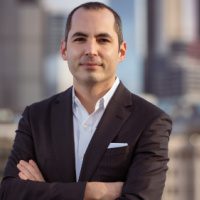
Ami Daniel is the CEO & co-founder of Windward, the leading Maritime AI company. He developed his passion for the sea during his seven-year veteran in the Israeli Navy and founded Windward with the mission of bringing Predictive Intelligence and big data analytics to the maritime ecosystem. In the last two decades, Ami has harnessed innovation and a relentless focus on driving transformative change to build successful organizations in both the nonprofit and private sectors. He holds a BA in Law & Business from Tel Aviv University, and won numerous accolades over the course of his career, including the Ilan Ramon Award for Excellence and the Israeli President’s Award for Social Good. Connect with Ami on LinkedIn.
